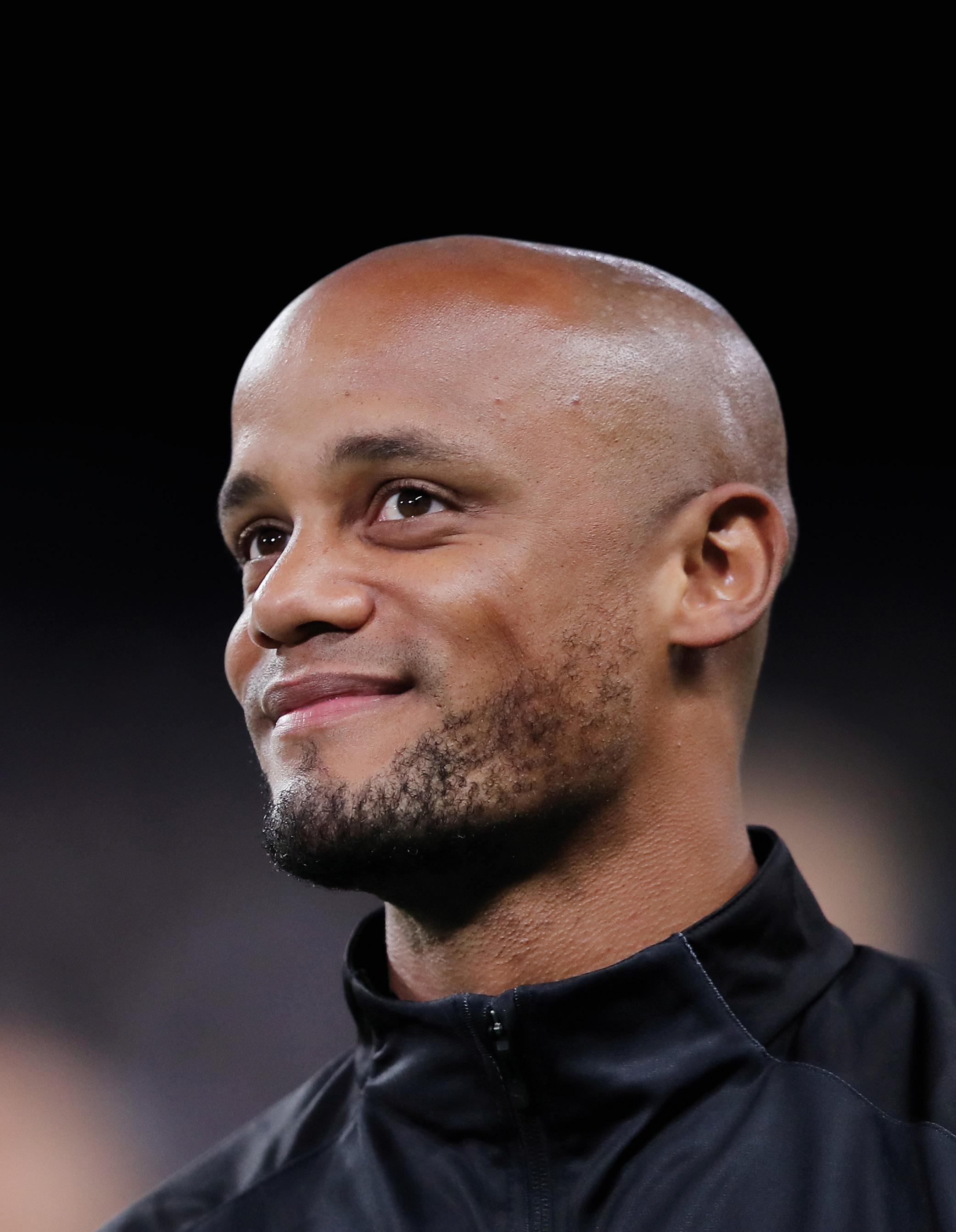
SUMMER 2023 | ISSUE 55
“I’m on the path to learning and developing.”
THE
QUARTERLY LEADERSHIP & PERFORMANCE JOURNAL OF THE LMA.




HISTORY, MADE TIMELESS ICONIC LONDON GLAMOUR OUTSIDE, CONTEMPORARY LUXURY INSIDE kimptonfitzroylondon.com | reservations@kimptonfitzroylondon.com
We were honoured to award Pep Guardiola with the Sir Alex Ferguson Trophy as the 2023 LMA Manager of the Year, as well as the Premier League Manager of the Year Award presented by Barclays, following Manchester City’s historic treblewinning season. I would also like to extend my congratulations to all our Sky Bet award winners, including Vincent Kompany, Steven Schumacher and Richie Wellens, alongside our Barclays Women’s Championship and Barclays WSL award winners, Lauren Smith and Emma Hayes OBE. Our inaugural LMA John Duncan Award was awarded to Lou Macari for his outstanding work helping the homeless population of Stoke-on-Trent since 2016.
The LMA is proud of its work with charitable organisations in and around the game. Recently, we were delighted to support LMA member Graeme Souness as he took on the challenge of
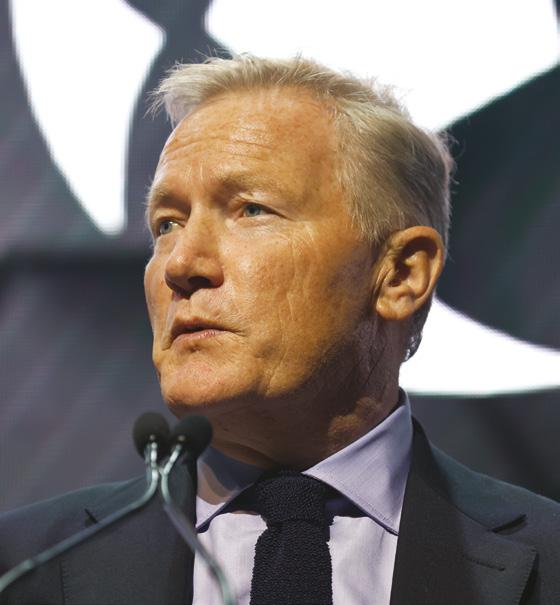 LMA Chief Executive
LMA Chief Executive
RICHARD BEVAN OBE.
swimming 21 miles across the English Channel. He succeeded in the feat, raising more than £1.3m for the charity, DEBRA. The LMA has continued its work supporting suicide prevention campaigns, with Sam Allardyce and Kolo Touré welcoming the Baton of Hope to Manchester on its nationwide journey to Downing Street.
The LMA also recently supported the Unified Football Team, representing Special Olympics Great Britain at the World Games in Berlin. The LMA assisted with the operational costs of the journey to Berlin and provided a unique training experience at St. George’s Park. LMA Ambassador Stuart Pearce MBE, Scotland manager Steve Clarke, LMA President and England manager Gareth Southgate OBE, and LMA Chairman Howard Wilkinson were all on site to meet with the players and support their training session.
As we head into the summer months, it’s time to reflect on the successes of those members graduating from the LMA Diploma in Football Management, which is now a well-respected qualification for those working in the game. I would also like to welcome our newest cohort for the Diploma and wish them the best of luck moving forwards.
Finally, it’s fantastic to see the ongoing development of the League Coaches Association (LCA) since its launch, six months ago. LCA membership is open to any coach in the men’s and women’s professional game, and provides essential services, including mental and physical wellbeing, personal and professional development, and legal support. I am delighted so far with the LCA’s growth and its delivery of these services to our members, as well as its engagement with professional coaches and clubs. Without doubt, a bright future lies ahead.
LMA CHIEF EXECUTIVE
Following the conclusion of a remarkable 2022/23 season, it was fantastic to be able to celebrate the achievements of our members at the LMA Annual Awards Dinner in May.
League Managers Association 3

THE TOUGHEST DECISION YOU’LL MAKE ALL SEASON All LMA members enjoy a preferential rate across our outstanding range. Visit your local Lexus centre to discover our exclusive LMA offering. Official fuel consumption figures for the Lexus Range of Hybrid, Plug-in Hybrid and Electric Vehicles in mpg ( l/100km ): 0 (0) - 314 ( 0.9 ). Combined CO2 ; 0 - 275 g/km*. Figures obtained using a combination of battery power and fuel. Figures are provided for comparative purposes; only compare fuel consumption, CO2 and/or electric range figures with other cars tested to the same technical procedures. These figures may not reflect real life driving results. All models and grades are certified according to the World Harmonised Light Vehicle Test Procedure ( WLTP ). All mpg and equivalent all-electric range figures quoted are WLTP figures.
Alice Hoey
FROM THE EDITOR.
It’s wonderful to be inspired by other people’s successes, to have something to emulate or aspire to. The recent LMA Annual Awards was just such an opportunity. However, often it’s the failures and mistakes that provide the choicest cuts in terms of learning. When leaders are frank and open in sharing those mistakes and the lessons they took from them, it’s invaluable. We can store their experiences along with our own in the hope of avoiding the same traps and blunders.
Take Sussex Cricket head coach Paul Farbrace. In his interview on page 50, he recounts how early on in his career he, “tried to change too many things, too quickly,” thinking he could sort out his first club as manager in a few weeks. “I was also far too emotional – too high when things went well and too low when they went badly,” he adds. He’s not rueing the mistakes he made in those formative years though; he believes they were crucial to his development, and undoubtedly they helped to mould him into the sought-after coach we know today.
In our interview on page 44,

meanwhile, Aston Villa Women manager Carla Ward explains how her mindset needed some recalibration when she made the difficult transition from player to coach. “I had to bring new players in and I looked, naturally I thought, to the ones I knew, people I’d played my entire career with. It was one of the key mistakes I made early on, because in my head I was still one of them.”
Of course, mistakes are only valuable if we act on them; otherwise they’re just lost opportunities. Learning from mistakes requires an active process of self-reflection,
something Lisa Fallon speaks about in depth in our feature on page 98. “I’m working with an incredibly diverse range of people daily, from coaches, players and analysts to hugely successful managers, learning from the challenges they have faced and the approaches they’ve taken,” she says. “Active self-reflection means I don’t lose any of that; everything is captured and, where possible, applied.”
In other words, if you want to improve, or help someone else to improve, stories of success and victory will get you only so far. It’s in the mistakes where the gold lies.

THE MANAGER League Managers Association 5
PROTECTING YOUR WORLD
Kerry London is proud to be the trusted insurance broker to the LMA. With over 35 years’ experience, and as a Lloyd’s of London accredited broker, Kerry London is well positioned to offer bespoke insurance advice for individuals and their families.
Invaluable Advice, Comprehensive Protection
At Kerry London, our home insurance experts will independently assess the right level of cover to meet your insurance needs. Our team are experts at insuring high value properties and the contents and belongings within them.

Kerry London is an independent insurance broker, which means that we work for you. The Kerry London team is on hand to answer any questions regarding your insurance needs.
Tel: 020 8225 1000
Email: lma@kerrylondon.co.uk
Web: www.kerrylondon.co.uk
In Partnership with KL0282-2210
Ltd is authorised and regulated by the Financial Conduct Authority, firm reference number 308255.
Kerry London
The League Managers Association, St. George’s Park, Newborough Road, Needwood, Burton upon Trent DE13 9PD
The views and opinions expressed by contributors are their own and not necessarily those of the League Managers Association, its members, officers or employees. Reproduction in whole or in part without written permission is strictly prohibited.

www.leaguemanagers.com
EDITOR
Alice Hoey
AliceHoey1@gmail.com
EDITOR FOR THE LMA
Sue McKellar
Sue.McKellar@leaguemanagers.com
ART DIRECTOR
Ian Cherry
Ian.Cherry@leaguemanagers.com
CONTRIBUTING EDITOR
Luke Johnson
Luke.Johnson@leaguemanagers.com
SENIOR WRITER
Mark Farthing
Mark.Farthing@leaguemanagers.com
PUBLISHER
Jim Souter
Jim.Souter@leaguemanagers.com
BUSINESS DEVELOPMENT
Adam Tarrant
Adam.Tarrant@leaguemanagers.com
DESIGN
Luna Studio
PHOTOGRAPHY
Reuters, Action Images, Alamy, iStock, Katz
Wizkas Photography, LOC, Annegret Hilse
PRINT PARTNER
Jellyfish Solutions Limited
League Managers Association
THE MANAGER 7
VINCENT
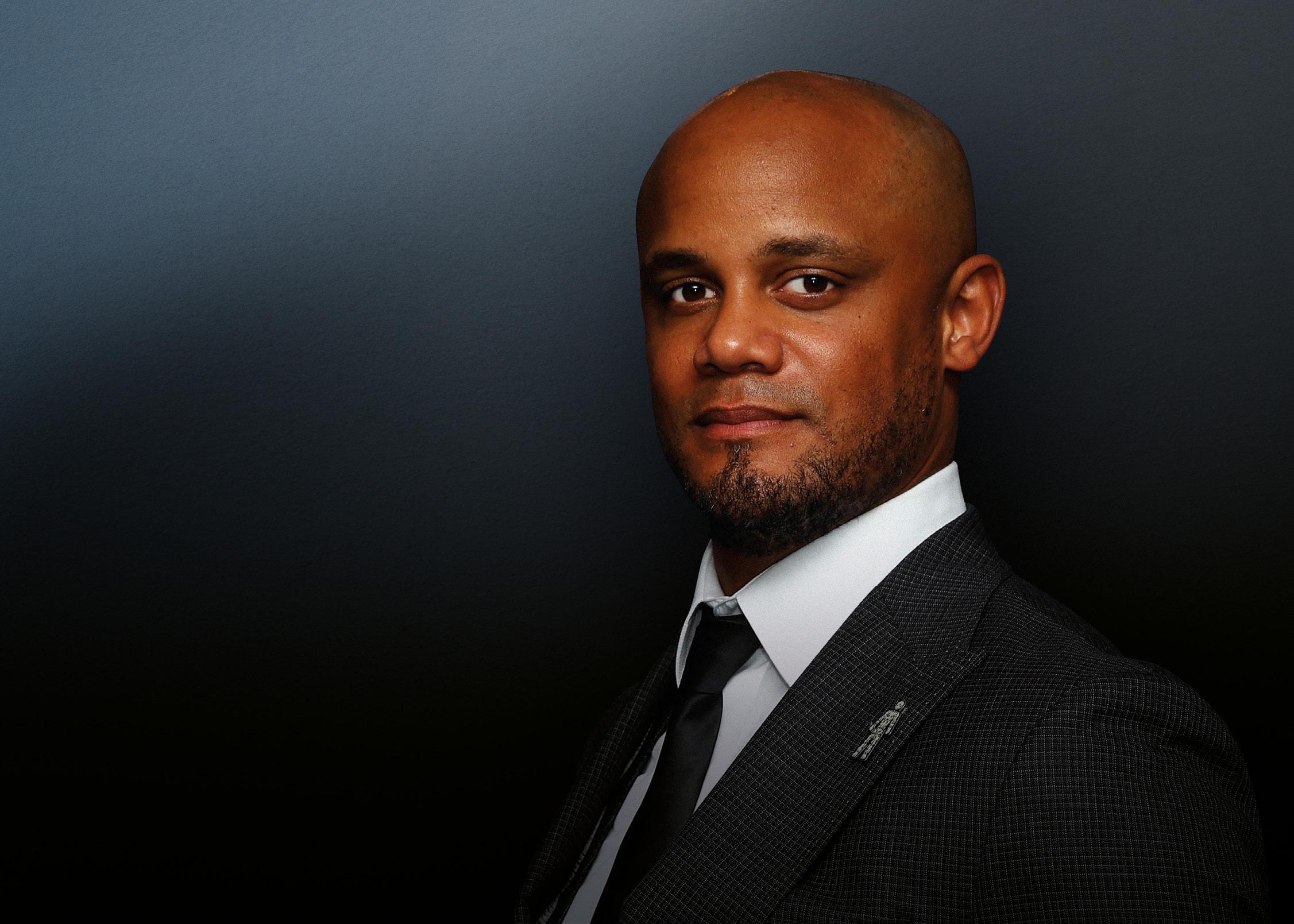
Column: Ash Farrington On the cover: Vincent Kompany Feature: No manager is an island Fighting spirit: Carla Ward From another sport: Paul Farbrace That’s the plan, now do it: Kevin Gaskell Key takeaways: I. Stephanie Boyce 26 30 38 44 50 56 62 THE LEADER. 25
Summer 2023 // Issue 55. The quarterly leadership and performance journal of the LMA.
KOMPANY.
30 LMA CEO: Richard Bevan OBE The Editor: Alice Hoey In Tribute: Craig Brown CBE In Tribute: John Hollins MBE LMA Annual Awards 2023 3 5 10 12 14 3 WELCOME. The Manager Journal 8
“I believe that if you show humility on the way up, the landing will be softer should you fall back down again.”
PERSONAL
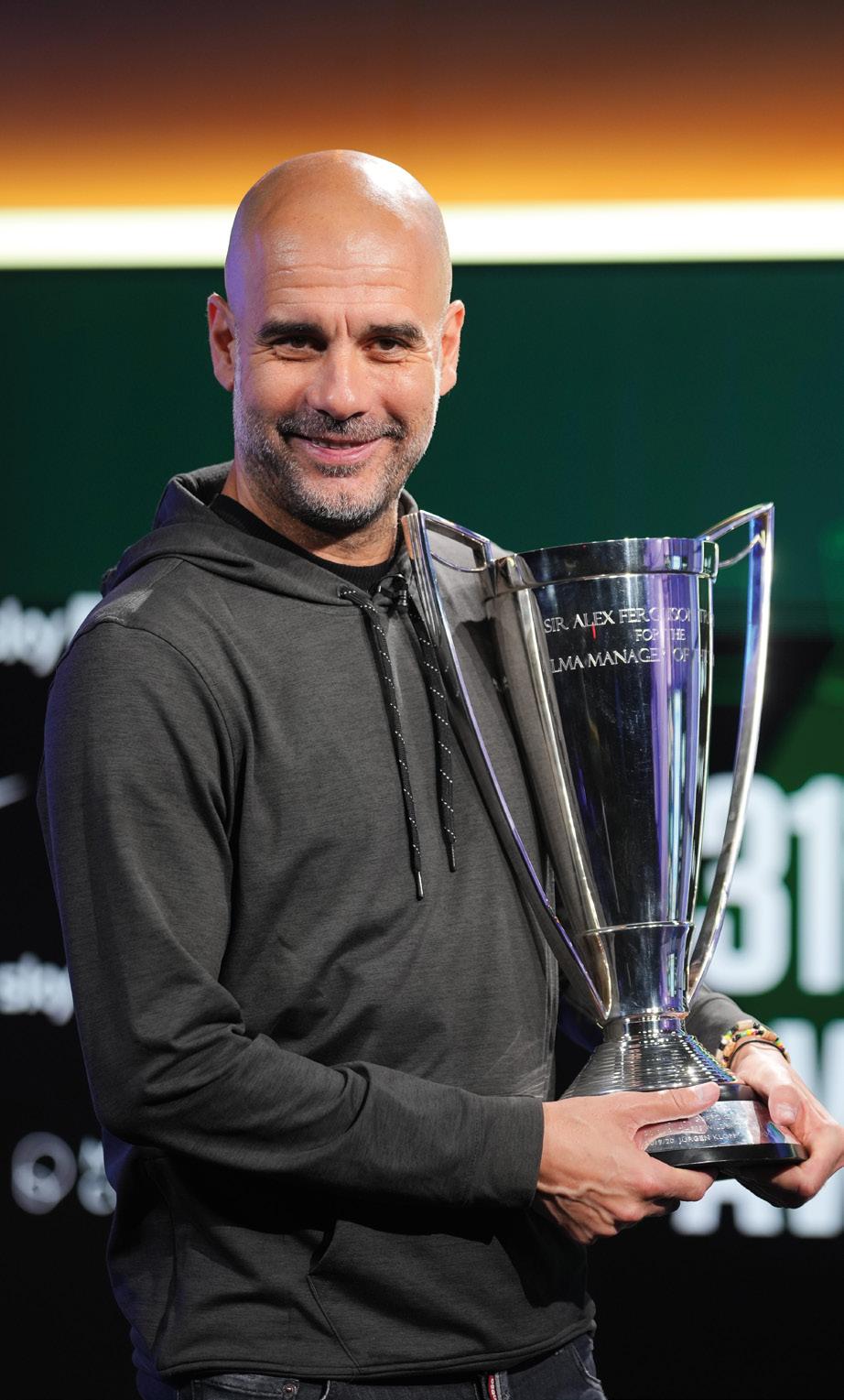

Routes: Supporting young players Premier League The FA Just a moment Special Olympics LMA Commercial activities LMA Institute activities LMA Technical: Zone7 Column: Oli Patrick How to: Do aerobic exercise Feature: Go with the flow 10 Ideas: Confidence Self-reflection: Lisa Fallon 106 110 112 114 68 70 76 78 84 88 90 94 98
105 67 83 LMA NEWS.
THE GAME.
THE MANAGER League Managers Association
PERFORMANCE & WELLBEING.
CARLA WARD.
44 14
LMA ANNUAL AWARDS 2023.
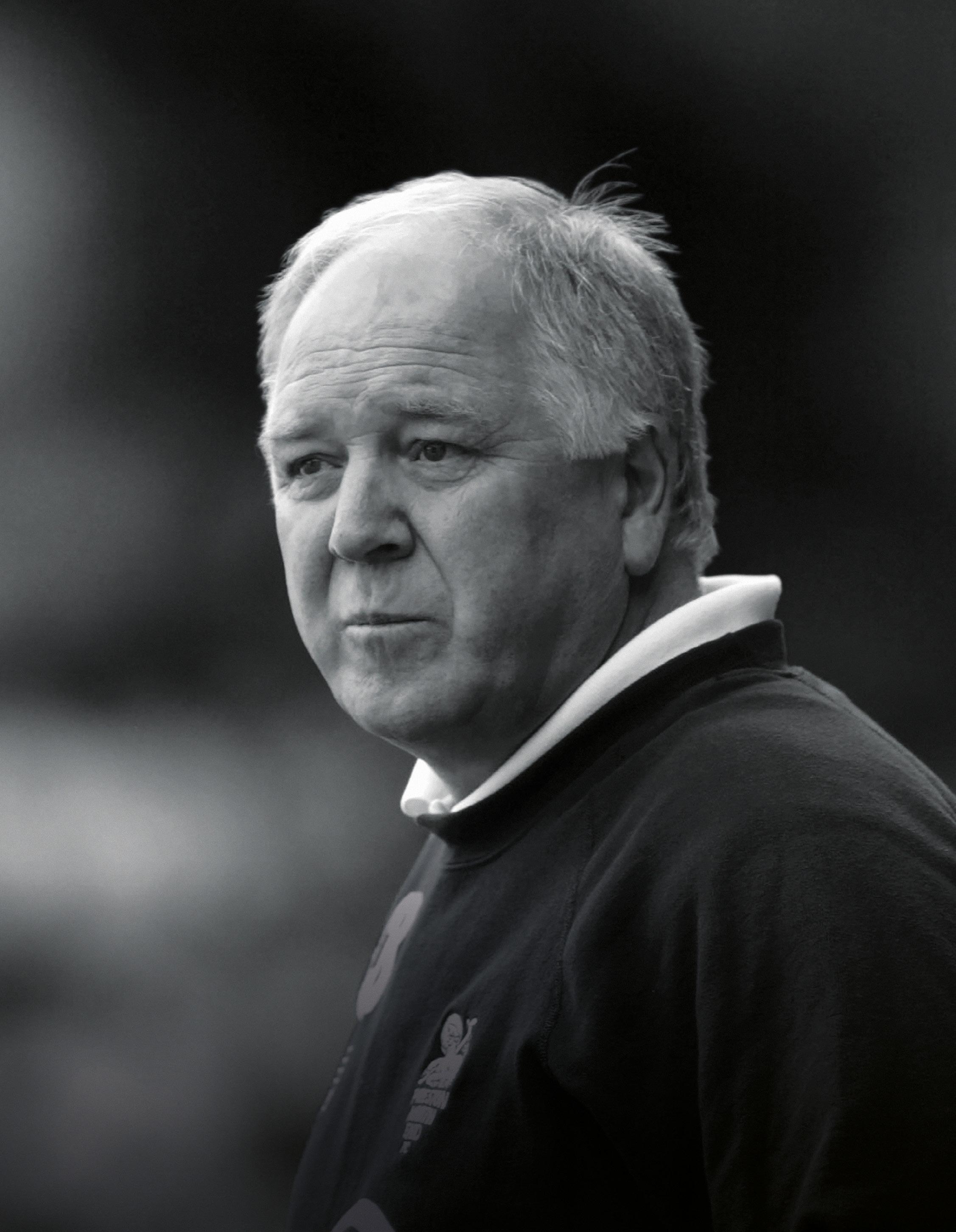
CRAIG BROWN CBE IN TRIBUTE 1940-2023 The Manager Journal 10 THE MANAGER
Photography: Reuters // Action Images
Everyone at the LMA was incredibly sad to hear of the passing of LMA member Craig Brown CBE, who died at the age of 82.
After a playing career cut short by injury, Craig discovered a passion for coaching and education. He started his management career in the Scottish Football League with Clyde, before joining the Scottish Football Association as a coach in 1986. Craig was appointed Scotland manager in 1993 and, to this day, holds the record as the longest-serving manager of the Scottish Men’s National Team, having led his countrymen for eight years. Craig joined the LMA in 2002, when he was appointed manager of Preston North End. Further managerial spells at Motherwell and Aberdeen followed, before Craig retired from management. He continued to work in football, however, fulfilling various strategic roles in Scotland and Europe.
Paying tribute to Craig, LMA Executive Board member
Sir Alex Ferguson CBE said:
“Craig Brown was a thoroughly wonderful man and my thoughts are with his family. Craig and I had been friends since the Scotland Schools Team in 1957/58, when Craig was captain. When I was given the honour of managing Scotland at the World Cup Finals in Mexico, there was one man I had to take, for all his attributes and knowledge, that was Craig. He had a great career as a manager of several clubs, but his service to his country stands out. In an industry that questions a man’s capabilities, Craig never wavered; he always kept his head and his composure. Well done Broon!”
LMA Chairman Howard Wilkinson said: “You couldn’t help but like Craig. He was great fun, he always had a story or comment to share, and his modesty and willingness to help
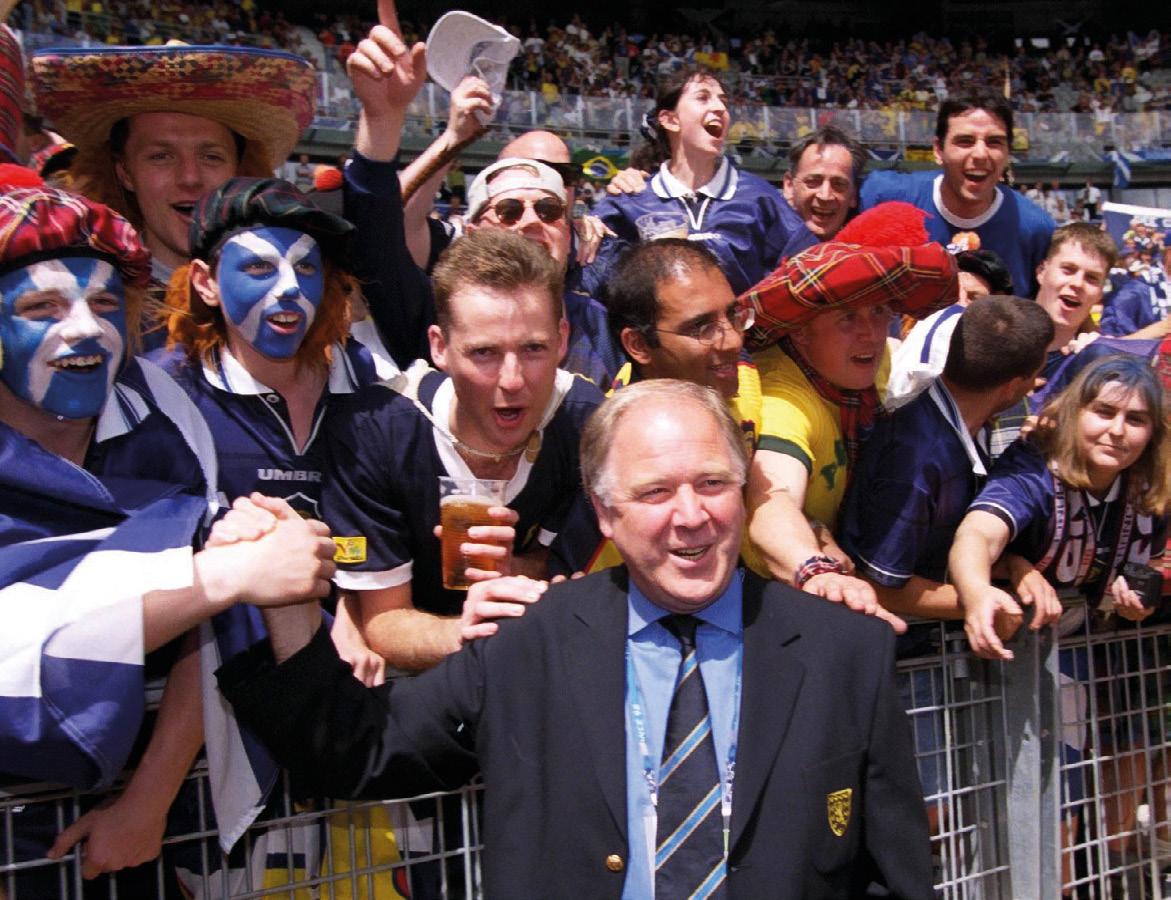
Craig Brown CBE was the longestserving Scotland manager. Reuters // Action Images when called upon made him such a good friend. As a professional, he was a great coach educator and a proper lover of football. He was very intelligent, like a football professor, but would never try to impress you with his knowledge of the game. He will be missed greatly and our thoughts are with his family and friends at this time.”
LMA Chief Executive Richard Bevan OBE added: “Craig was an immensely popular member of the LMA, who would often take the time to share his vast experience with his peers and go out of his way to show his support for the association. Despite retiring from management in 2013, he has continued to serve the game in Scotland and across Europe with his presence and insight. Craig was highly respected throughout Europe as a thoughtful manager, and in the latter part of his career acted as an advisor and trusted confidant to many people and organisations.”
League Managers Association 11
JOHN HOLLINS MBE IN TRIBUTE
 Photography: Reuters // Action Images
Photography: Reuters // Action Images
The Manager Journal 12 THE MANAGER
1946-2023
The LMA was deeply saddened by the passing of LMA member John Hollins MBE, who died at the age of 76.
John dedicated his career to the game, as a player, manager, coach and media analyst. He played at elite level for Chelsea, QPR and Arsenal, also earning an England cap. He managed Chelsea, Swansea City, Rochdale, Stockport Tiger Star, Crawley Town and Weymouth. John was awarded an MBE for Services to Football in 1982 and was a respected member of the LMA.
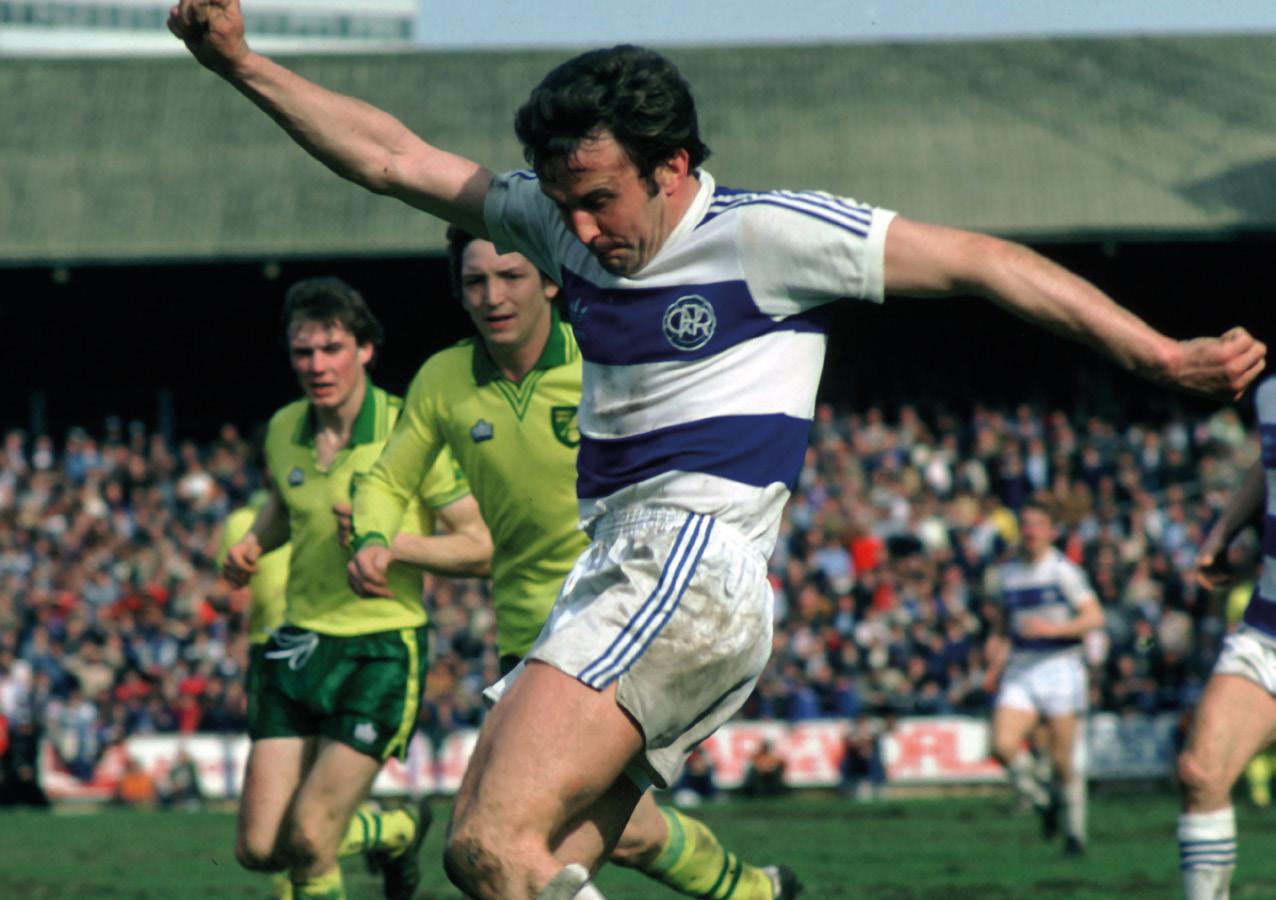
Paying tribute to John, LMA Chairman Howard Wilkinson said: “John was a hard-working, unassuming gentleman, on and off the pitch. His affinity with Chelsea Football Club was unquestionable and he was immensely proud to represent
his boyhood club, first as a player, and then as the manager.
“His passion for the game led him into coaching, where he went on to enjoy success and adventure. He enjoyed being a supportive influence on his peers throughout his career and imparted his vast knowledge of the game across his teams throughout the football pyramid.
“Our thoughts are with his family and friends at this time.”
LMA Chief Executive Richard Bevan OBE added: “John was a member of the LMA for 38 years and we will remember him as an absolute gentleman who always had a smile on his face and a willingness to support the association. John’s great humility belied his outstanding contribution to the game.”
1946-2023
League Managers Association 13
John Hollins MBE played for QPR during his professional career, and later acted as caretaker manager. Reuters // Action Images
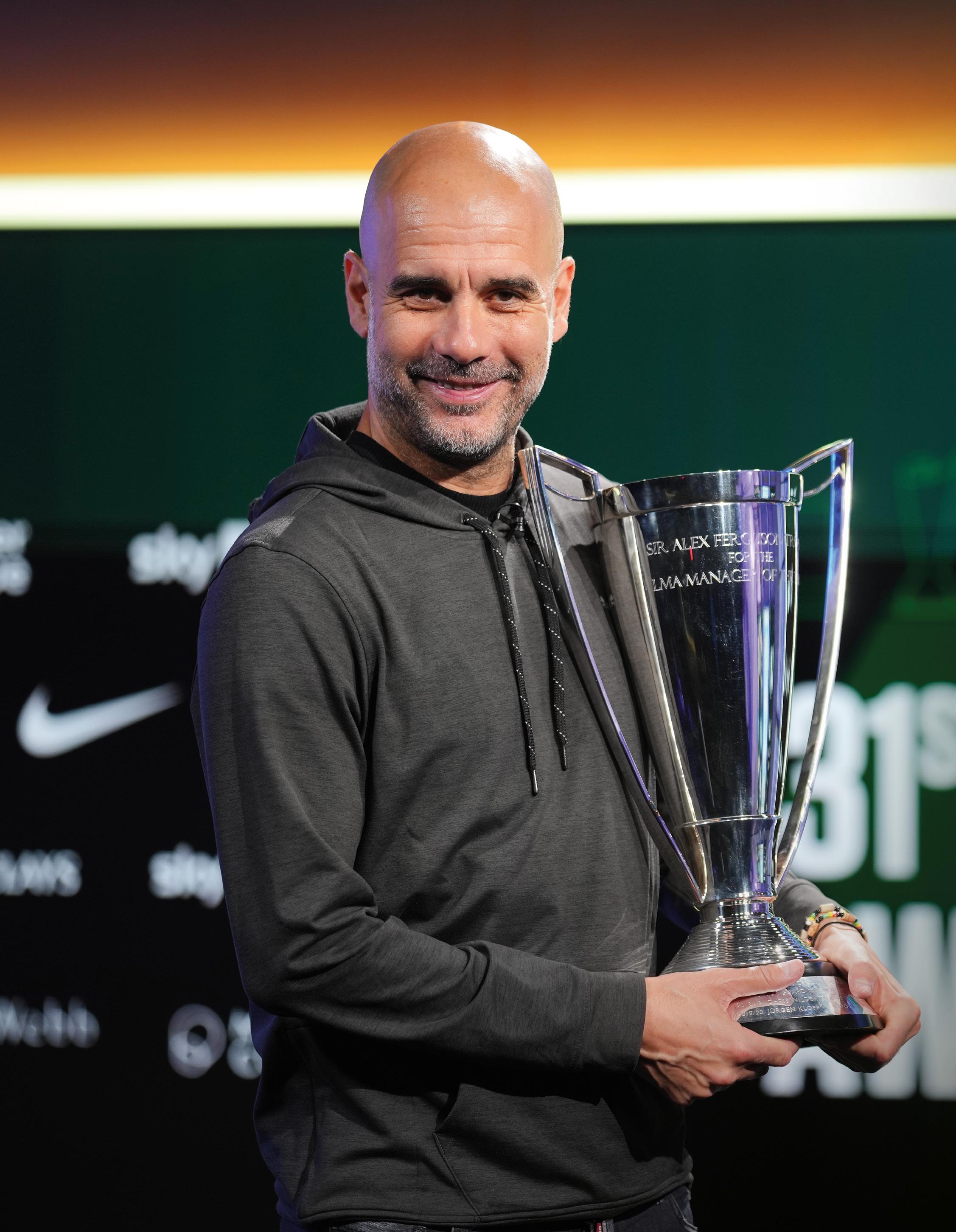 2022/23 LMA Manager of the Year
Pep Guardiola proudly receives the Sir Alex Ferguson Trophy. Reuters // Action Images
2022/23 LMA Manager of the Year
Pep Guardiola proudly receives the Sir Alex Ferguson Trophy. Reuters // Action Images
LEAD SPONSORS
EVENT PARTNERS
AWARD SPONSORS
OFFICIAL TROPHY SUPPLIER

League Managers Association 15 THE MANAGER
It was a privilege to award the inaugural LMA John Duncan award to LMA member Lou Macari, whose incredible work through the Macari Foundation is continuing to help end homelessness in Stoke-on-Trent.
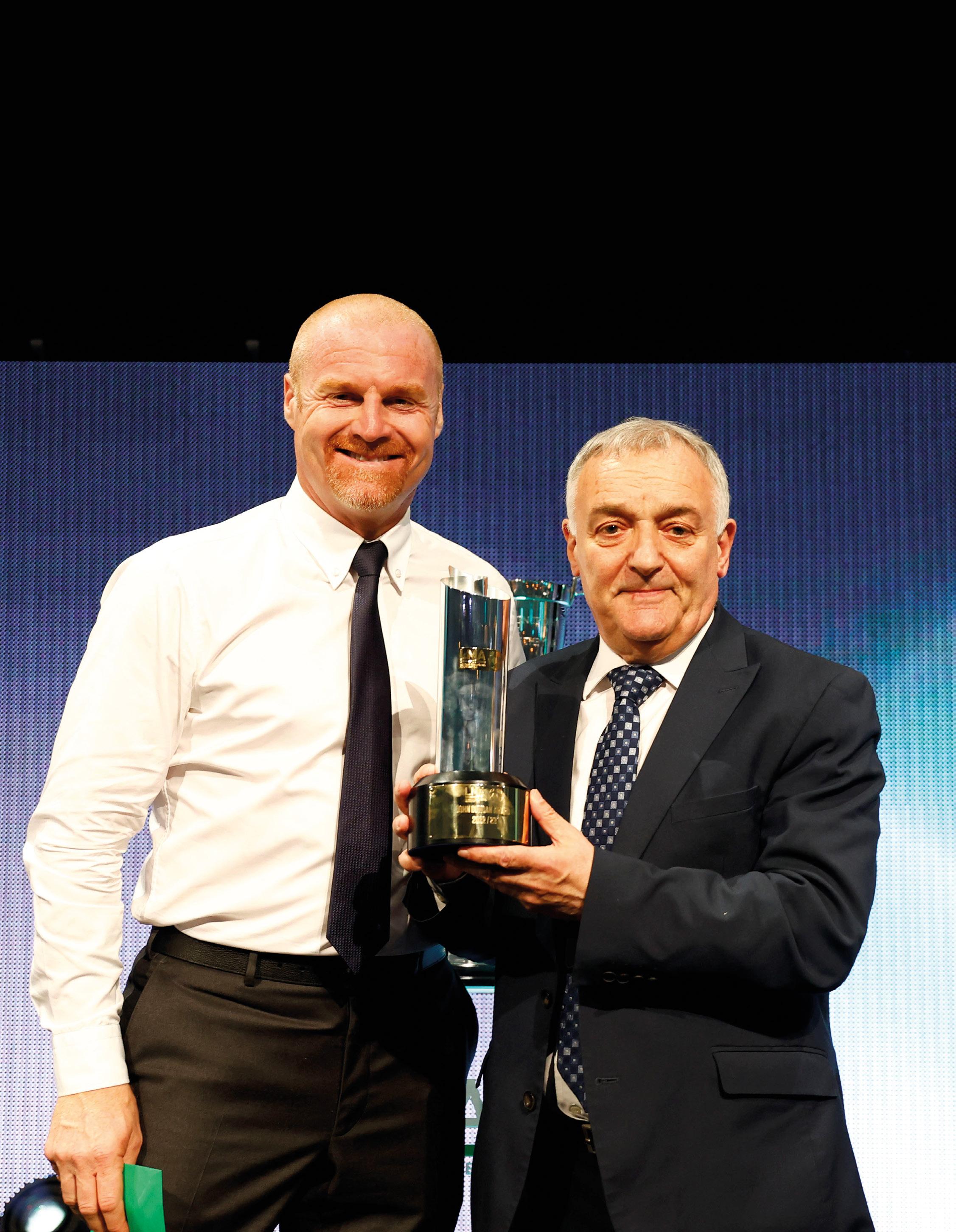
16 The Manager Journal THE MANAGER
Manchester City’s Pep Guardiola was awarded the Sir Alex Ferguson Trophy for the LMA Manager of the Year at the 31st LMA Annual Awards Dinner.
The award, voted for by the full LMA membership, was announced at the dinner, held at London’s JW Marriot Grosvenor House hotel. The award was presented by LMA President Gareth Southgate OBE and LMA Executive Committee member Sir Alex Ferguson CBE. The five other managers who received the most votes to be in contention for this award were, in alphabetical order, Mikel Arteta (Arsenal), Roberto De Zerbi (Brighton & Hove Albion), Eddie Howe (Newcastle United), Vincent Kompany (Burnley), and Steven Schumacher (Plymouth Argyle).
Recently promoted managers Vincent Kompany (Burnley –Sky Bet Championship), Steven Schumacher (Plymouth Argyle – Sky Bet League One), Richie Wellens (Leyton Orient – Sky Bet League Two) and Lauren Smith (Bristol City – Barclays Women’s Championship) were also voted for by their peers as Manager of the Year in their respective leagues.
Guardiola also won the Premier League Manager of the Year, sponsored by Barclays, following a panel and public vote.
Emma Hayes OBE (Chelsea) won the Barclays Women’s Super League Manager of the Year, following a voting process involving WSL Managers, an esteemed Barclays panel of respected individuals within women’s football and a public vote.
Lou Macari was presented with the inaugural LMA John Duncan Award, named after John, who sadly left us in October last year. The John Duncan Award will be presented each year to an individual, selected by the LMA board, who has either achieved something significant in the game or represents the values of passion and service to football that personified John himself.
On being presented with the Sir Alex Ferguson Trophy for the LMA Manager of the Year, Pep Guardiola said, “It’s such an honour and one that I share with my players, my coaches and everyone at Manchester City. It’s a really special award for me, because it is voted for by LMA managers who understand from their experiences what our job involves.”
LMA Chairman Howard Wilkinson said of Guardiola: “To have competed throughout this unprecedented season to win the Premier League title and to have won a historic treble demonstrates his ability
to galvanise his entire squad. I know his leadership qualities and football philosophy permeates throughout the club from the first-team to the academy.”
LMA Executive Committee member Sir Alex Ferguson CBE said: “It takes a huge amount of energy and intensity to win year after year, ensuring your players and staff maintain their exceptionally high standards. What Pep has done over the past seven years has been remarkable and he rightly deserves the praise of his fellow managers this evening.”
As well as paying tribute to Guardiola, LMA Chief Executive Richard Bevan OBE said: “Our members also recognised the achievements of Emma Hayes OBE, Lauren Smith, Vincent Kompany, Steven Schumacher and Richie Wellens, who all successfully led their teams to league titles and contributed to an extremely entertaining season for us all to follow.
“It was a privilege to award the inaugural LMA John Duncan award to LMA member Lou Macari, whose incredible work through the Macari Foundation is continuing to help end homelessness in Stoke-on-Trent. He has positively impacted the lives of so many people and is a very worthy winner, of whom John would have been especially proud.”
League Managers Association 17 LMA ANNUAL AWARDS DINNER
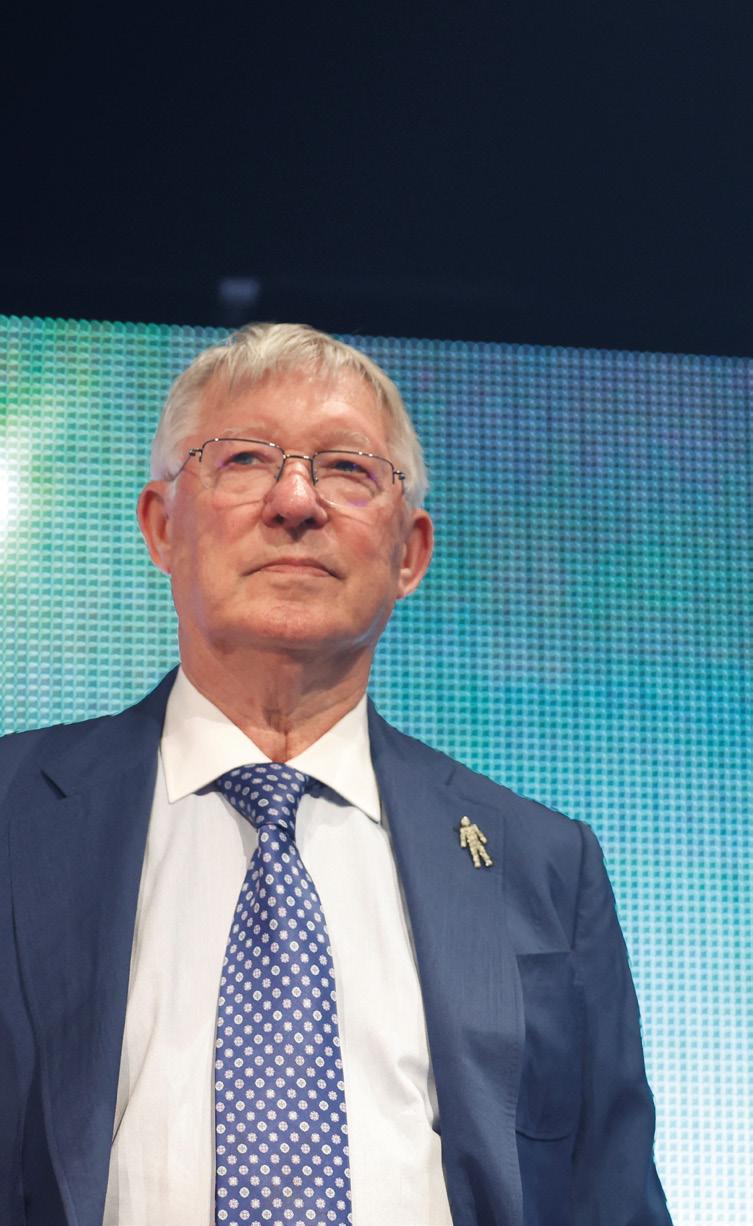
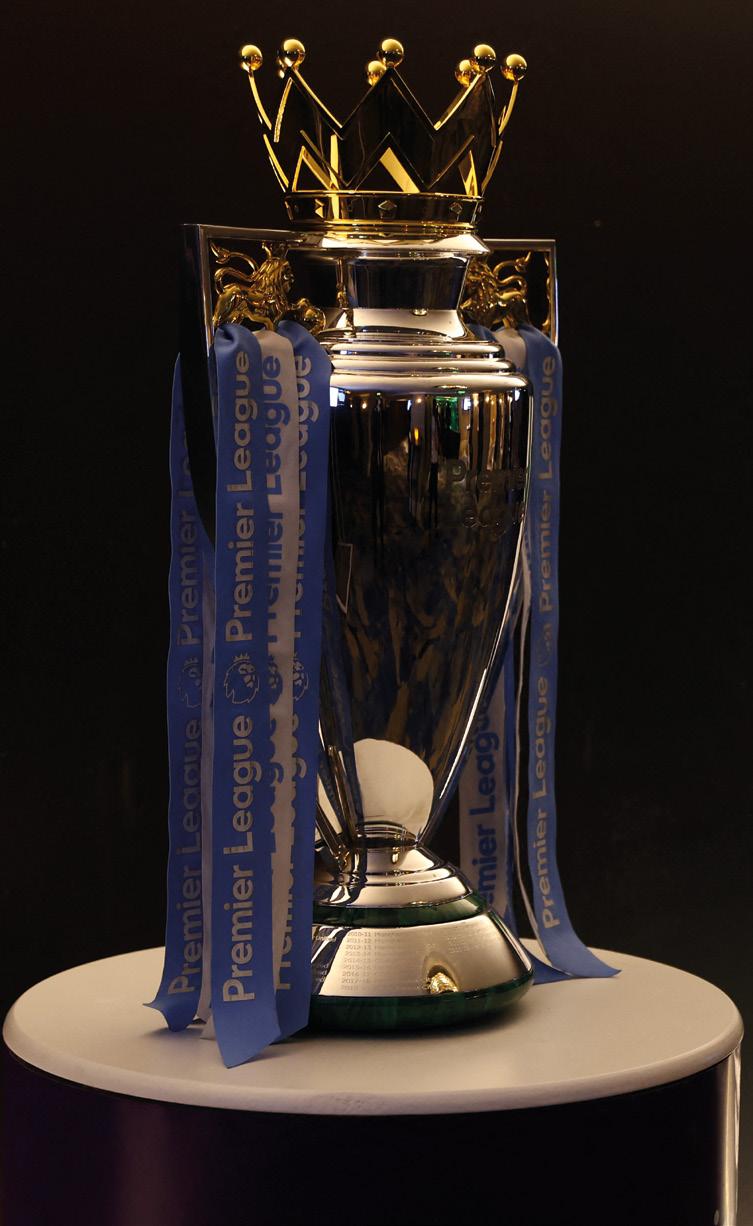
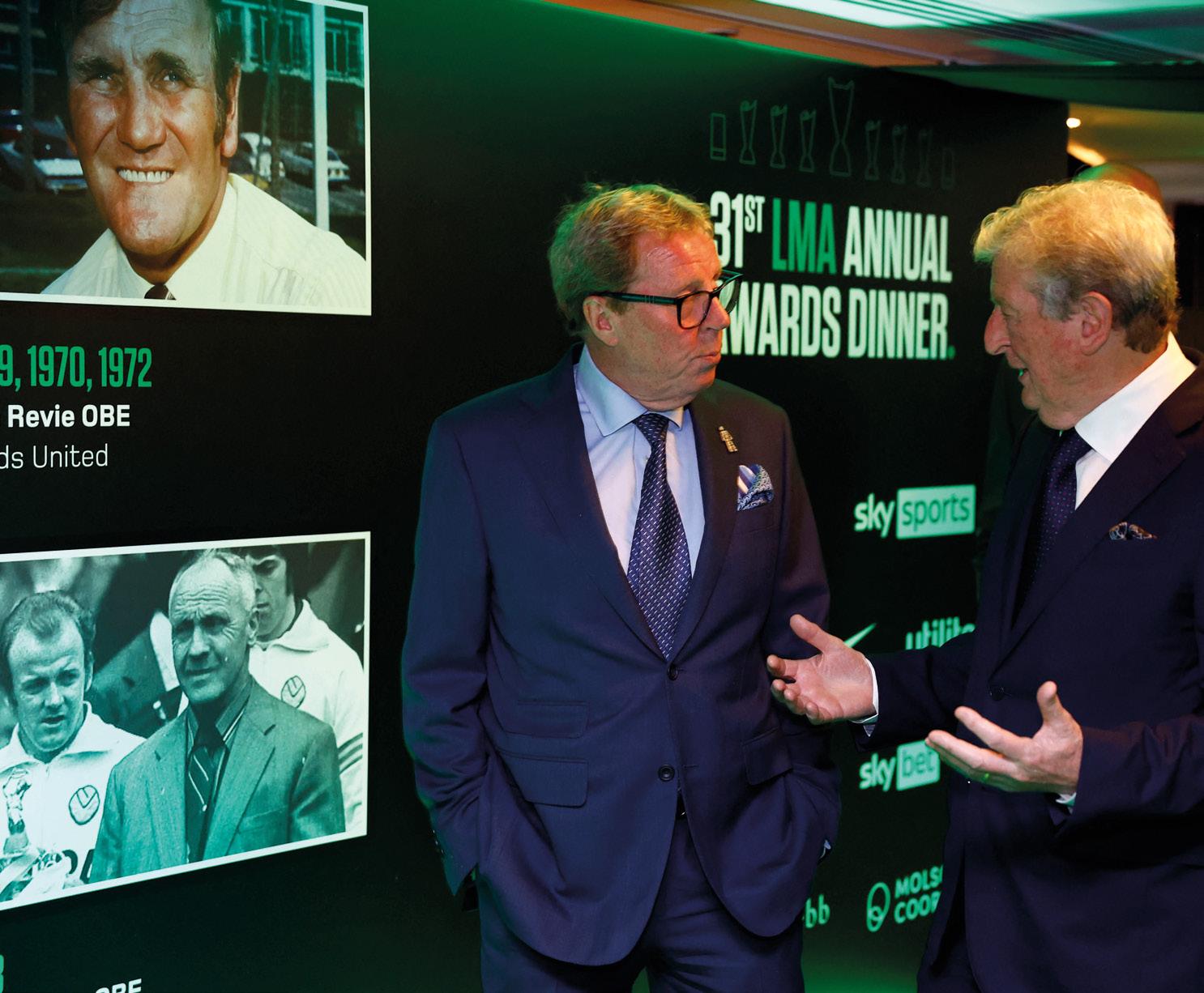
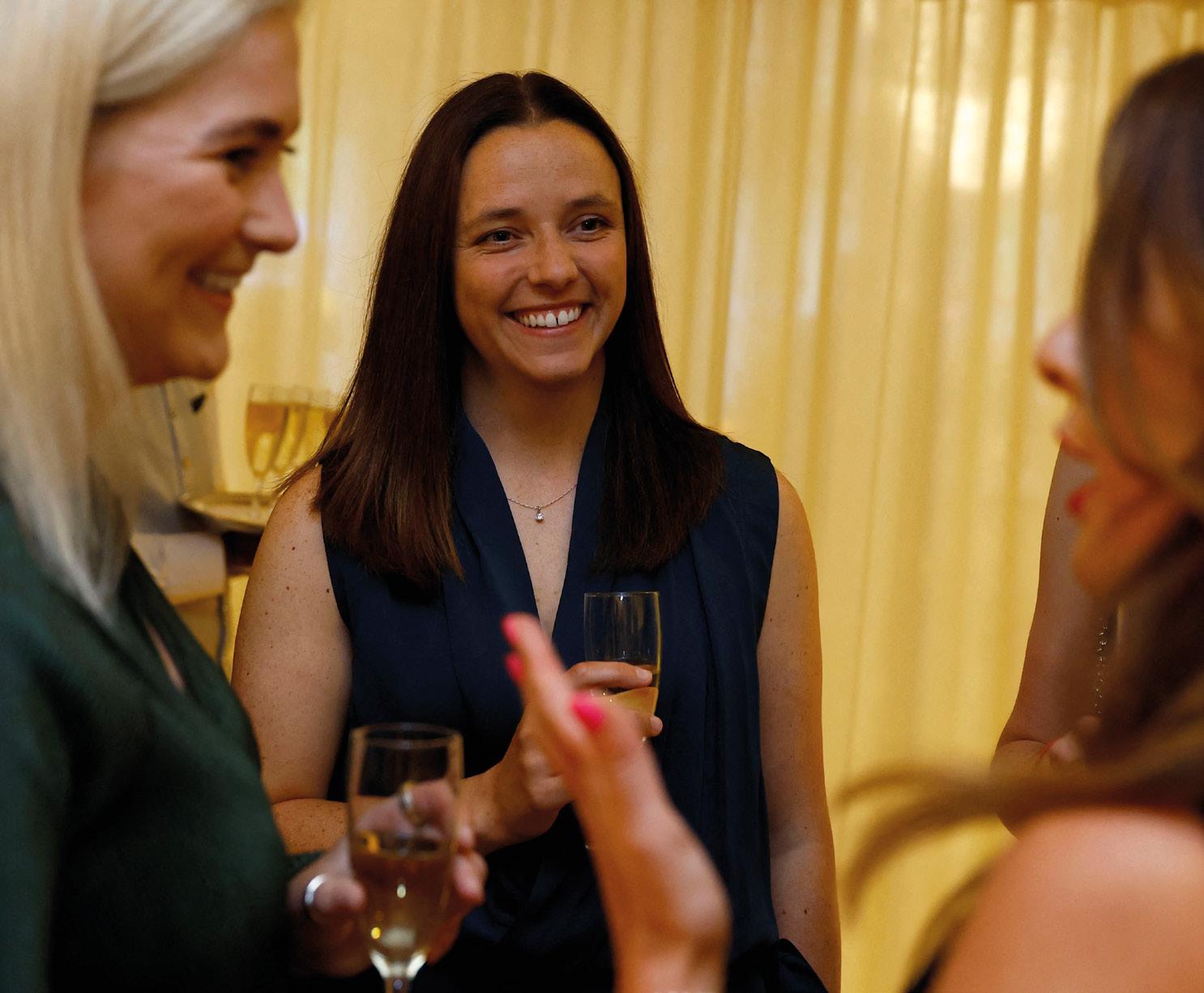
18 The Manager Journal THE MANAGER
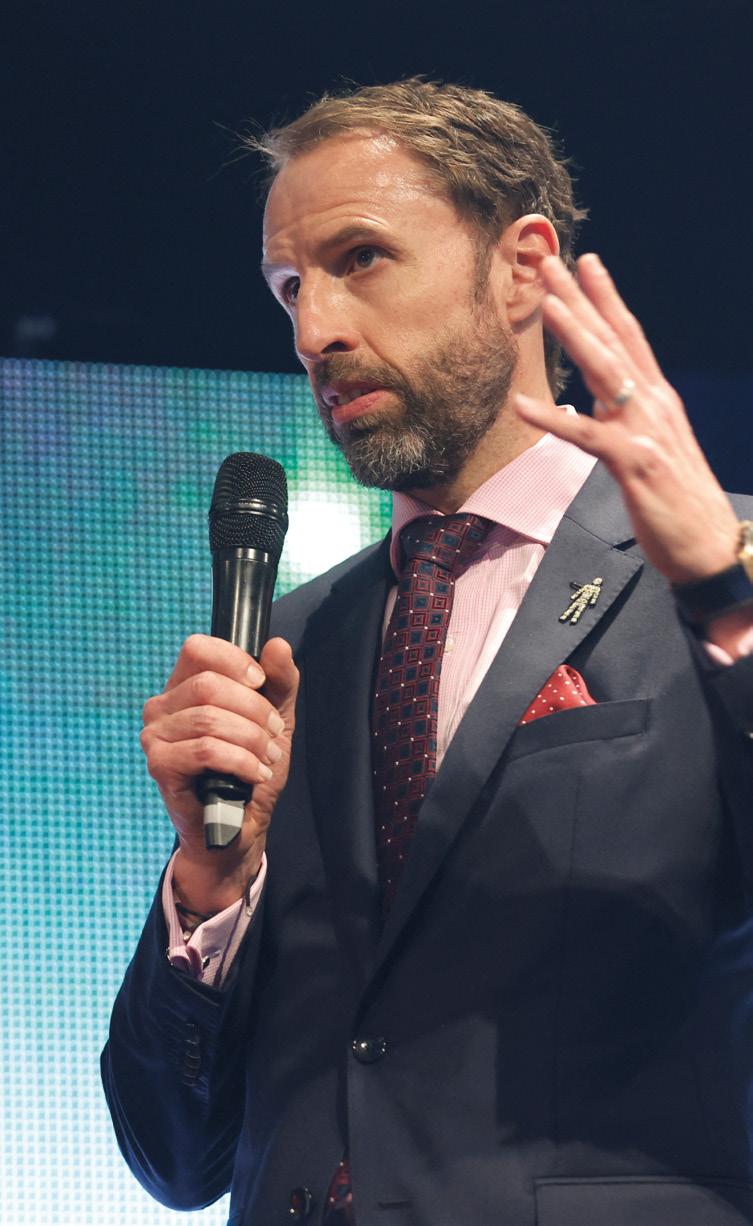
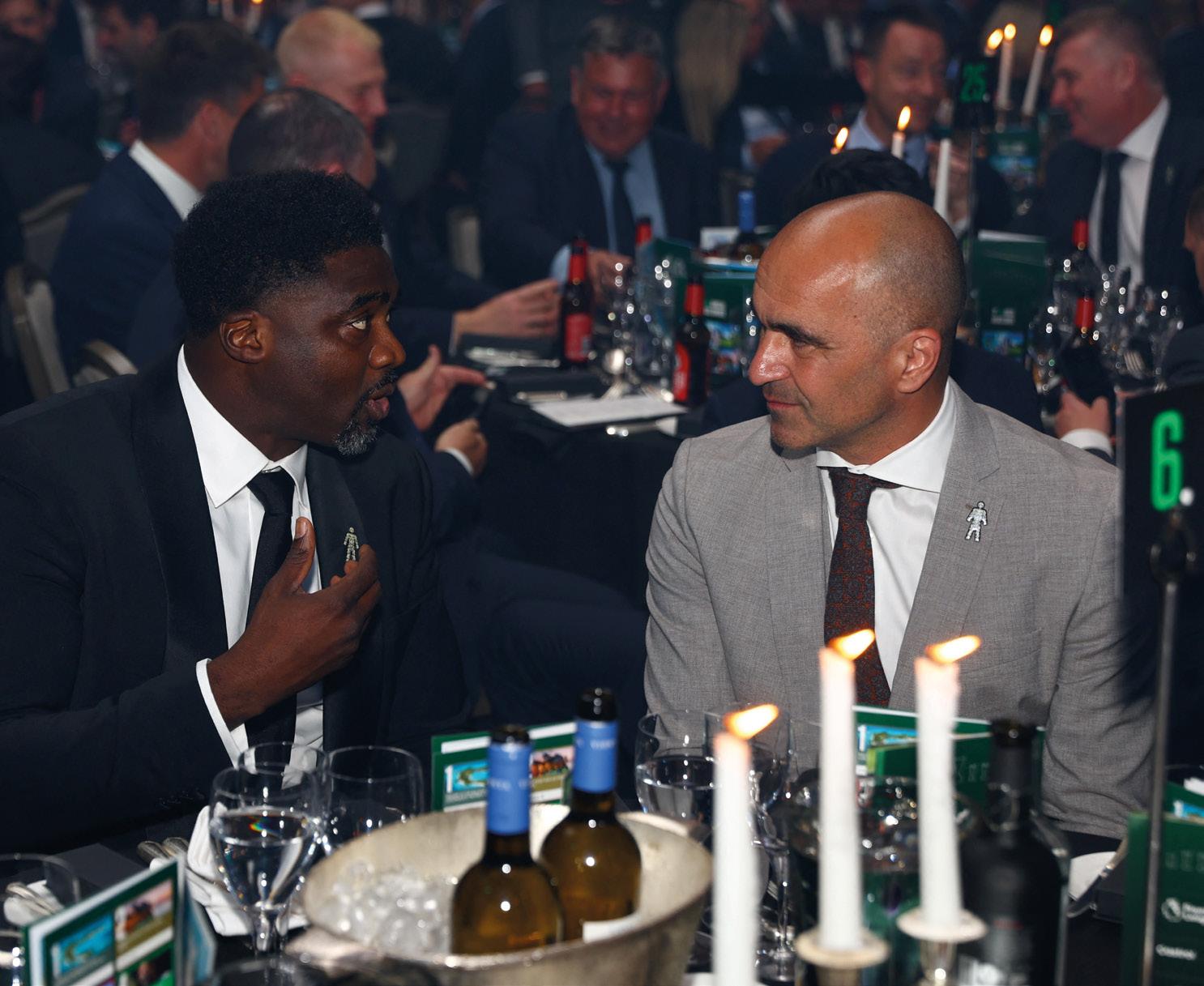

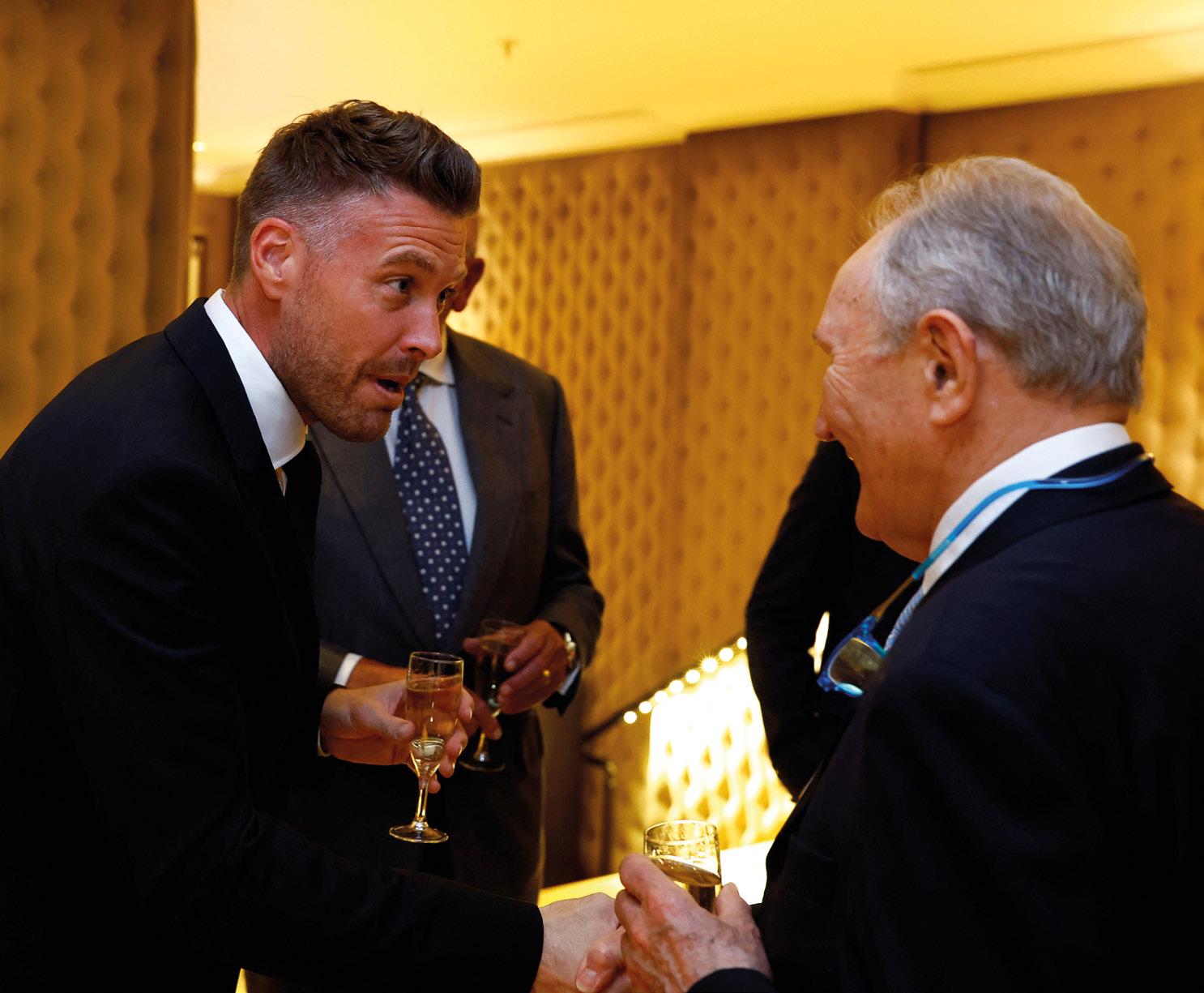
League Managers Association 19 LMA ANNUAL AWARDS DINNER



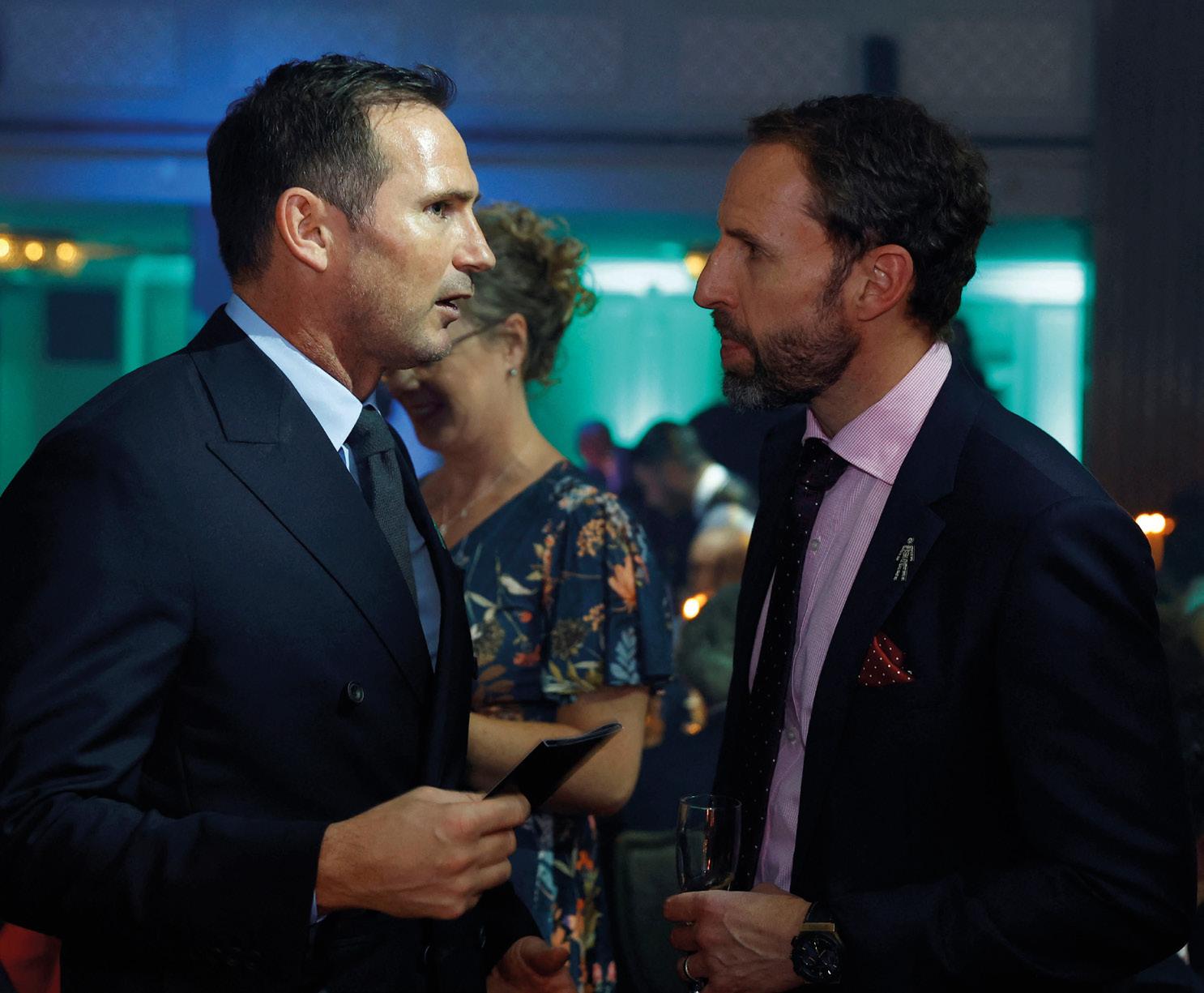
20 The Manager Journal THE MANAGER


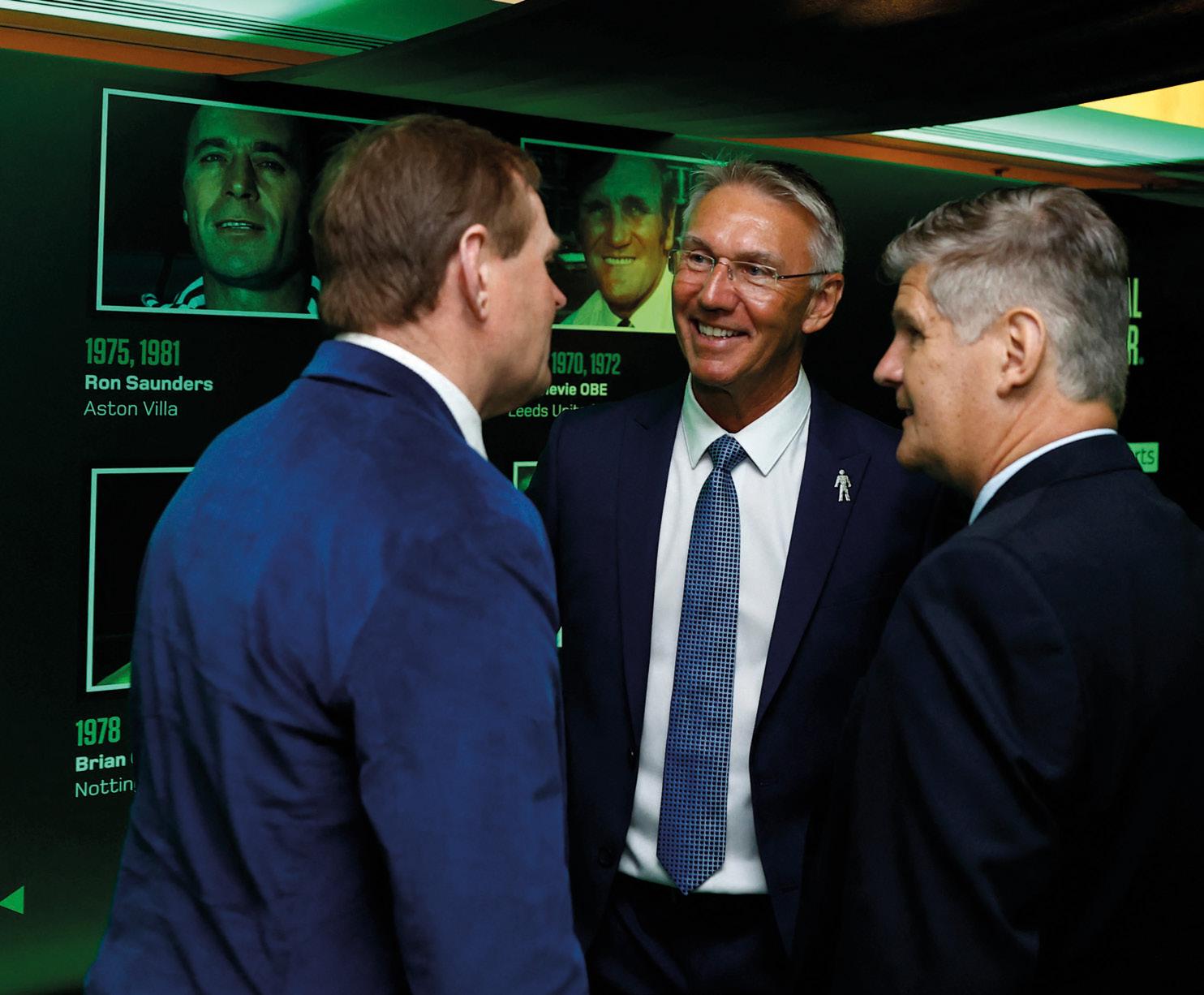
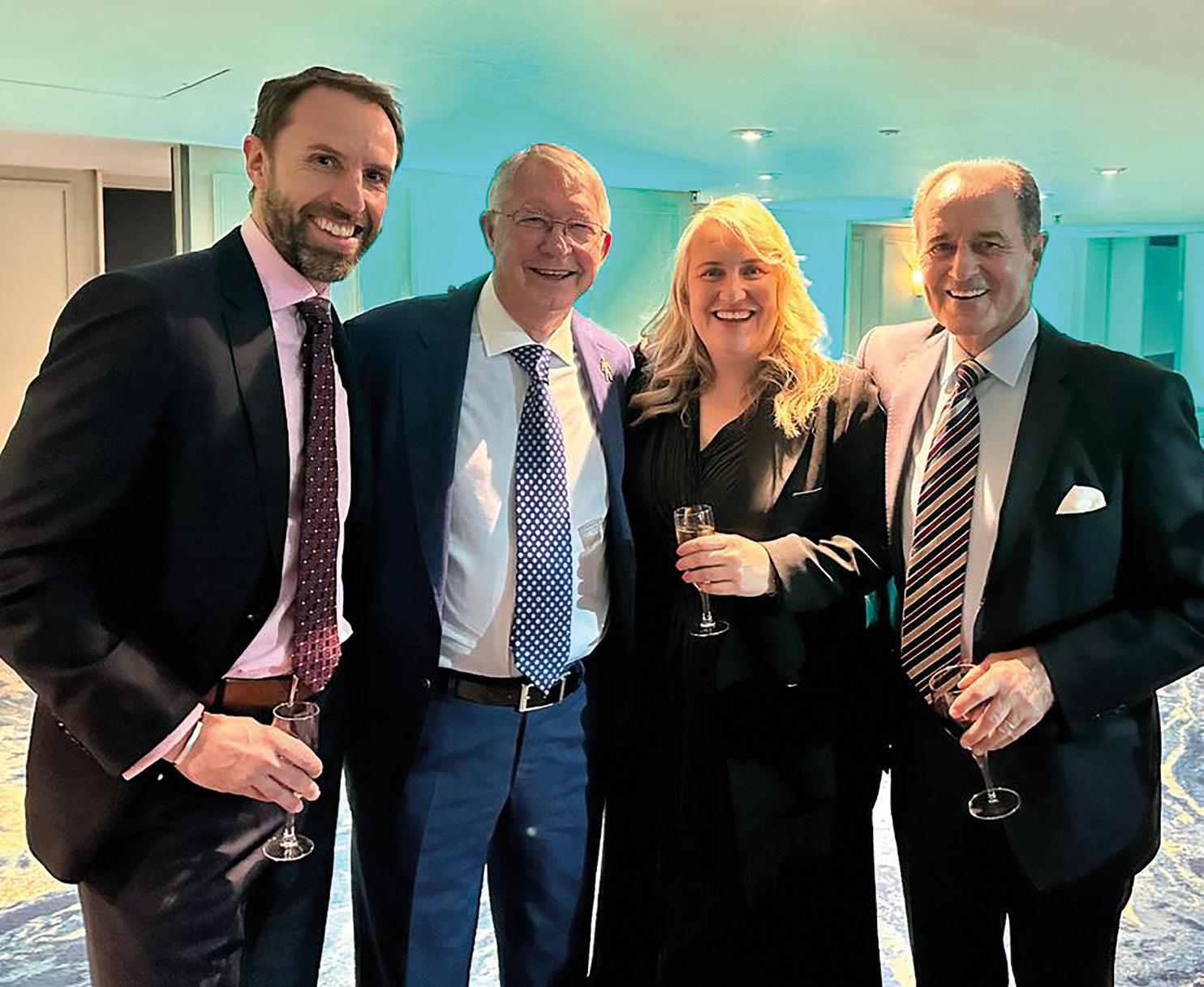
League Managers Association 21 LMA ANNUAL AWARDS DINNER
2022/23 AWARD WINNERS
THE SIR ALEX FERGUSON TROPHY FOR THE LMA MANAGER OF THE YEAR
PEP GUARDIOLA
PREMIER LEAGUE MANAGER OF THE YEAR
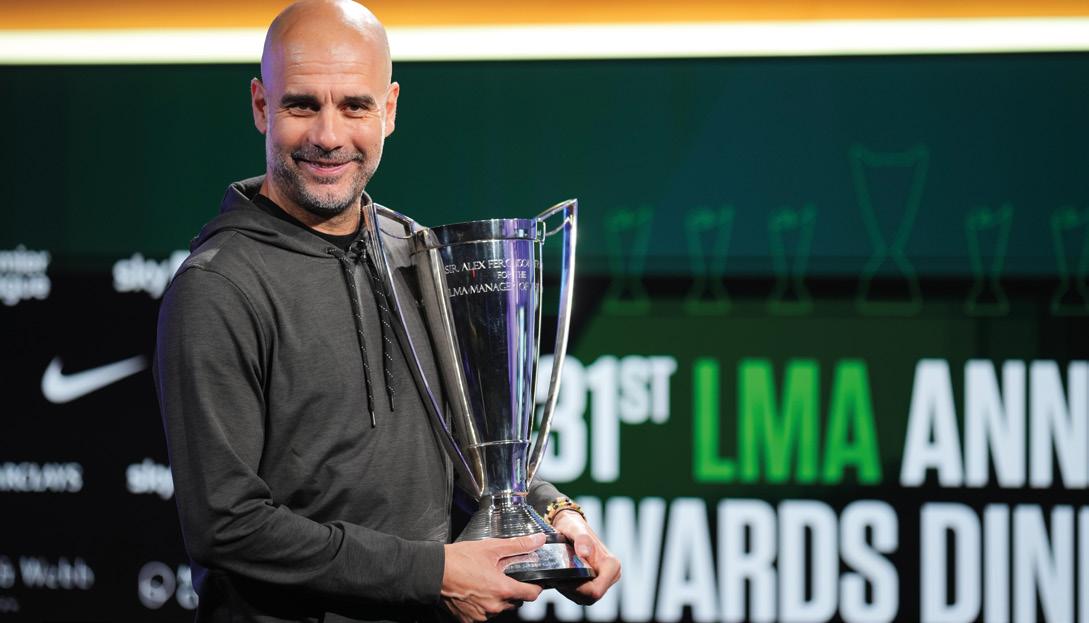
PEP GUARDIOLA
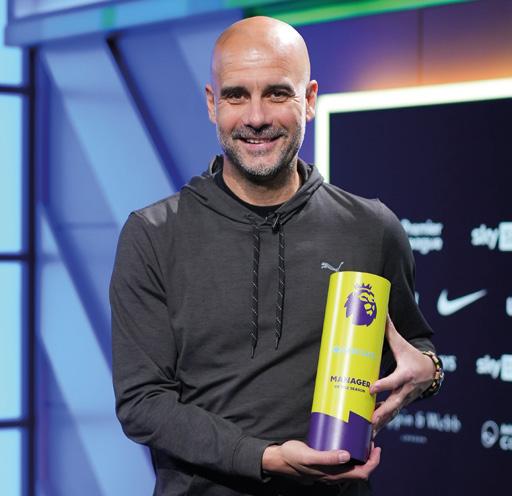
BARCLAYS WOMEN’S SUPER LEAGUE MANAGER OF THE YEAR
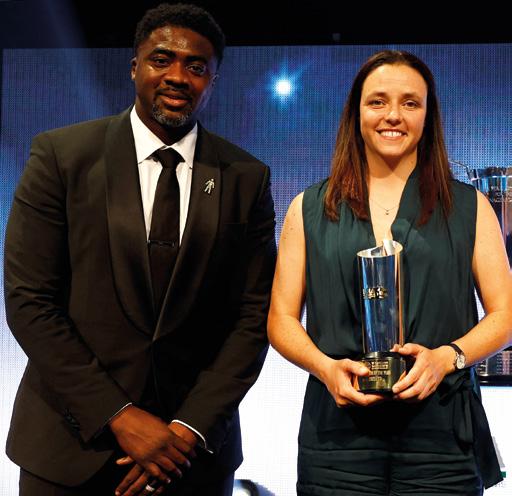
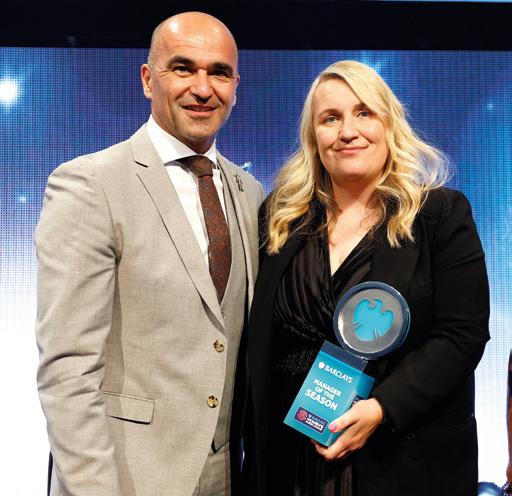
EMMA HAYES OBE
BARCLAYS WOMEN’S CHAMPIONSHIP MANAGER OF THE YEAR
LAUREN SMITH
22 The Manager Journal THE MANAGER
SKY BET CHAMPIONSHIP MANAGER OF THE YEAR
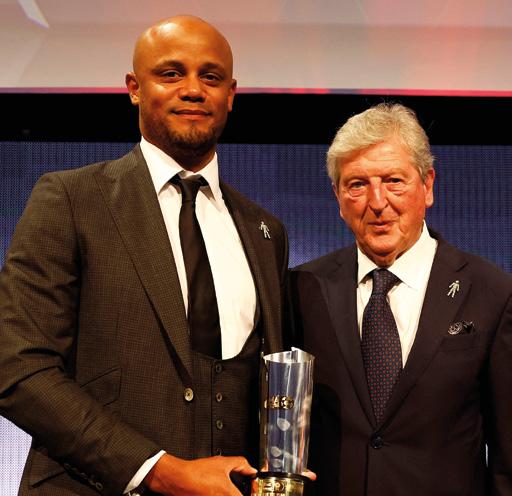
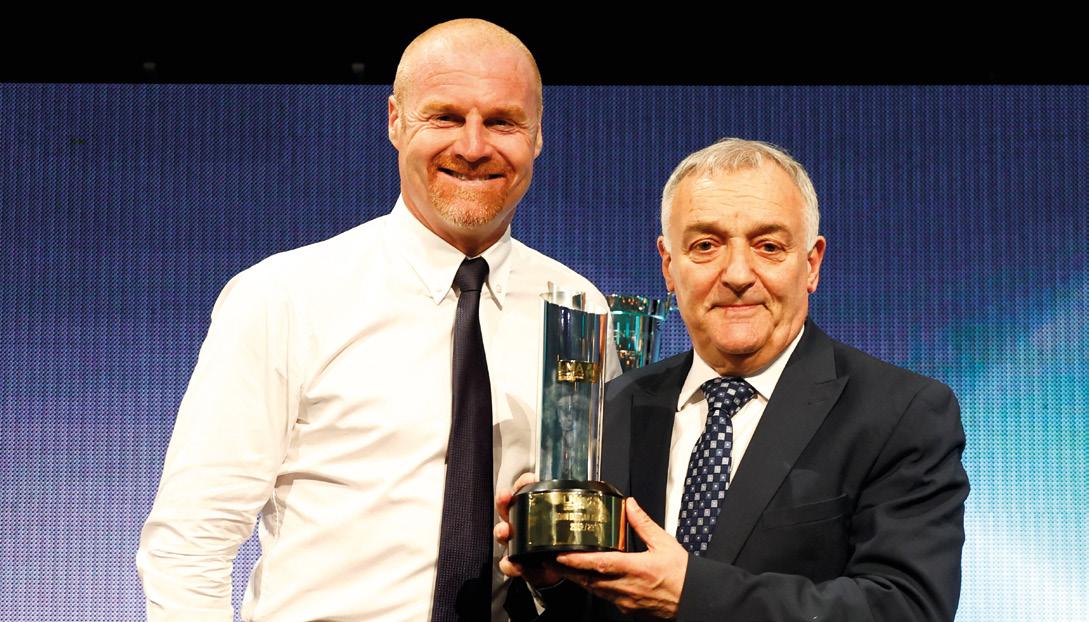
VINCENT KOMPANY
SKY BET LEAGUE ONE MANAGER OF THE YEAR
STEVEN SCHUMACHER
MACARI
SKY BET LEAGUE TWO MANAGER OF THE YEAR
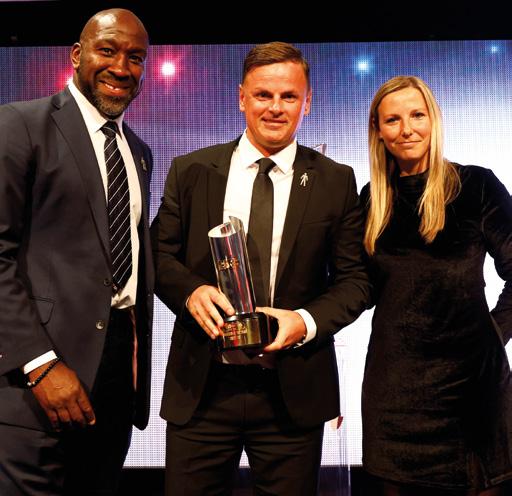
RICHIE WELLENS
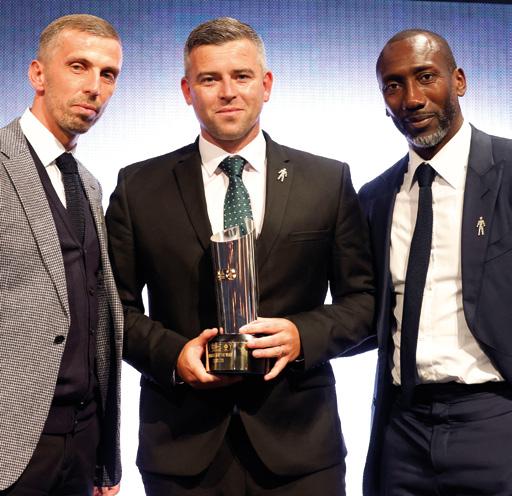 LMA JOHN DUNCAN AWARD LOU
LMA JOHN DUNCAN AWARD LOU
League Managers Association 23 LMA ANNUAL AWARDS DINNER
the video > THE MANAGER
Watch
ANNUAL AWARDS DINNER

thestaffordlondon.com 16-18 St James’s Place, London, SW1A 1NJ +44(0)20 7493 0111 | reservations@thestaffordlondon.com UNRIVALLED LUXURY, EXCLUSIVE ST JAMES’S ADDRESS
THE LEADER.
League Managers Association 25 THE MANAGER
LEADER COLUMN
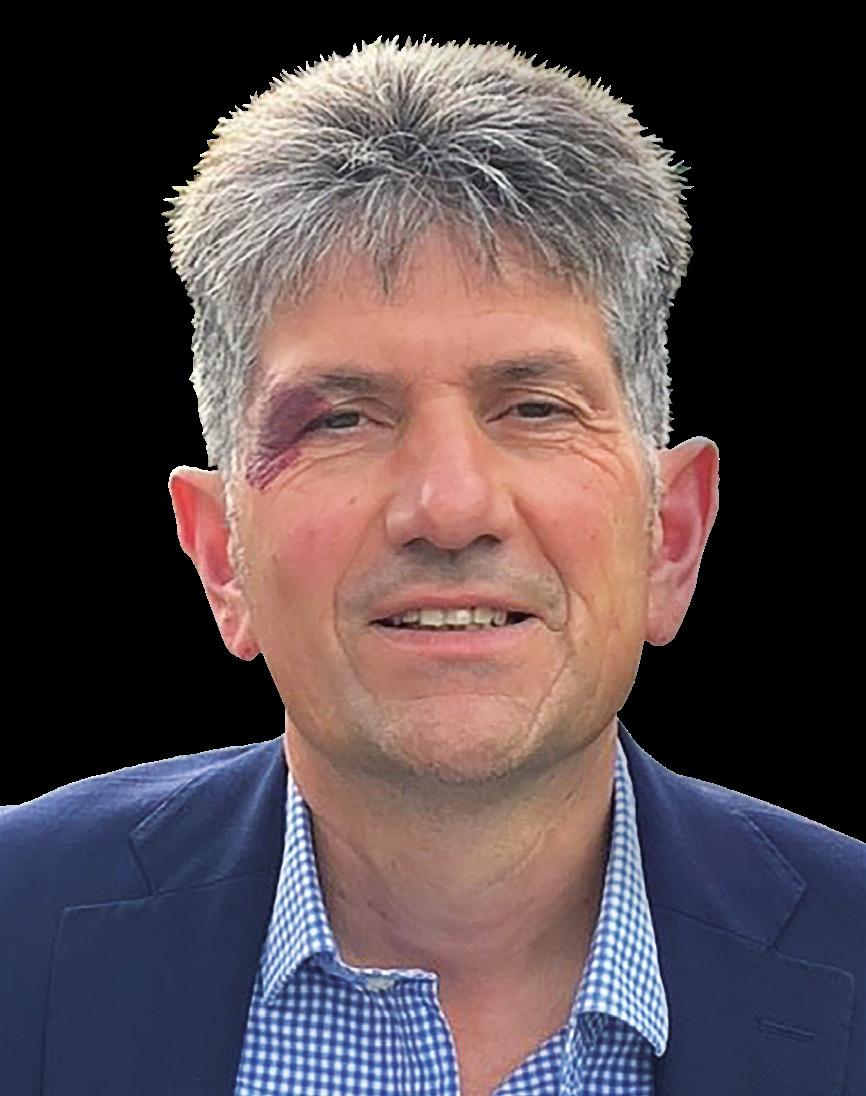 Ash Farrington
Ash Farrington
LEAD WITH HUMILITY AND KINDNESS.
A stressful, high-pressure environment requires a kind, humble leader. Show humility, walk with your people, find out what their names are and who they are as individuals.
The Manager Journal 26 THE MANAGER
Over my 30 years with the police force, rising to Detective Chief Inspector and working as both a homicide SIO and hostage negotiator, my success has depended entirely on the people around me, their knowledge, teamwork and ability to think quickly.
To give an example, as a hostage negotiator I would get a call in the middle of the night to say there had been a suspicious death. It was my job to establish whether we had a murder case on our hands, whether there was just one victim and whether the public might be at risk. Each time, my stomach would do somersaults. It was what we called the ‘golden hour’, when we had to collate many different elements and pieces of information under extreme pressure, because lives might well be at stake.
Key to my success was pulling a team together. Sometimes that meant working with people I knew, and this made it easier,
because the relationships and connections between us already existed. With a team of people who I didn’t know, those connections had to be built incredibly quickly. I did that by listening, not only to what they were telling me about the incident, but also to learn about their competence and experience, and what they might need from me in order to do their jobs.
It was important that no one should fear failure, so I needed to create an environment of psychological safety, and I tried to give everyone confidence that we were going to do our very best. Clarity about why you’re there is also incredibly important, and it leads to what I call the ‘chronology of priorities’ – what are the big things you want to get right in terms of your decision making? Once you have those priorities, you have to turn down the noise on everything else and really focus in on those key decisions. Making no decision is worse than making a wrong one.
League Managers Association 27 LEADER COLUMN
The more senior people get in leadership, the worse they tend to be at listening.



411 rooms and suites | Overlooking Hyde Park | Pet-friendly Award-winning Nipa Thai | Signature Afternoon Tea Meeting & event spaces | Studio 19 virtual events DISTINCTIVELY ROYAL Royal Lancaster London, Lancaster Terrace, London, W2 2TY +44 207 551 6000 | royallancaster.com
You will inevitably make some decisions that you later discover were wrong, but so long as you make them based on as much information as you can gather and you keep the ‘why’ front of mind, then you’ll know you’ve done the best you can.
When I first went into hostage negotiation, I thought it was all about talking, but in fact it is about listening. When people listen, they tend to hear the
‘lyrics’ of what the other person is saying, but if you listen really carefully you’ll also hear the ‘background music’. When the background music doesn’t match the lyrics, you know something isn’t right; something isn’t being said that needs to be.
I have found that the more senior people get in leadership, the worse they tend to be at listening. It’s like we’re programmed to only want to give our own views
and ideas once we reach a certain level. I would argue that listening is especially key at the top, because you’re only ever as good as what you understand and as your understanding of the people around you.
Ash Farrington spent 30 years in policing, retiring as a Detective Chief Inspector. His main passion throughout was developing leaders and teams.

League Managers Association 29 LEADER COLUMN
Words: Sue McKellar
Interview: Sue McKellar
Photography: Reuters // Action Images // Alamy
ORIGINS. VINCENT KOMPANY
After 11 years with Manchester City, eight as captain, Vincent Kompany moved to Anderlecht, the club where his career as a player started, to begin his new journey as a manager. After three successful seasons there, including reaching the UEFA Europa Conference League, the former Belgian international became manager of newly relegated Burnley in June 2022.
There, with a leadership approach based on humility, authenticity and continuous development, Kompany successfully achieved promotion back to the Premier League in his first season as manager, earning himself the LMA Sky Bet Championship Manager of the Year award in the process. Here, he opens up to Sue McKellar about his core values and where they came from.

30 The Manager Journal THE MANAGER
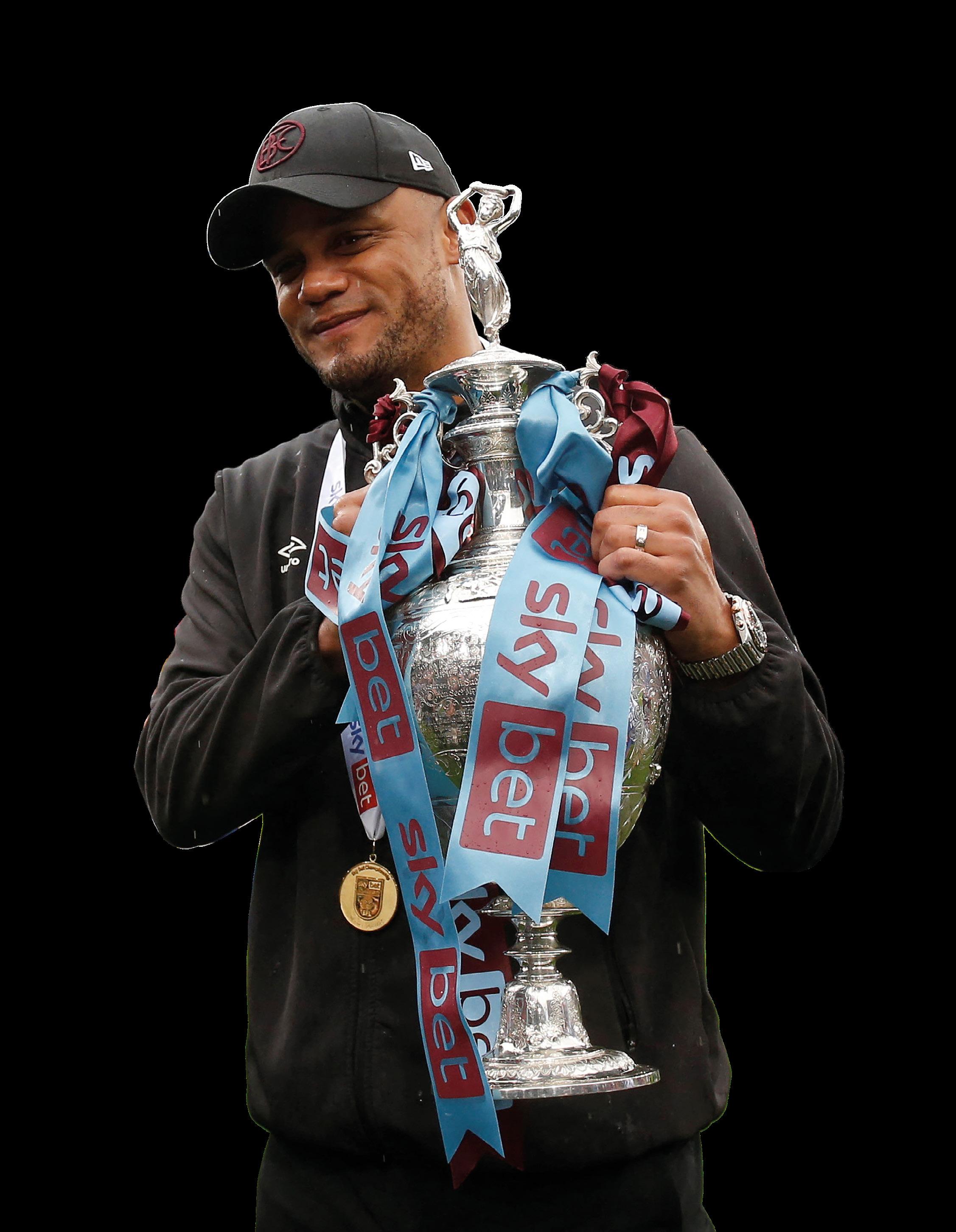

32 The Manager Journal THE MANAGER
I’M NOT THE TYPE OF PERSON WHO OVERTLY SAYS, ‘WE’RE GONNA WIN’, DESPITE EVERY FIBRE IN MY BODY DOING EVERYTHING TO WIN ALL OF THE TIME.
POLITICS AND SOCIAL ISSUES WERE A VALUABLE PART OF MY UPBRINGING.
My mum was heavily involved with union work, and growing up I would join her and the rest of the family on marches in support of various causes. My dad, meanwhile, had been a political refugee against the regime of Mobutu when he was still a student and worked in politics for 20 years. They both very much believed in rolling up your sleeves to fight for what you care about.
GOOD PARENTING WAS A GIFT.
I grew up in a very difficult area of Brussels, but despite that, I always felt privileged and fortunate, because I had such good parenting. I realised even then that, when you’re young, having that is worth more than any kind of material wealth. Even from a very young age, my parents would discuss important topics with us at the dinner table and we were encouraged to take ownership of our mistakes and to be accountable for them. The principles and standards they instilled in me as a child have stayed with me to this day.
HUMILITY IS REALLY IMPORTANT TO ME.
I don’t take the view that I’ve
achieved anything great as a manager; I’m just on the path to learning and improvement. In life, you always have successes and failures, ups and downs, but I believe that if you show humility on the way up, the landing will be softer should you fall back down again.

BRUSSELS TAUGHT ME SO MUCH ABOUT BRINGING PEOPLE TOGETHER.
Brussels is one of the world’s most multicultural cities. To succeed there, you have to be either brave and feisty enough to stand your ground, or emotionally versatile enough to connect well with people. There is so much diversity in people’s backgrounds and if you are a leader in football or at work you’ve got to be able to adapt your tone and approach to each person that you are talking to.
THERE
ARE, HOWEVER, ALWAYS CORE VALUES.
Everyone, no matter what their culture or background, can associate with simple values like hard work and respect for others. To get people to buy into what you’re trying to achieve, it’s important to put these common values front and centre. It’s essential also that people understand who those around them are as people. I tell my players that it isn’t
League Managers Association 33 VINCENT KOMPANY
Through charity TackleMCR, a joint effort with Manchester Mayor Andy Burnham, Kompany has successfully housed more than 2,000 homeless people. Reuters // Action Images
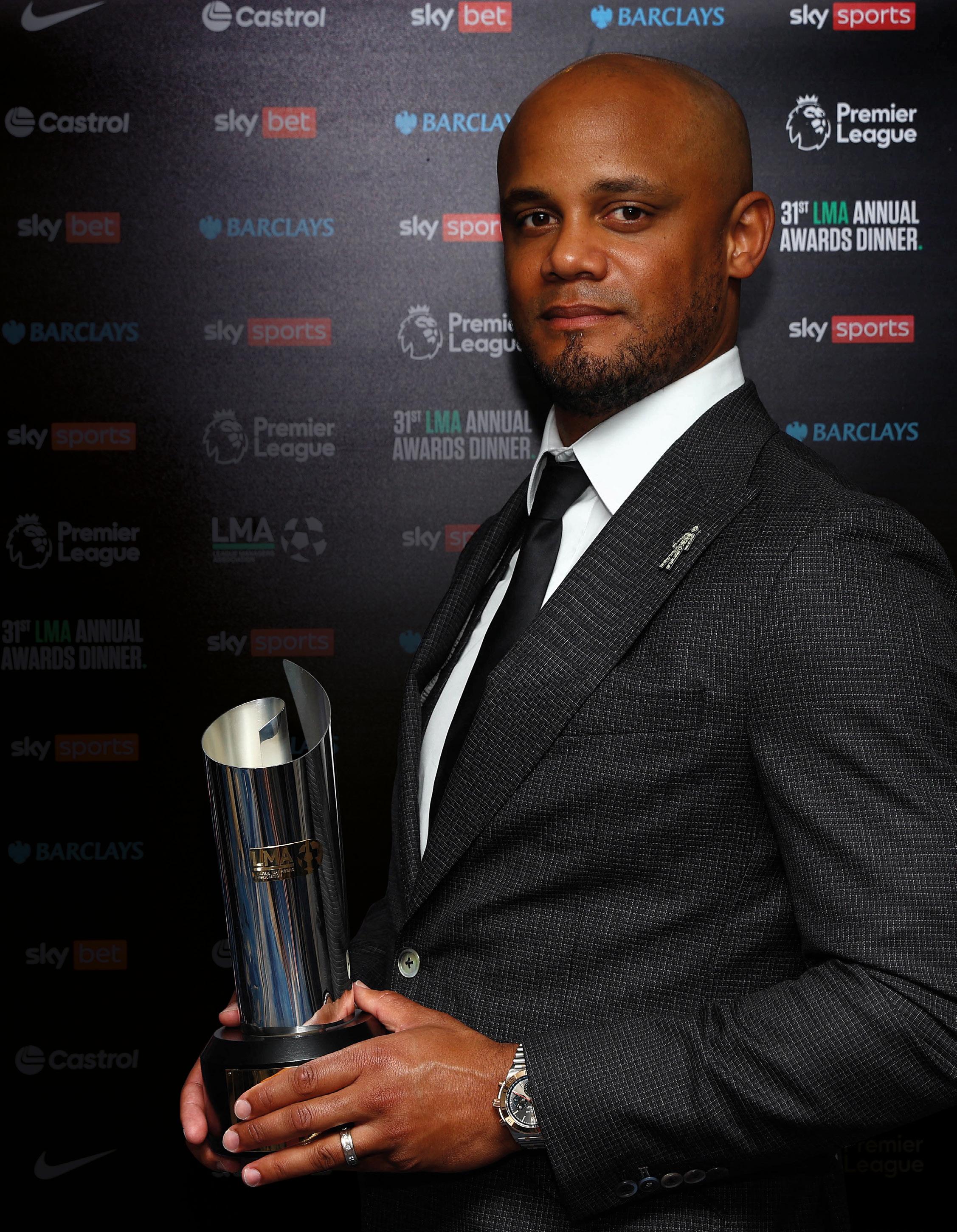
34 The Manager Journal
I BELIEVE THAT IF YOU SHOW HUMILITY ON THE WAY UP, THE LANDING WILL BE SOFTER SHOULD YOU FALL BACK DOWN AGAIN.
only the coaches who need to make an effort to understand the players; they, too, have a responsibility to understand those coaching them. Who are we as people, and where do we come from? If they can do that, they’ll have a far better understanding of why we respond to things in the way we do.
I MET PEP GUARDIOLA AT THE RIGHT TIME IN MY CAREER.
I worked under so many great managers as a player, and took inspiration in terms of my approach later as a manager myself. I met Pep when I was in my late 20s and thinking about making the move into management. He really helped me to develop my thinking around what I wanted to do. When I had that information, firstly it made me a better player and secondly I had the feeling that I’d like to be able to make an impact, in terms of the development of other players.

ANDERLECHT WAS A CHALLENGING INTRODUCTION TO MANAGEMENT.
It was a pressure cooker, with very high demands, so becoming player-manager and then head coach there wasn’t a gentle transition into management.
I was very fortunate, however, to work with a group of talented young players who, while not necessarily ready in terms of performance, had a real desire to improve. It was a joy to see their constant development over a period of time, and for them to overachieve as they did, on what were very limited resources compared to the competition, was incredible. Unfortunately for managers, it tends to be the reputation of the club that sets the benchmark, whereas it should be the resources available to you.
WE HAVE A SUPPORTIVE INFRASTRUCTURE AT BURNLEY.
You always gather as much information as you can on a club before you decide to join it. It’s important to feel that you aren’t going to have any regrets, because you’re making a decision with your gut having been well-informed. The big question I asked myself when considering joining Burnley was: do I want my next career move to be guided by the size of the club, its badge and history, or about the here and now, and the people? I chose the people and, indeed, I have felt that every step of the way at Burnley I’ve been surrounded by people who want me to succeed.
Reuters // Action Images League Managers Association 35 VINCENT KOMPANY
Vincent Kompany won LMA Sky Bet Championship Manager of the Year at the 2023 LMA Awards.
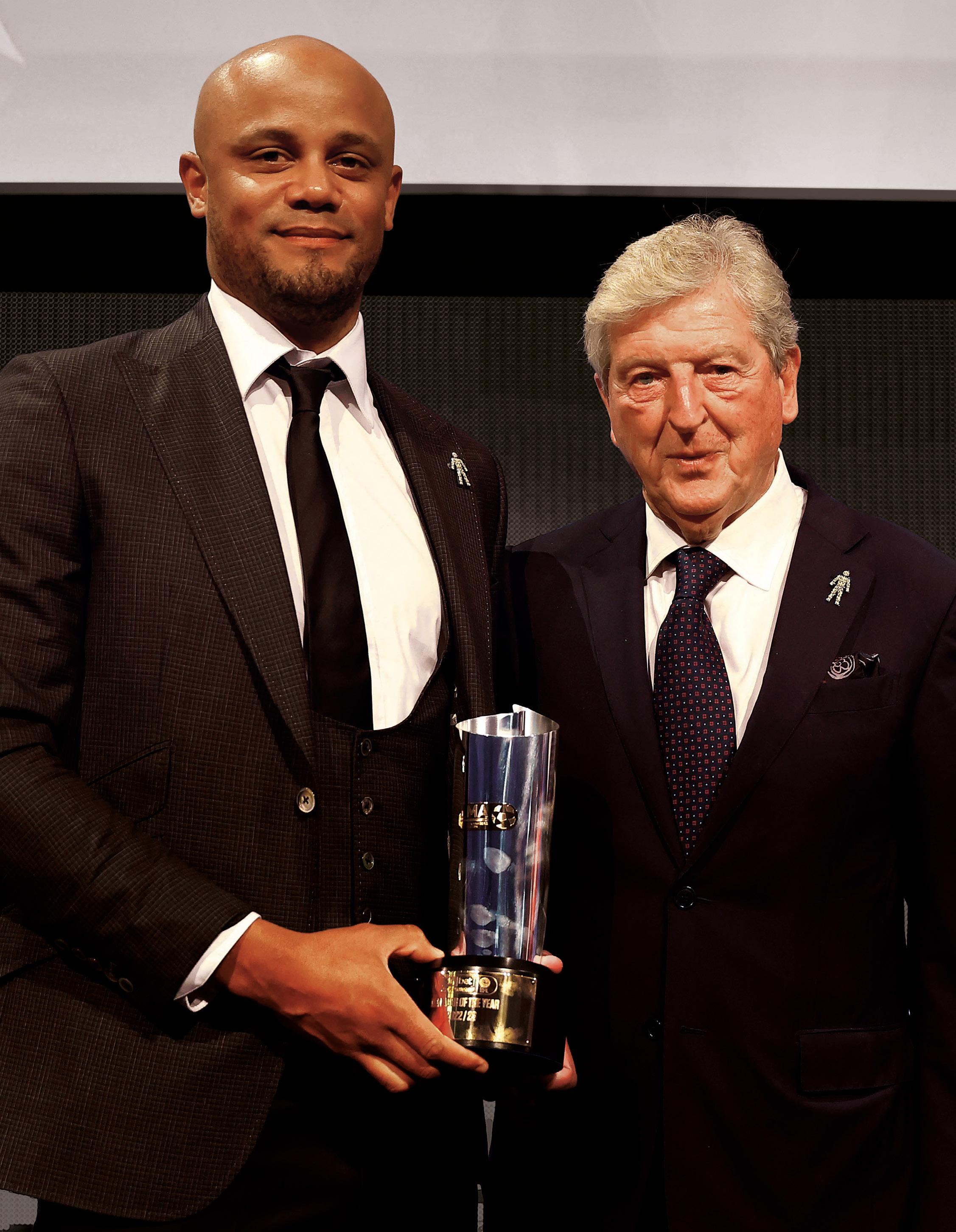
36 The Manager Journal
Kompany was presented with his trophy at the 2023 LMA Awards by LMA member Roy Hodgson CBE. Reuters // Action Images
A DEVELOPMENT MINDSET RUNS THROUGH THE CLUB.
It’s in the culture. You can own up to your mistakes without fear, and learn from them in order to progress and grow. That’s the kind of environment you need, especially when you hit difficult times, because there’s a robustness and resilience. I’m not the type of person who overtly says, ‘we’re gonna win’, despite every fibre in my body doing everything to win all of the time. I believe that winning consistently requires you to grow to the right level. Rather than
focusing on winning, you have to focus on developing the right habits, the things you need to do in order to win. That needs to be relentless and that’s what I emphasise to my team; it’s about continuous growth and building resilience.
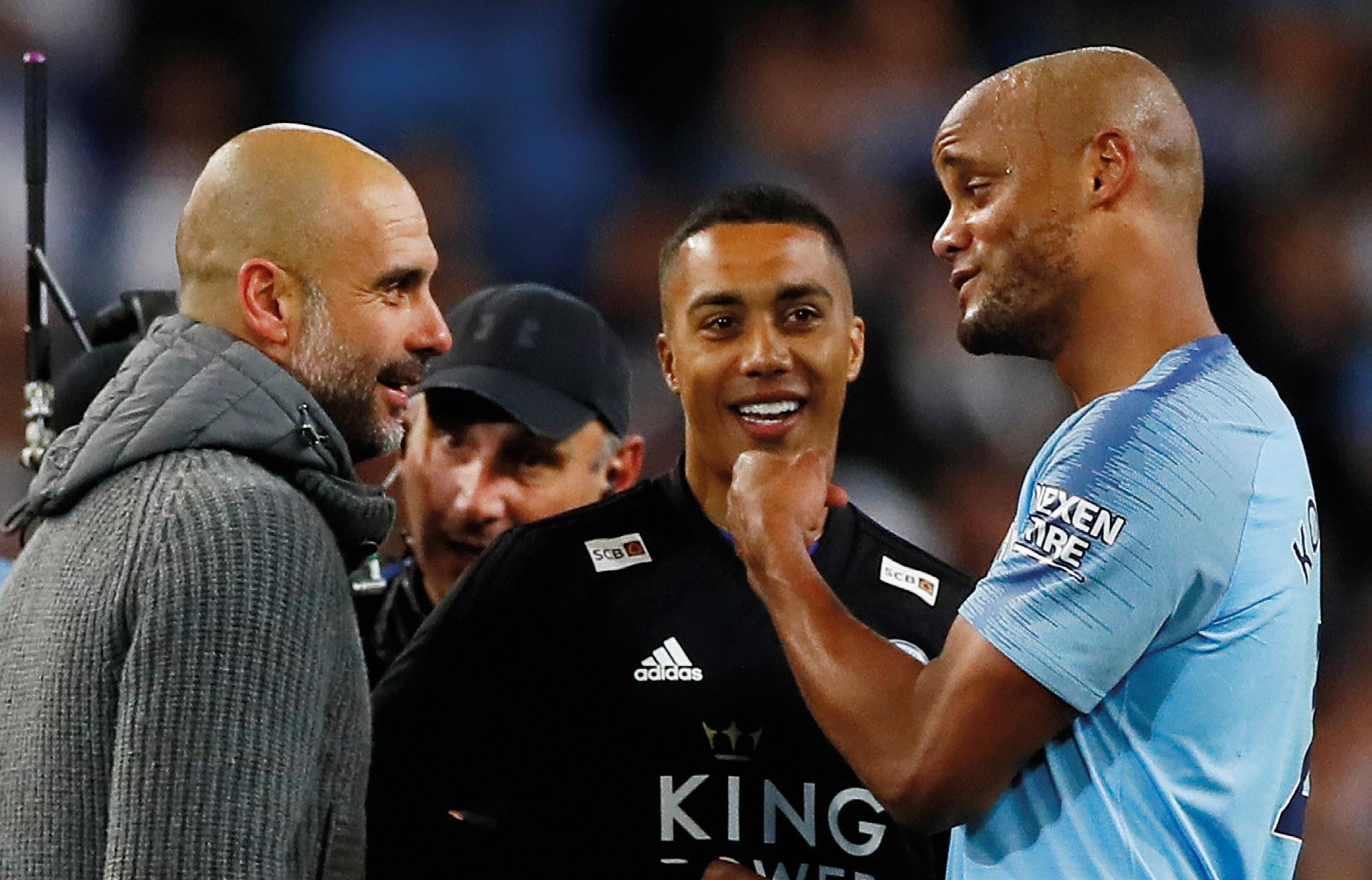
IT’S VERY IMPORTANT FOR ME TO GIVE BACK.
It’s simple… there are so many people around the world that need support. It’s impossible to solve every problem all at once, so it’s natural to gravitate towards the things that really touch you. For me, one of the
most basic things is for people to have a roof over their head; homelessness should not exist in our society anymore. I could not have achieved anything in tackling homelessness in Manchester without the assistance of experts in this field. I did some research and found that Mayor of Manchester Andy Burnham’s fund gathered many strategies into one in order to help the homeless more effectively. I’ve been really pleased with the impact that we’ve had and hopefully there will be much more to come in the future.
League Managers Association 37
Kompany played three seasons under Pep Guardiola, winning back-to-back league titles in 2018 and 2019. Reuters // Action Images
Words: Alice Hoey
Photography: Reuters // Action Images
NO MANAGER IS AN ISLAND.
The use of dispersed or shared leadership has become a critical advantage for those at the top in sport and business. We ask why this model is so effective and what it means in practice.
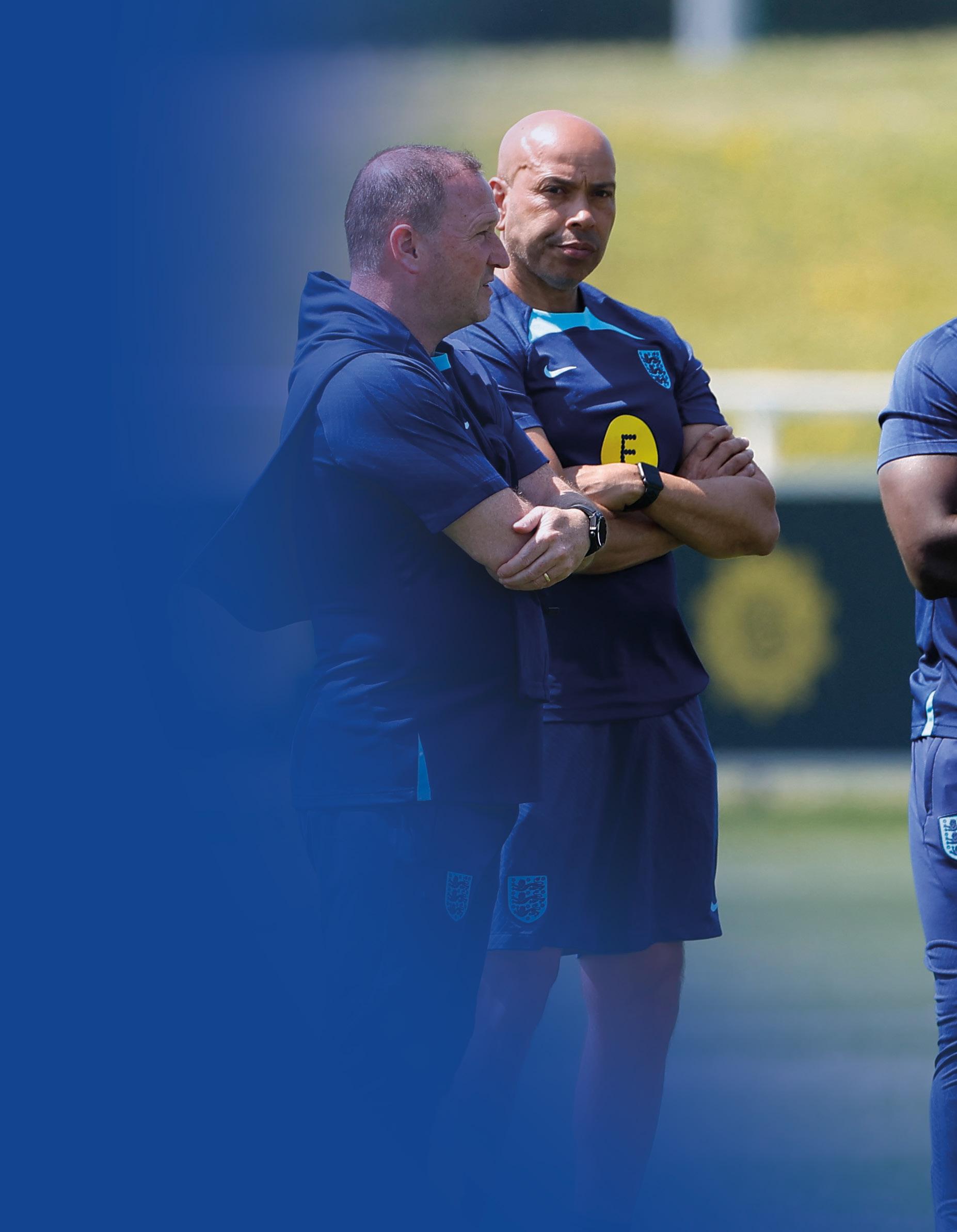
38 The Manager Journal THE MANAGER
England manager and LMA President Gareth Southgate OBE is an advocate of a dispersed leadership approach. Reuters // Action Images
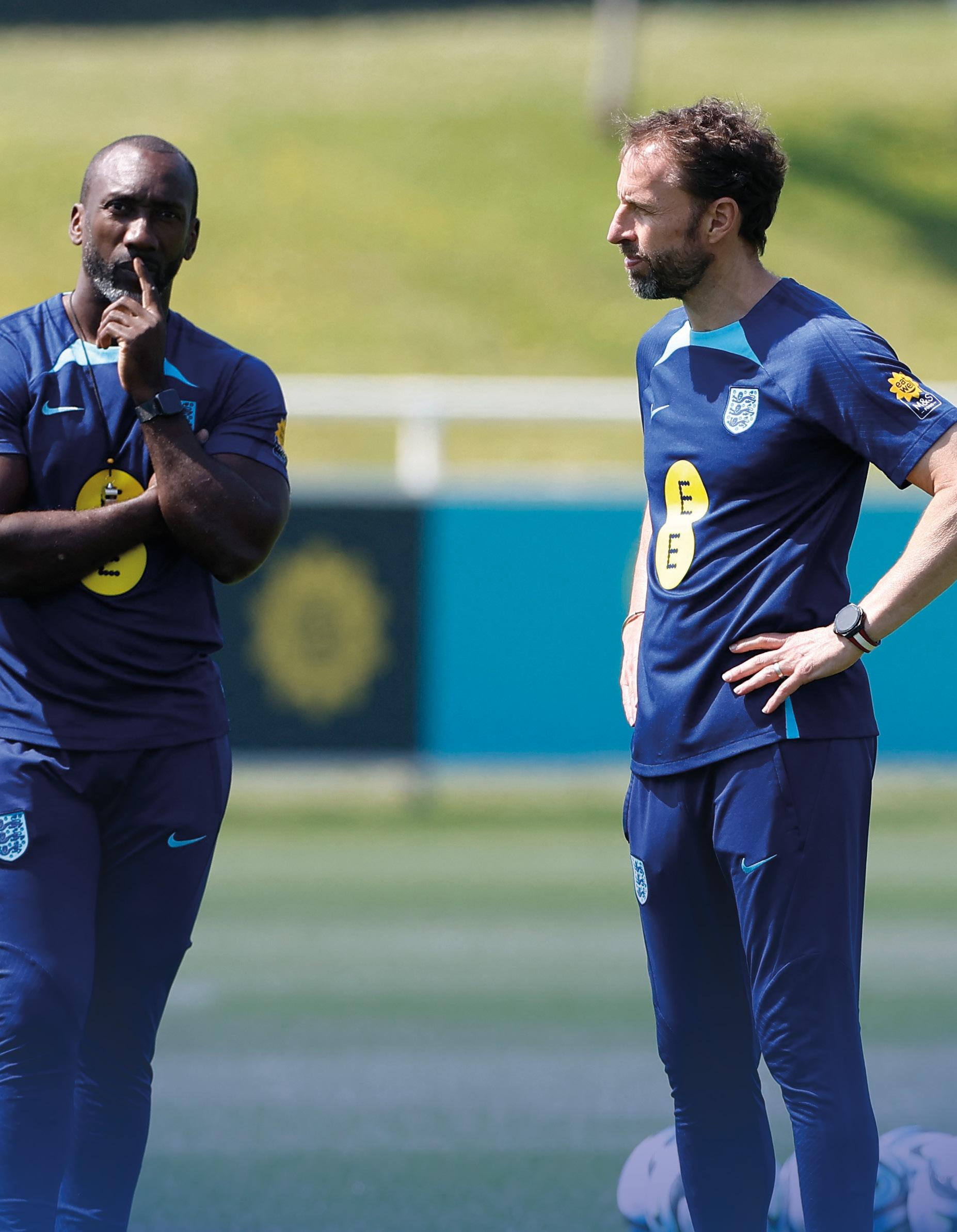
League Managers Association 39 DISPERSED LEADERSHIP
The dynamic between the manager and their team members has changed dramatically over the past 50 years or so. Once based around the idea of leader and follower, a centralised downward influence, and command and control, the relationship has evolved into something much more collaborative. Today, it draws on the leader’s ability to listen, engage and communicate more than to dictate or govern. More recently still, delegation and trust have also come to the fore in a leadership approach that is becoming increasingly popular, especially in complex and fast-faced environments.
In a ‘dispersed’ or shared leadership model, the leader is not only open to the ideas and views of his or her team members; they also actively delegate some of those decisions, tasks and responsibilities to members of the team. These individuals effectively take on the role of leader themselves, working either on their own or, as is increasingly common in sport and business, in small leadership groups.
In sport, this leader-withinthe-team role was to some extent filled traditionally by the captain, but many feel this is no longer enough. As Jürgen Klopp says: “Being a skipper or a captain is a big role, but in a team you need many captains,
not just the one who wears the armband. Without all of the other leaders in the group, you don’t stand a chance. At Liverpool, we are blessed with a really strong leadership group.”
The advantages of shared leadership, such as is in place at Liverpool, are many, and include the ability to expand the availability of skills and perspectives. Rather than hearing one voice, based on one perspective, one background and one set of experiences, people within the organisation get to hear about the values, goals and strategies of the team through many different prisms.
TEAMS WITHIN TEAMS
Sharing tasks and responsibilities, as well as challenges, among the group also gives managers the very best chance of coming up with effective solutions. England manager and LMA President Gareth Southgate OBE sees himself not as a sole figure of authority, but at the helm of a multi-disciplinary team of decision makers, each with their area of expertise and each on their own path of improvement and development. According to Southgate, in an increasingly complex and fast-changing world, it’s unlikely that one individual can single-handedly understand and solve the problems they face or develop their team to its full potential.
“Managers now are leading bigger teams and need more specialist support in every area, from nutrition to analysis to medical to communications,” he says. “Each of those areas is advancing more rapidly than probably in any time in history, with new pieces of research and best practice shared quickly and openly.”
Sussex Cricket Head Coach
Paul Farbrace (interviewed on pg 50) agrees with the notion that attempting to have sole control over everything is outdated, saying, “In every team I work with, I make sure there’s variation and diversity in our support team, because I can’t, and don’t need to, know everything. If there are members of my team who have better knowledge or expertise on a matter, then I’m happy to give them that responsibility.”
GETTING THROUGH
Another key area where a dispersed approach to leadership can prove invaluable is in communication, and this is especially true in large, complex and highly diverse organisations. Disseminating information via leaders positioned within particular groups can ensure your messages are conveyed in a way that is both accessible and relevant, taking into account things like the age and level of technical knowledge of the audience. Getting the message
The Manager Journal 40 THE MANAGER
out in this more bespoke way is likely to make a bigger impact and encourage greater buy-in and engagement from the people you are depending on to give their best.
Managers cannot be everywhere at all times, but with leadership teams in place you have the ability still to deliver messages face to face. The manager does all he or she can to prepare the team before a big performance, but when the starting whistle blows they still need leadership. Having a representative, an extension of you, on the ground at key times is therefore essential. A sales team heading to an important meeting relies on the designated leader among them to help them focus, maintain calm and make important decisions on the day.
Likewise, once a sports team sets foot on the turf and is out of earshot of their manager, they need a figure close by to rally them when motivation wanes and to make snap decisions for the team as events unfold.
Leadership groups, and individuals who are delegated the task of leadership within their particular group, can also help the manager to monitor and manage social dynamics within the team. They are better placed to uncover conflicts and cliques, and to ensure that people feel accountable to the standards that you and the team have set. They can also really get to know team members as individuals; understanding their perspectives and development needs on a deep level requires a physical and emotional proximity that

Rather than trying to be everything to everybody, the best leaders are listening, trusting and, above all, sharing the load.
League Managers Association 41
Jürgen Klopp understands the importance of sharing responsibilities with his assistant, Pepijn Lijnders, and others within his support and playing teams. Reuters // Action Images
WIN BE T TER

T HE W OR L D ' S MO ST E X T E NS I VE L IB R A RY OF P R OF E S S ION A L C O A CHING S E S S ION S AT YOUR F INGE R T IP S
el i t e socce rcoachin g .n e t
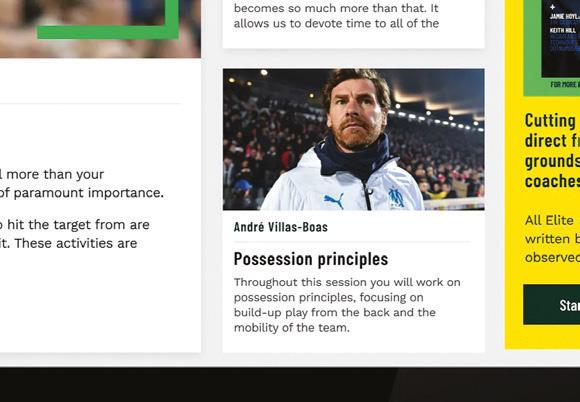
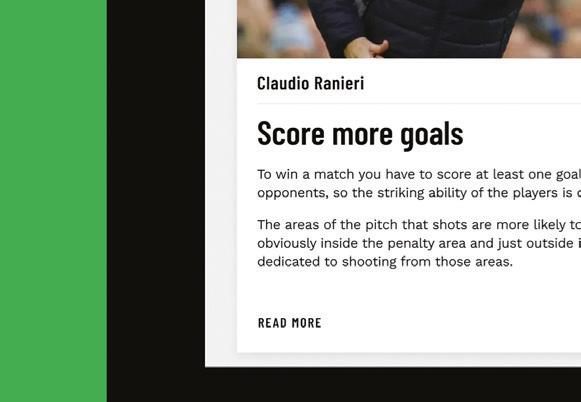
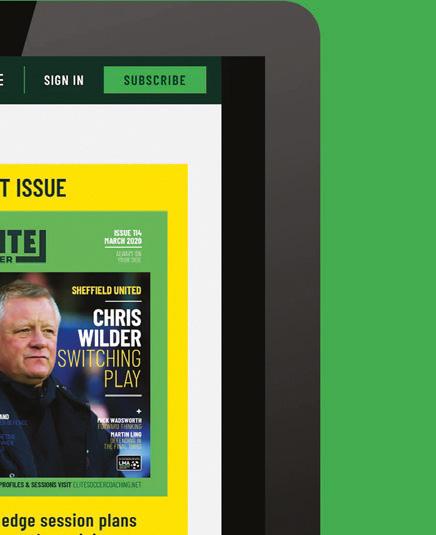
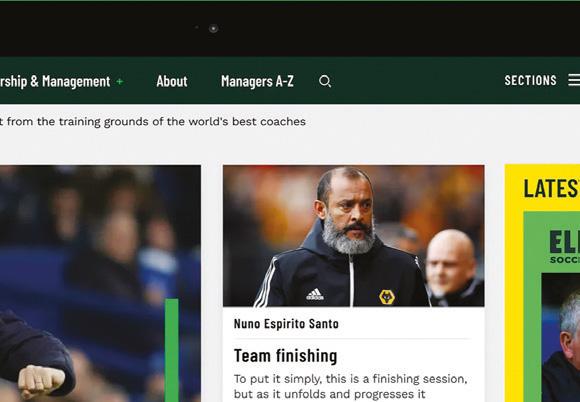
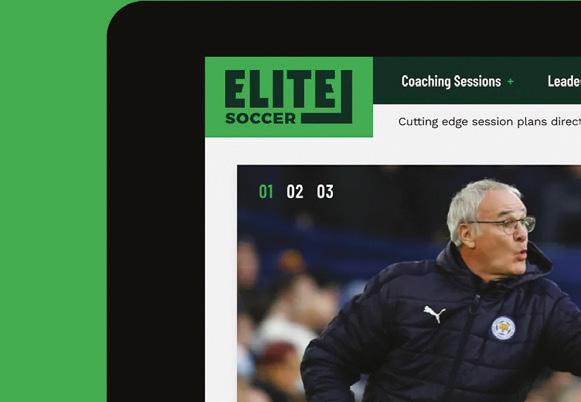
“ I w i s h I ’d ha d i t w he n I s t a r te d co a c hi n g ” S ir A l e x Fe r g u s o n CBE
“A f a n t a s t i c m a g a z i n e ” r OBE e g n e W e n è s r A


“ l l o ok f o r w a r d t o r e c e i v i n g e ve r y i s s u e ” J o s e M o u r in h o

C E L E B R A T I N G 1 0 Y E A R S A S T H E C O A C H E S
C HOI C E
’
one leader may not always be able to achieve.
SUPPORTING ROLES
Indeed, with increasingly diverse teams, it is important that managers ensure their members have someone they can turn to who speaks their language, both literally and in terms of how they can relate and empathise.
Brendan Rodgers says that, while leadership teams have been around in football for some time, it’s now more formalised: “In the modern game, these leadership groups or committees are very useful, especially in the Premier League, which is so international. There may well be players in your squad and other groups who don’t speak the language, and it’s important that they have that representation.”
However emotionally intelligent and supportive the manager, their team members may not always wish to confide in them, especially if they believe it might affect their future career opportunities. Providing leadership figures to whom they can speak, whether a peer, an assistant manager or a physiotherapist, is therefore an important part of the organisation’s support network.
Farbrace says that, while he can’t expect to be everyone in the squad’s cup of tea, he does need to make sure that there is
someone among his coaches, players or support staff for everyone. “They might not see things your way or they might feel more comfortable speaking to the fielding coach or the physio. The latter plays such an important role, keeping the players on the field. They have important decisions to make every day. The players tend to open up and tell them everything, sometimes because they want it to be passed on to the coaches; other times it’s just because they want to vent. They are a fantastic conduit to the coach or manager.”
MAKING IT WORK
While such leadership groups can be appointed formally, Klopp says at Liverpool they have grown more organically. “When Gini Wijnaldum arrived, for example, we knew what a fantastic player he was, but not the leadership role he would want to play, and he has been massive as a leader for us.”
Whether they emerge naturally or are put in place intentionally, leadership groups still need to be managed well, and require solid relationships, trust and communication pathways in order to prove most effective.
For the system to work, says Rodgers, you need absolute clarity of roles and responsibilities. “It’s important that it is very clear what that
leadership group is designed to do,” he says. “It’s certainly not designed to help pick a team, for example, but it is there to address the needs of the players and provide a bridge in terms of support between the players and the manager.”
That clarity should cover, for example, the kinds of decisions people should, could and must not make, what information and level of detail you need them to share with the team, and what and how often they should feed back to you as the manager.
Once these guiding principles are in place, leadership groups should be given autonomy to carry out their roles and responsibilities, and the tools and support they need to do so effectively. Importantly, they also need to understand that they are accountable and know that they have your full trust.
The job of the leader has never been more complex. As well as having a vast spectrum of knowledge and data at their fingertips, they must communicate with a diverse team of performers who are more aware and involved than ever, and manage a group of experienced experts. Rather than trying to be everything to everybody, the best leaders are listening, trusting and, above all, sharing the load.
League Managers Association 43 DISPERSED LEADERSHIP
Words: Alice Hoey
Photography: Reuters // Action Images // Alamy
CARLA WARD
FIGHTING SPIRIT.
During her five years in management, Aston Villa Women’s Carla Ward had tough conversations with senior management and rescued a threadbare team from an all but certain drop. Here, she shares just some of what she’s learned along the way.

44 The Manager Journal THE MANAGER

League Managers Association 45 CARLA WARD
I WAS A ‘PLAYER-MANAGER’, BUT ONLY BY TITLE.
When I got the opportunity to become player-assistant manager at Sheffield United, I still had maybe one more season in me as a player, and I wasn’t sure I was ready to retire. However, it was an opportunity too good to pass up. Once I’d accepted the job, everything went so fast; I played a key role in the club’s successful bid to get into the Women’s Championship and, when the coach stepped down, I took his place. I didn’t kick a ball at all though, and I shed tears on several occasions at the realisation that I was no longer a player, despite the job title. However, I was learning and growing so much at the club and spent four happy and successful years there.

TRANSITIONING FROM PLAYER TO COACH ISN’T ALWAYS EASY.
When we made it into the Championship, I had to bring new players in and I looked, naturally I thought, to the ones I knew, people I’d played my entire career with. It was one of the key mistakes I made early on, because in my head I was still one of them. I’d been something of a clown in the dressing room, but now I needed to know where the line was, how I should speak to the players and be around them as their manager, not a fellow player. I found that transition from player
to manager really tough and lost a lot of friends along the way, but I also learned an incredible amount very quickly.
EVERYONE ADVISED ME AGAINST JOINING BIRMINGHAM CITY.
When I was invited to take the manager’s position, the club was in crisis, and had been pretty much written off by everyone. However, I love a challenge. I knew that if we got relegated, as we were fully expected to do, I’d still learn a huge amount in the process. If I kept them up, meanwhile, I might put myself in a position where I could progress my career. So, despite literally everyone – friends and respected people in the game – advising me not to do it, I accepted the role. I believe that the harder the struggle, the more you learn; it builds resilience. I relished the fact that nobody thought we would even get a point on the board. In that sense, the job was made for me.
I PUT TOGETHER A TEAM OF DETERMINED MISFITS.
The side had just eight players when I joined and no budget to add many more. My immediate challenge, therefore, was to beg, steal or borrow. Who could I find that had been written off or told they weren’t good enough? We called ourselves ‘the misfits’; nobody thought we could make it, but we were out to prove them wrong. That’s what brought us
The Manager Journal 46 THE MANAGER
Carla Ward was appointed manager of WSL side Aston Villa in May 2021. // Alamy

League Managers Association 47 CARLA WARD
I found the transition from player to manager really tough and lost a lot of friends along the way, but I also learned an incredible amount very quickly.
together. I also brought in Rachel Corsie, a hugely experienced player with over 100 caps for Scotland, to be a leader within the team. She had valuable experience of playing at that level, which I didn’t yet have.
I KNEW WE’D NEED SUPPORT IN ORDER TO SUCCEED.
Some of the players were unhappy about the facilities and support available to them
at the club, so I went to see the CEO at the time. I had done a little research into the females in his family, and I asked him how he would feel if they were treated in the way that some of our players had been. I told him that I would do everything over the next 12 months to help keep the club in the WSL, but that to do so I would need certain things from him. I left his office with a promise of those
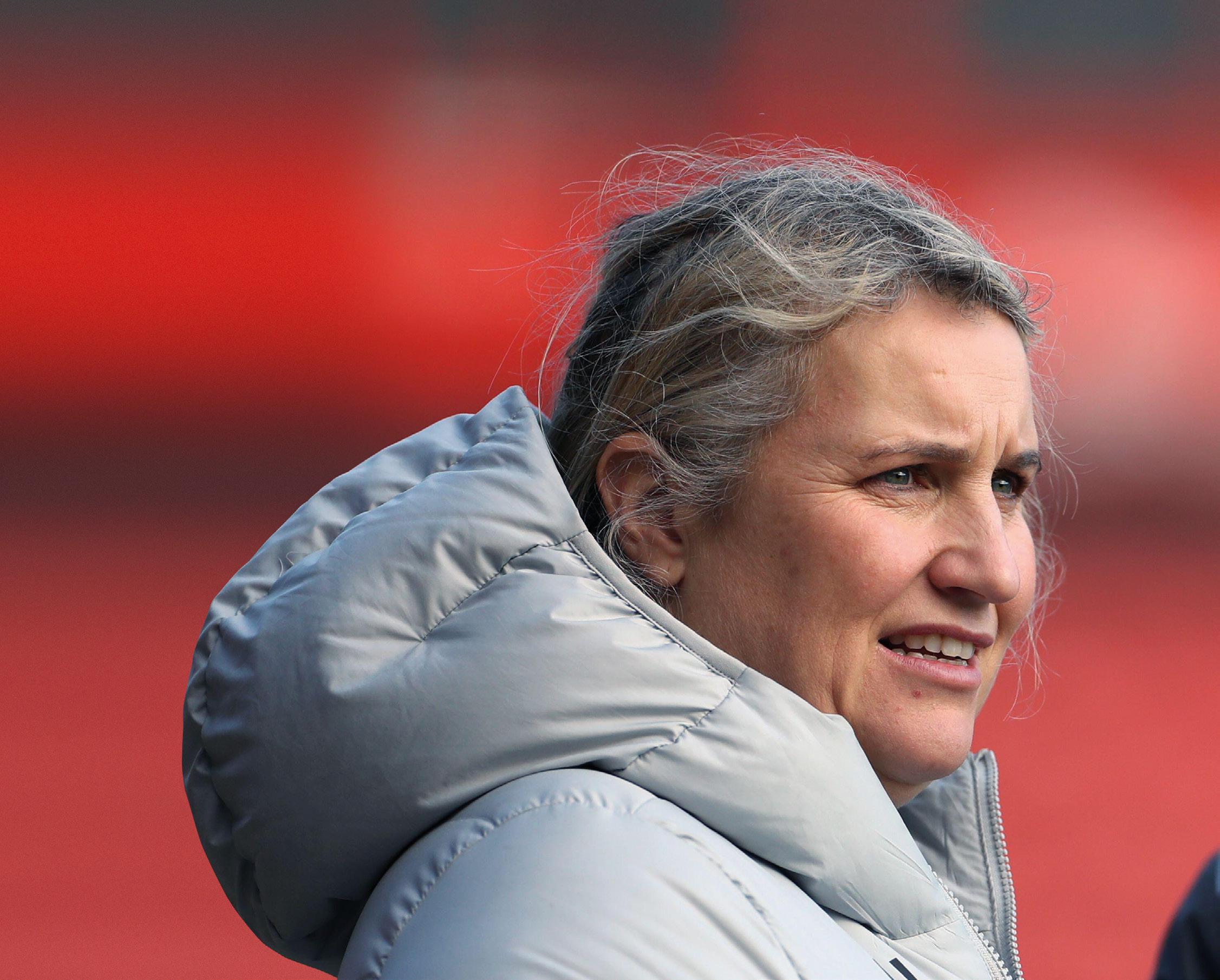
things, those fundamentals that would enable us to get on with the job. I told him it was ‘operation survival’, not ‘mission impossible’ and, ultimately, I’m proud to say we achieved what we set out to do.
WHATEVER WE DO, I’M ALWAYS HUNGRY FOR MORE.
When Aston Villa reached out to me in May 2021, I had doubts about making the move
The Manager Journal 48 THE MANAGER
I relished the fact that nobody thought we would even get a point on the board. In that sense, the job was made for me.
across the city. However, I had my daughter to consider and I saw that the club was ambitious and would support me in my development as a manager. I was still early on in that journey and I knew that the club and I could grow together. We got to the semi-finals of the FA Cup this year, where we were narrowly beaten by Chelsea. That really hurt, but it also made me more determined than ever to compete for trophies. Getting so close
adds fuel to the fire. Are we there yet? No, but we’re on our way.
REFLECTION IS SO IMPORTANT.
When I look back, I can see huge changes in me as a coach compared to when I started out. I’m much calmer and less emotional in my approach, and more able to pause before reacting or making decisions. Even in the last year, I’ve learned a huge amount. I do a
GUIDANCE AND SUPPORT
Early on in my career, I was mentored by Mick Wadsworth, and having that support was incredible; he was a shoulder to cry on, and guided me through those early years in management. I made plenty of mistakes and he would be very straightforward with me when I did. He helped me stay on the right path.
I’m not afraid to pick up the phone to ask for another perspective or for help, and I’ve had fantastic support over the years from my peers in the game, especially Emma Hayes. I also have a mentor on the leadership side. She’s ex-military, a former Olympian and just an unbelievable person. It has been fantastic to have her support, especially during the tough times.
bit of everything to capture that learning; I read, and take part in masterclasses and webinars, but perhaps most valuable for me is self-reflection. You’re always going to make mistakes. What’s important is that you can recognise those mistakes and learn from them. I’m also very open, so I’ll ask our senior players and others around me what they feel we could do better. It’s about digging deeper constantly to find ways to improve.
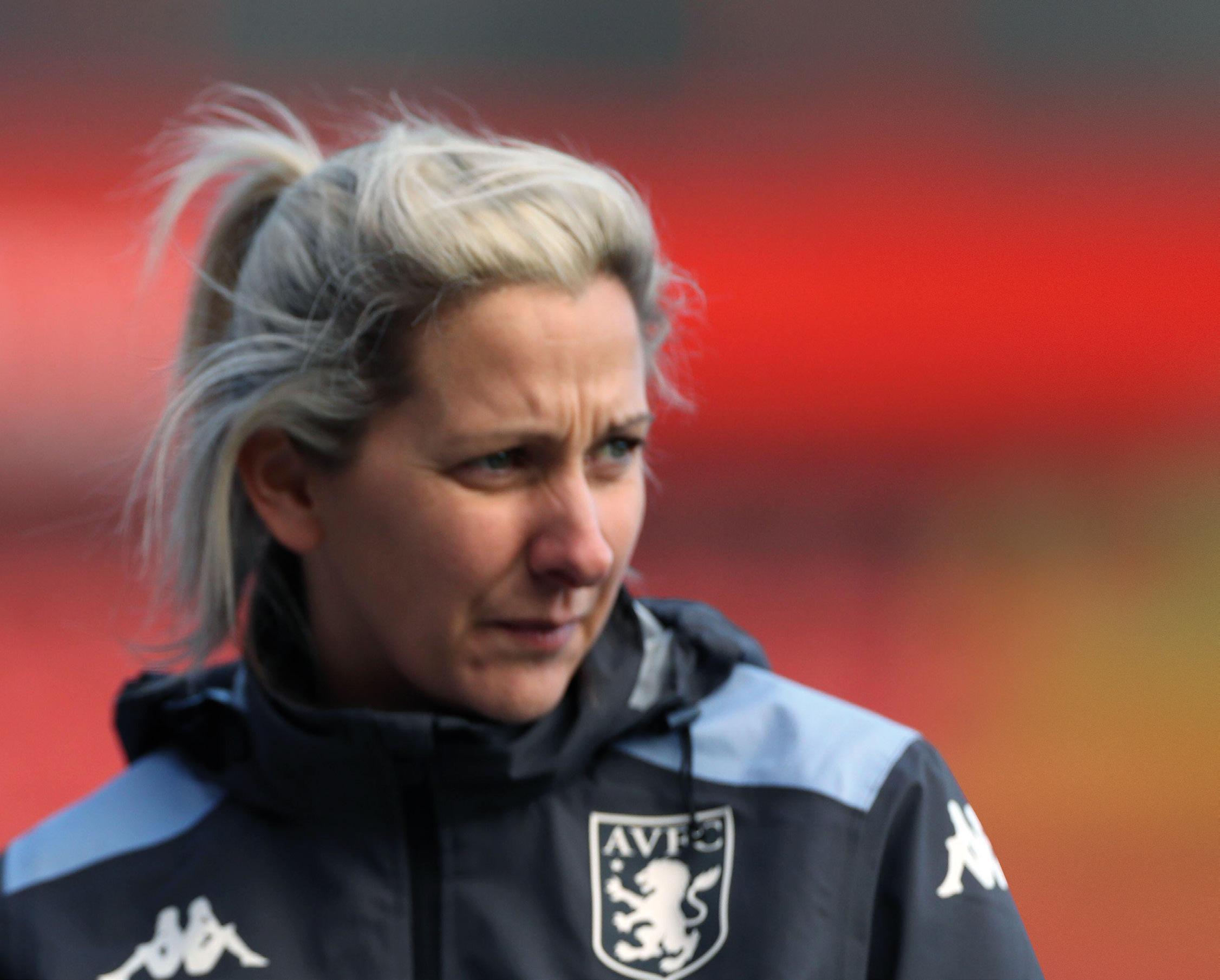
CARLA WARD
League Managers Association 49
Words: Alice Hoey
Photography: Reuters // Action Images
FROM ANOTHER SPORT:
PAUL FARBRACE
LESSONS FROM THE CREASE.
Over the last two decades, Sussex Head Coach Paul Farbrace has cemented his reputation as one of cricket’s most sought-after coaches, acting as head coach and assistant coach to England and Sri Lanka, and supporting the likes of Peter Moores and Trevor Bayliss OBE. Here, he reveals how early disappointments helped to shape his whole approach.

50 The Manager Journal THE MANAGER
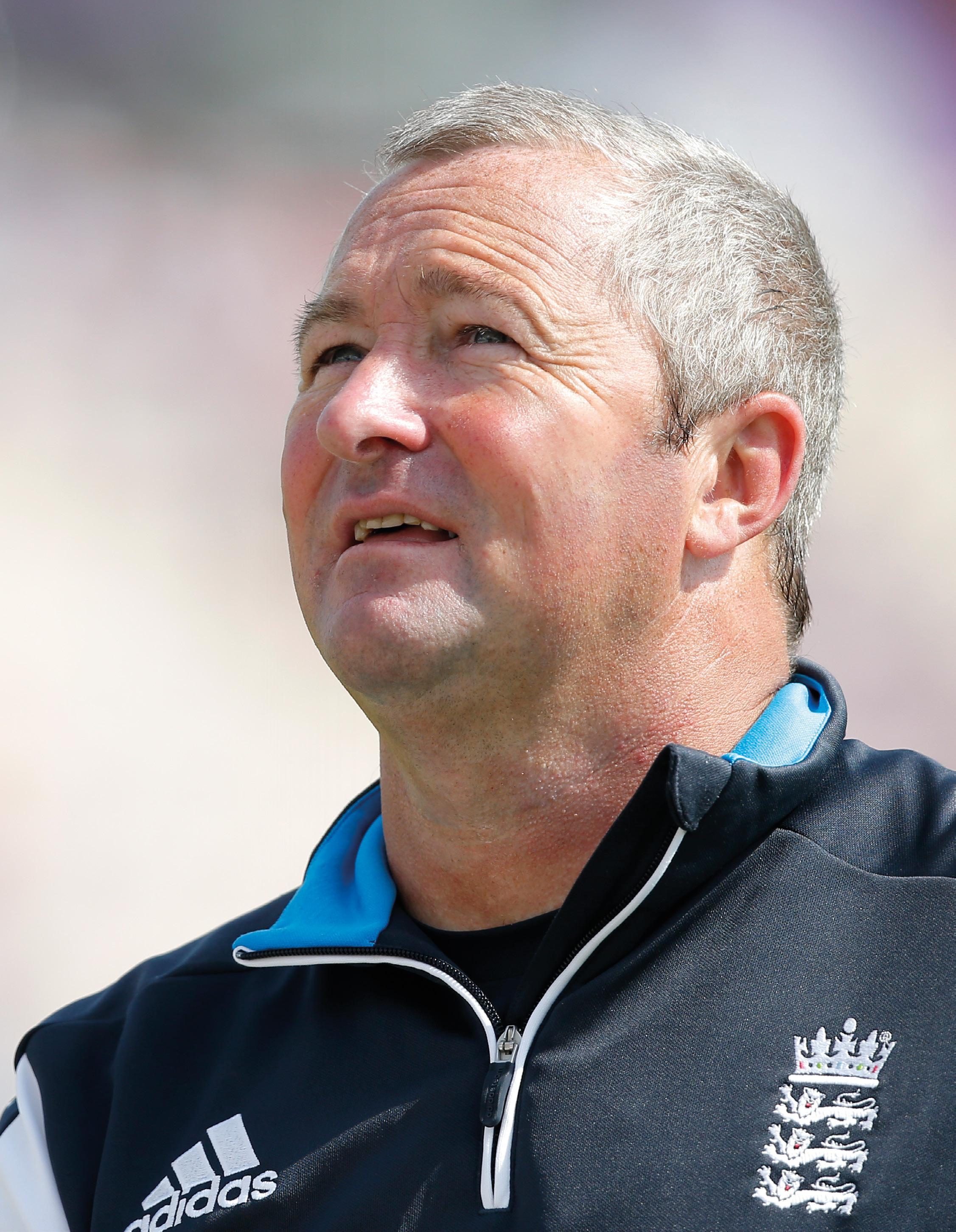
League Managers Association 51 PAUL FARBRACE
GETTING SACKED WAS THE BEST THING THAT COULD HAVE HAPPENED TO ME. It was my first head coach role, at Kent, and the fact that I considered it to be very much my home club made it especially painful. However, I made a lot of mistakes, and the lessons I learned have been invaluable throughout my career. As an inexperienced and unprepared coach, I tried to change too many things, too quickly; I thought I could sort the club out
in a few weeks. I was also far too emotional – too high when things went well and too low when they went badly. I really owned every poor performance, whether it was a game or training session, and felt that they reflected on me personally.
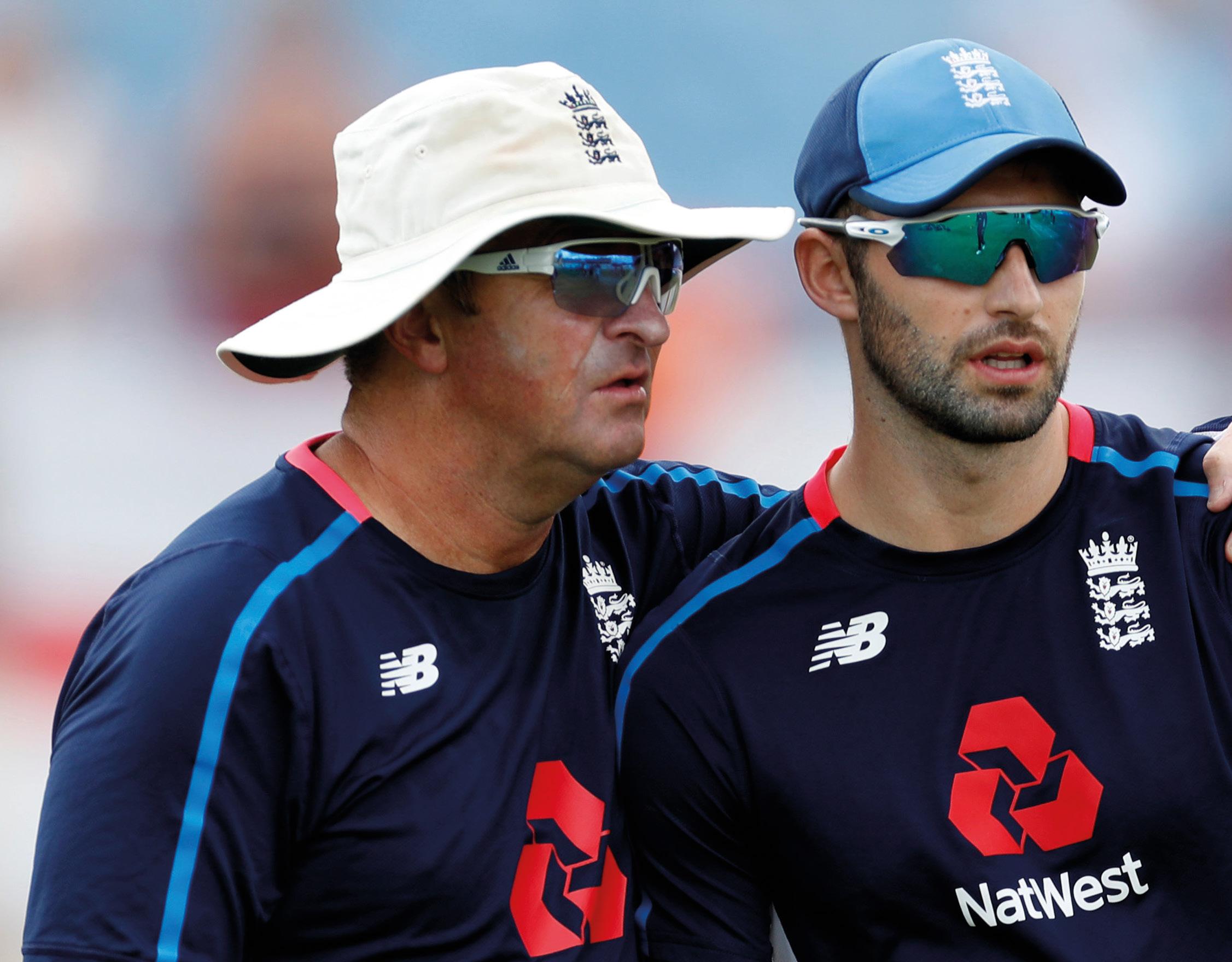
IT SHOULD NEVER BE ABOUT YOU. Because I was in charge, I thought I needed to be seen to be making every decision and that I should know everything
about everything. I had yet to learn that you don’t and you can’t. I also tried to push changes through on my own, so I didn’t explain things well enough to the people around me or try to take them with me on the journey. I was so wrapped up in how things reflected on me that I lost sight of the bigger picture.
YOU HAVE TO LOOK FORWARD.
I had three months between leaving Kent and taking my next
The Manager Journal 52 THE MANAGER
job, as second team coach at Yorkshire, and I knew I would need to take stock. I spent a lot of time reading, I spoke to many people in sport, and I had guidance from someone who was effectively mentoring me. Importantly, though, I also used the time to shake hands with many of the people I’d worked with as head coach at Kent. I didn’t want to have any lingering ill feeling there, because rather than losing time and energy thinking about the past, I should be focusing on learning from my mistakes and moving on. During my two years at Yorkshire, I was able to rebuild my confidence and figure out what kind of coach I wanted to be, how I wanted to work and what was most important to me.
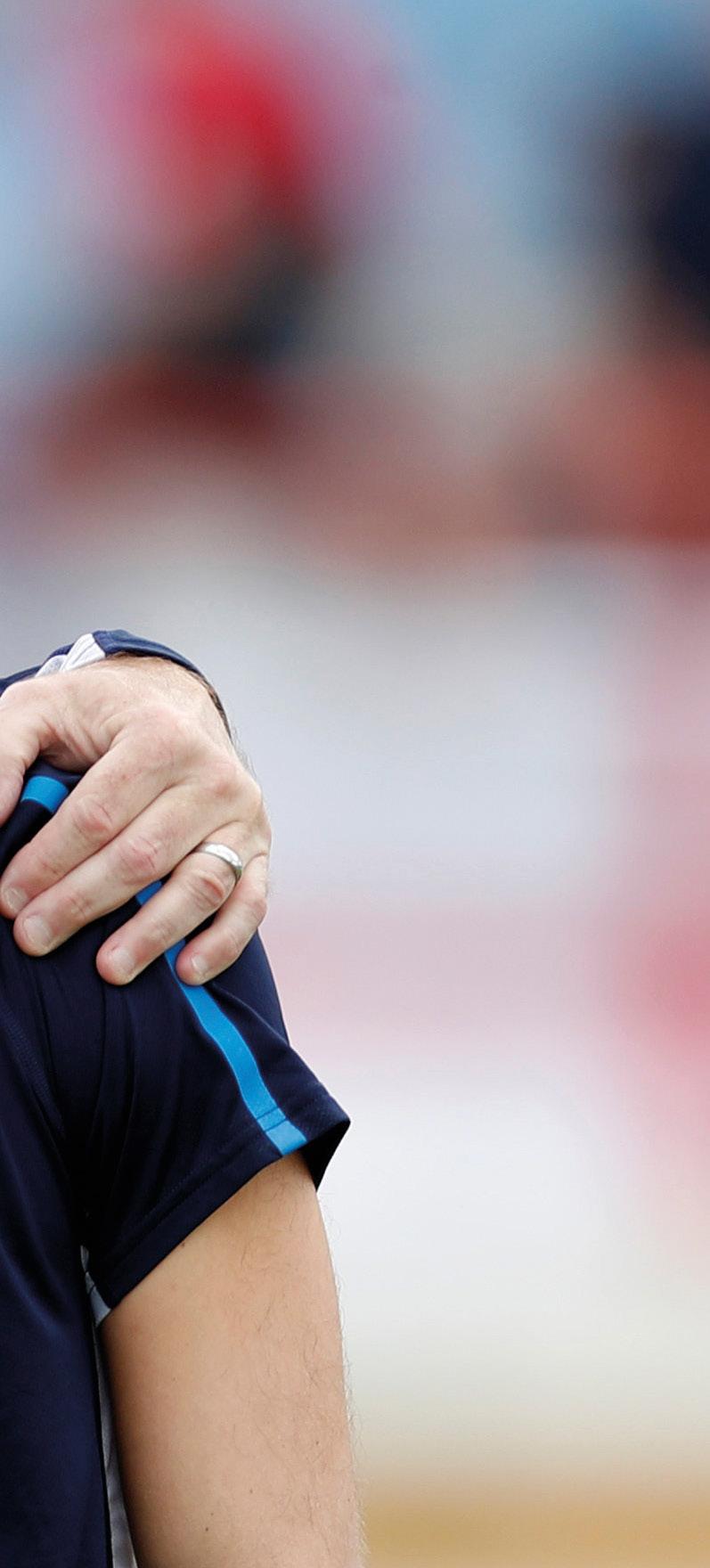
I’M AN EMOTIONAL CHARACTER.
I find it a challenge to stay calm when the pressure is really on, so my mentor and I came up with the idea of keeping a notebook handy and writing down my emotions, rather than venting them out loud. When I became head coach of Sri Lanka, one of the things that gave me the most satisfaction was when, during a T20 game, one of our batters commented that I was the first coach they’d had in ages to have stayed calm when they were down to the last ball of the game. He didn’t realise how much that meant to me,
but I’d been really working on controlling my emotions, so I was proud to have made such progress.
YOU NEED EMPATHY TO COACH TOP PLAYERS.
I make it clear to the players that when I’m disappointed, I’m not disappointed in them, but for them, because I know how hard they’ve worked and the sacrifices they’ve made in order to get to that level. The biggest change I’ve seen during my career in coaching is the growth in emphasis on understanding the players and what they need from you. Every player wants something different, but you can’t give it to them or help them to improve if you don’t know them well enough.
I INVITE PEOPLE TO CHALLENGE ME.
The older and more experienced you get, the more you realise just how much you don’t know and how valuable it is to listen to information and viewpoints from other people. I tend to be very strong in my views, but I’m clear with the people around me that it’s still OK to challenge me on those views or approaches. I’m always listening with an open mind.
YOU CAN’T LOSE SIGHT OF YOUR VISION AND VALUES. Eddie Jones has been fantastic to me over the years and one thing in particular I learned from him
The biggest change I’ve seen during my career in coaching is the growth in emphasis on understanding the players and what they need from you.
League Managers Association 53 PAUL FARBRACE
is that you have to be very clear to the players about how you want them to play. You may not have the quality of players to achieve that vision yet so you may have to adapt, but you should never forget that original goal or intention. I think that applies to any sport or business. You have to keep returning to that vision of what you want to achieve, how you want to play, the standards you want to maintain and what’s most important to you as a coach.
I’M NO LONGER PREOCCUPIED WITH WHAT COULD GO WRONG.
I’ve learned that you have to focus on the things you can control and not worry about the things you can’t. For example, I understand the importance of managing up to those I need to, but I don’t spend time or energy worrying about what decisions they or others might make, or what they might be thinking. I need to be focused on the things I can influence, on the players and on our game and goals.
TREVOR BAYLISS AND I HAD A GREAT RELATIONSHIP.
I worked with him as assistant coach at Sri Lanka before starting my head coach role at Kent, and later at England. He picked me partly because I was different to him, because in essence my job as assistant was to fill the gaps, where there
were things that didn’t work so well for him or skills he didn’t have. Also, as an assistant coach you can often get so much closer to the players and they open up more to you, in part, because you’re not the one picking the team, or deciding on the length of their contract or their wages.

MY GOALS AT SUSSEX ARE AMBITIOUS.
Sussex have won one game a year for the last three years in championship cricket, but I’ve been very bold in saying promotion is our goal. That means we need to win eight games. We have that goal up on the whiteboard outside the changing room. Achieving that means changing how we talk around the place, saying, for example, that we ‘expect to win’ rather than ‘hope to win’. Of course, we have processes to improve our batting, bowling and fielding, but we also need to be positive. Equally important is that everyone understands what their role is, on and off the field, and owns it. As for me, I still reflect on the mistakes I made early on in my career in order to improve. For example, I’m conscious about being far more thoughtful and less impulsive in my decision making here at Sussex. I’m deliberately taking my time and ensuring that, this time, I take everyone on the journey with me.
The Manager Journal 54 THE MANAGER
Paul Farbrace worked as England assistant coach for a period of five years under Peter Moores and Trevor Bayliss OBE. Reuters // Action Images
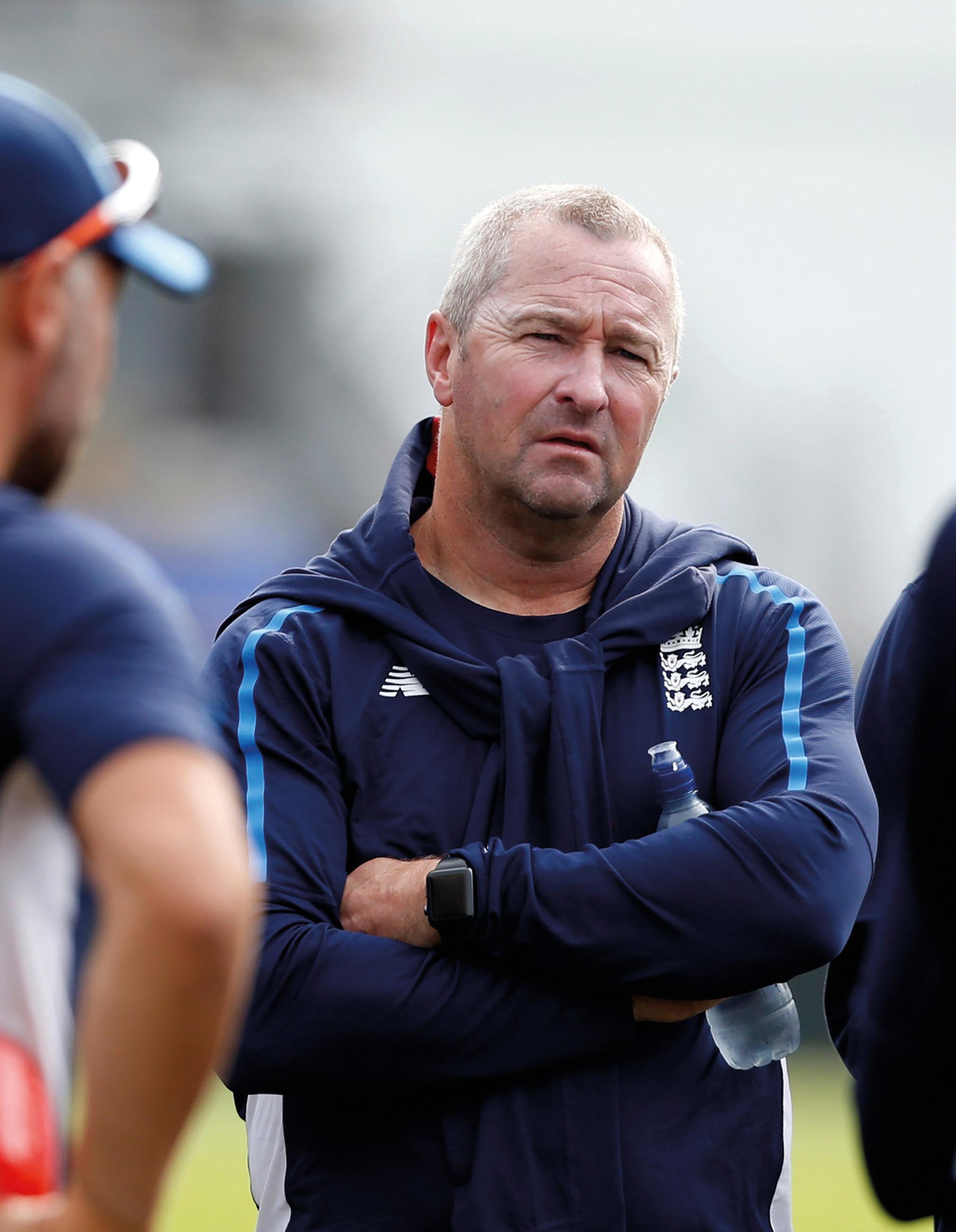
League Managers Association 55 PAUL FARBRACE
KEVIN GASKELL
THAT’S THE PLAN, MAKE IT HAPPEN.
Now an author, speaker and adventurer, Kevin Gaskell made his name as MD at Porsche, taking the brand from bottom of the ‘league’ to the very top. His secret? “We did the basics, but we did them really, really well.”
 Words: Alice Hoey
Words: Alice Hoey
56 The Manager Journal THE MANAGER
Photography: Kevin Gaskell
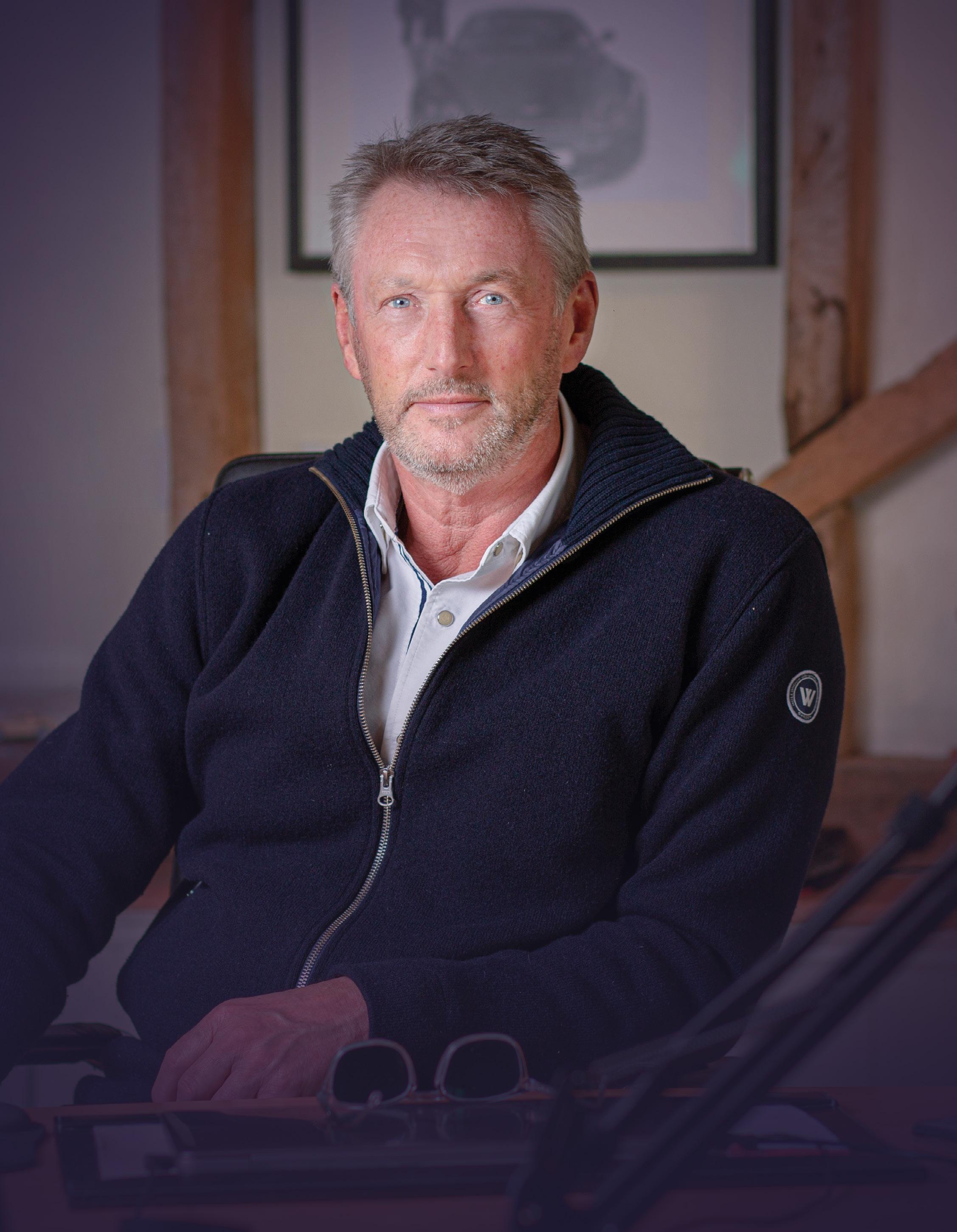
League Managers Association 57 KEVIN GASKELL
When Kevin Gaskell walked into the boardroom to face the owners of Porsche, 32 years old and green around the gills, he was convinced he was about to get the sack. He had already prewarned his wife he’d be home early, and minor panic had ensued; he had two young kids and a mortgage he could barely afford.
“I’d been with the company for five years, getting promoted through the ranks and becoming increasingly frustrated as I watched it sink deeper into trouble,” he says. “Out of the 32 brands in the market, we were bottom in terms of customer satisfaction, had lost 90 per cent of our sales and were haemorrhaging cash. Nobody seemed to have a strategy or a grip on the business.”
When the owners flew over and fired everybody on the board, Gaskell fully expected to be next for the chop. “I went into the office and they started to give me a really hard time,” he says. “However, it wasn’t fair and I told them so, saying, ‘you can be angry, but I’m just a junior grunt in this business; you’re the ones who have driven it into the ground. Most importantly, you could fix it’. They asked ‘how?’ so I showed them.”
Gaskell and the company’s financial manager had worked together on an informal plan of how they’d turnaround the
business, a sort of ‘what would we do if we were in charge?’ vision, so Gaskell picked up a whiteboard pen and started to draw. “I was in there for four hours, and when they asked me to leave the room, I was convinced that was the end of the line for me,” he recalls. “However, 10 minutes later, they invited me back in and instead of sacking me they made me managing director. They pointed to the board and said, ‘that’s the plan, make it happen’.”
A BAPTISM OF FIRE
Since then, Gaskell has made a career out of rescuing ailing or stagnating businesses, following a simple yet clearly effective methodology: commit, connect and create.
“In a situation like the one at Porsche you have to take the business apart and then build it back up again, but the first step is always to decide which direction you’re going to go in,” he says. “What does success look and feel like? When you get there, how will people perceive you and talk about you? Everyone then needs to commit totally to that vision of success. For us, it was all about customer satisfaction. Some people dream all their lives about owning a Porsche, so when they finally get one, we can’t just hand them the keys; we have to give them an extraordinary experience.”

The Manager Journal 58
THE MANAGER
Part of growing as a leader is learning when to give some authority and accountability away, and recognising that you can’t do it all by yourself.
The second part of Gaskell’s model is to make sure every single person in the business connects with that vision of success, and knows how their specific role and that of their department contributes to achieving it. “I make that very visible,” he says. “I’ll make simple drawings of the business plan and stick them to the wall, so that people can see it and relate to it.”
When Gaskell streamlined the company, he cut it from 13 divisions to five, which meant having to let half of the staff go. “It was a terrible thing to have to do, but we simply couldn’t support that cost base,” he says. The people who he kept were those who shared his passion for change, the natural leaders who he knew would stay with him on that journey. With Gaskell at the helm, they exceeded expectations; after four years, Porsche was the number one brand in the market, and top for customer satisfaction and profitability.
Gaskell admits that getting there took a lot of hard work and some very long hours, and that he learned a huge amount about himself in the process. “I had huge misgivings early on, huge doubts that I could lead this thing, because I was effectively learning on the job,” he says. “Part of growing as a leader is learning when to give some authority and accountability away, and recognising that you can’t do
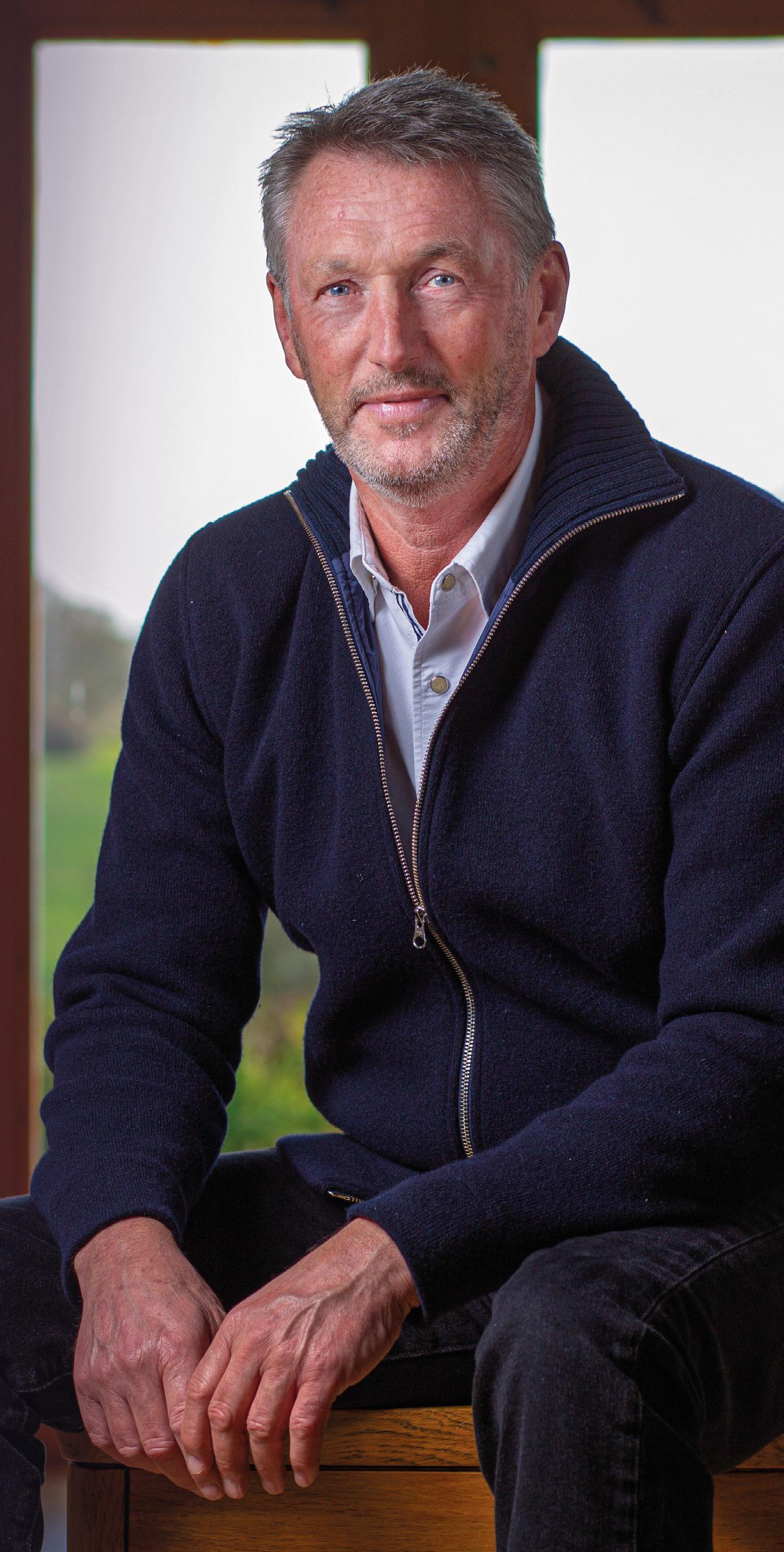
59 KEVIN GASKELL





V isit www.bt.com/sport
All in one place
it all by yourself. I struggled with that at first. Teams would meet without me, and I’d wonder if they were talking about me, when of course they were discussing how to fix the business.”
CATCHING PEOPLE IN
It takes time to build trust and confidence in any team, but with hard work and perseverance the small wins start to accumulate until they’re something quite substantial. As Gaskell says, “I’m a big believer in the idea that if you get better, bigger will follow. The team gets better, fitter, more skilled, more confident, and as a result you trust it more.”
That trust goes both ways, he adds, because as a leader your people need to trust that you have their backs if anything goes wrong. “I believe in catching people in, not catching people out,” says Gaskell. “That means celebrating when they do something well, but having quiet, private conversations when things have gone wrong. That’s very powerful in building trust, because people know I’m not going to bawl them out or drop them in it. I’m not going to throw
chairs around because something didn’t work out. They trust that I’m in it with them.”
The leader’s job is to create a culture that inspires people, where they want to come to work each day because they feel they are making a difference. This is the last element of Gaskell’s model of leadership, to create, and a lot of that comes down to effective communication. Honesty and authenticity play a big part, says Gaskell: “If you speak the truth, people know that and they will trust you. If it’s bad news, you have to tell them that and let them know that it’s up to the team as a whole to fix it.”
When Gaskell joined BMW as Managing Director, fresh from transforming Porsche, he deployed this honesty to full effect. “They thought they were in a great place and that my job was merely to not knock it off the rails, but it was clear to me that there were big weaknesses in the organisation and a lot of hubris. While the plan had been to achieve a modest four per cent growth, I thought we could do much, much better than that. The biggest challenge, therefore,
was engaging the team with what I thought needed to happen, because they thought they were bomb-proof and that everything was great.”
He wasn’t misguided in believing there was untapped potential. Under his leadership, BMW grew by 80 per cent over four years, its operating profit shooting up by an incredible 500 per cent.
Most managers, of course, don’t get four years to effect change with a team; in football, they’re lucky if they get four months. But Gaskell, who left BMW to help a succession of businesses turnaround their fortunes, says the essentials are the same. “You have to build the team back up and get them to have confidence and belief in themselves again, as individuals and as a team. Spend time building a clear plan, making it visible so that people can connect with it, and create a culture where they feel inspired. Ultimately, people don’t move jobs, they move cultures, and they want to work somewhere where they feel someone believes in them, values them, will support and protect them, and help them to grow. That’s my job as a leader.”
League Managers Association 61 10 IDEAS: SCREENING
KEVIN GASKELL
The leader’s job is to create a culture that inspires people, where they want to come to work each day because they feel they are making a difference.
Words: Alice Hoey
Photography: Reuters // Action Images
KEY TAKEAWAYS THE MANAGER
RAISING THE BAR.
In a recent LMA webinar, hosted by Jeremy Snape, former Law Society President I. Stephanie Boyce shared her inspirational story of success against the odds. Despite representing the group of people least likely to succeed in becoming a solicitor – black, female and from a low socio-economic background – she made it to the top, and was determined to give a voice, access to justice and opportunities to people of all races and backgrounds.
I. STEPHANIE BOYCE 62 The Manager Journal
MOVING FROM THE UK TO THE US HAD A HUGE IMPACT ON ME.
I was in my early teens and for the first time I became acutely aware both of my skin colour and of the fact that many people around me were unable to access justice because of their low social position. I was determined to ensure that the voices of those individuals could be heard and their rights could be exercised. I think that being dropped into that environment, rather than growing up in it, gave me even greater awareness and determination. It made an impression on me that I couldn’t shake and I’ve no doubt that it influenced my thinking to this day.
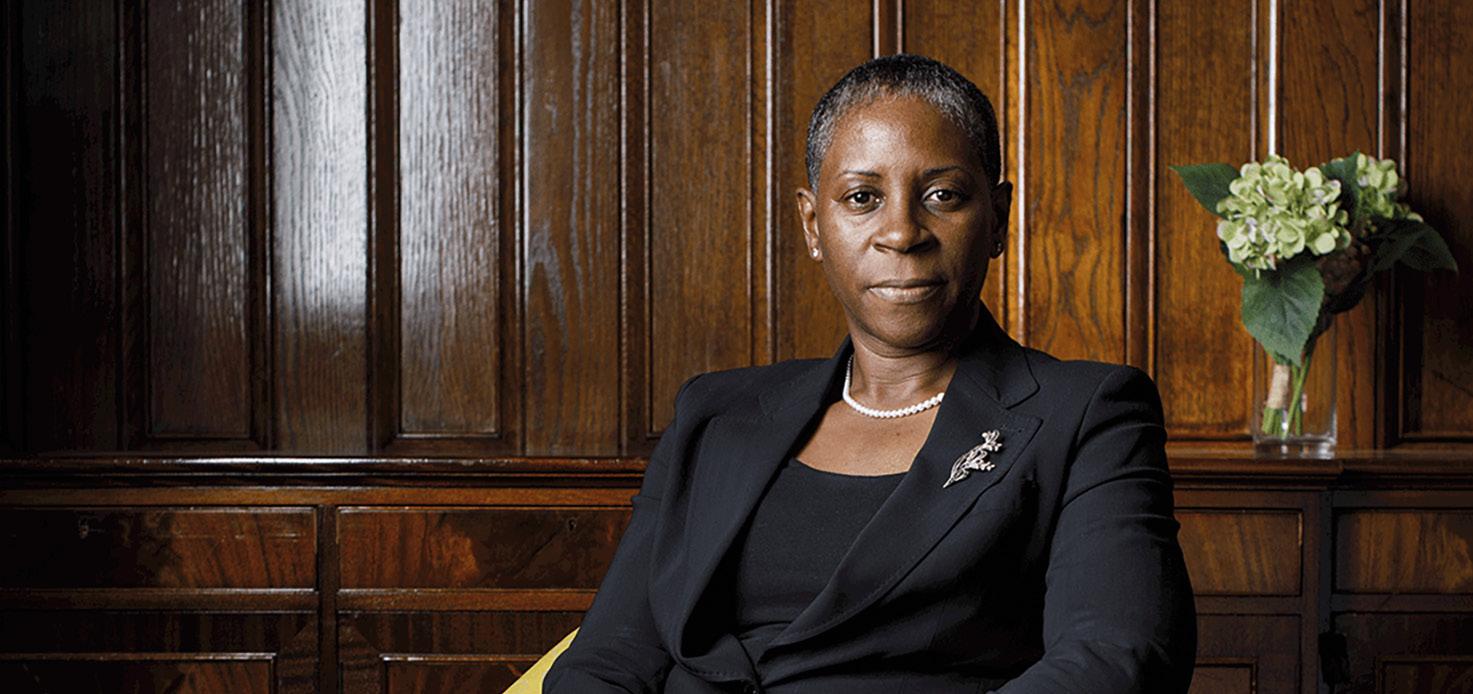
I DREAMED OF BEING A LAWYER, BUT I KNEW NO LAWYERS AND HAD NO SOCIAL CAPITAL.
Within a couple of days of graduating from high school
I was back in the UK, because this was the jurisdiction where I wanted to study law. However, I realised that my high school diploma might not be recognised, so I did a lot of research to figure out how I might get back on track with the legal career I dreamed of. I took an evening course, which enabled me to go to university, supporting myself by working as a postwoman, and then for British Rail. There was me, selling tickets to smartly dressed people heading off into the City, but I could feel that my dream was within my grasp.
IT ISN’T IN MY DNA TO GIVE UP.
I qualified as a solicitor and, having gained experience and a master’s degree, was successfully nominated to the Law Society council, from which the presidency is drawn. I became the representative for the women lawyers division,
and put myself forward for the presidency for the first time in 2015. I was rejected, as I was for the next three years. Some people said that we would never see an ethnic minority person as president of the Law Society, while others commented that they wouldn’t vote for me because I’d get frustrated by the workings of the organisation, and that they needed someone who could converse with government. The assumption was that somehow I wouldn’t be able to manage these things. But the more people told me it couldn’t happen, the more I was determined that it would. I knew that if I could get there I could really make a difference.
ALL THINGS ARE POSSIBLE IF YOU KEEP PUSHING.
Eventually, I was elected as deputy vice president, from which there’s an automatic trajectory to the presidency. I remember in the hustings
League Managers Association 63
Are you worried about yourself, a
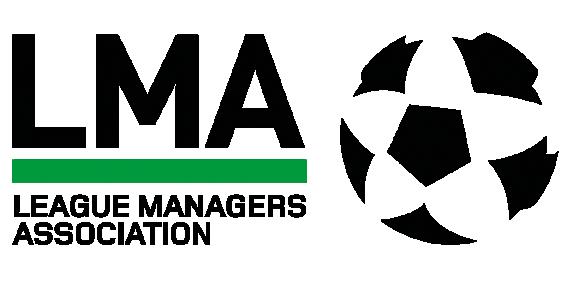
a family
or a colleague? Ask Eve
If you have concerns or would like any information on the five gynaecological cancers (ovarian, womb, cervical, vaginal, and vulval), you can contact The Eve Appeal’s nurse-led specialist gynaecological health information service. We now have translation services available, so you can talk to one of our nurses about gynae health concerns in over 250+ languages.

Phone: 0808 802 0019*
Email: nurse@eveappeal.org.uk
Website: www.eveappeal.org.uk/nurse
*Free to call from landlines and mobile phones within the UK and does not appear on itemised bills. The Eve Appeal 2023 Gynaecology Cancer Research Fund (Trading as The Eve Appeal). Registered charity no. (England & Wales) 1091708. Registered charity no. Scotland SC042612. Registered company no. 4370087
Proud partners of the League Manager’s Association
friend,
member,
About Stephanie
When I. Stephanie Boyce was elected president of the Law Society of England and Wales in 2021, she became the first person of colour and only the second in-house solicitor in almost 50 years to hold the post.
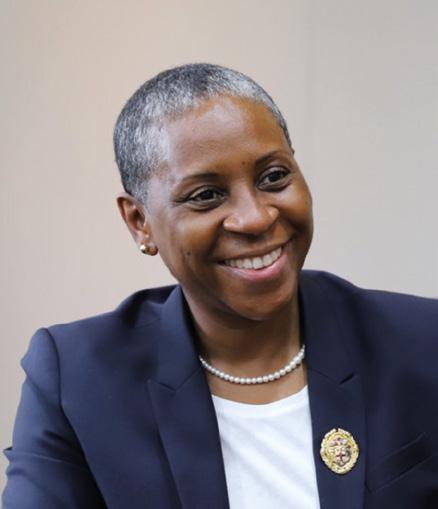
She has a wealth of experience in corporate governance, regulatory frameworks and professional regulation.
for the role I was asked what I would do to promote equality, diversity and inclusion. I said I would be visible and role model it, but at the same time I knew I would need to use the platform of the presidency to amplify those voices that had been muted up to that point. It was important that I use the position to bring about change. My mission was to leave the profession in a more diverse and inclusive state than when I found it.
THAT HAS TO BE A SHARED AMBITION.
Communication is key in that, because you have to take people with you. Everyone needs to understand what their part is in achieving that shared mission. That can start with relatively small things. For example, I have said to my colleagues that next time they’re at an event, instead of standing in a huddle talking with their backs to the room, think about the people who are there for the first time, who maybe find it difficult to penetrate that circle. Extend the hand of friendship. Ultimately, it’s about taking individual responsibility, and thinking, ‘what can I do to make a difference today and to make the future better for the people coming up behind me?’
I’M FOREVER ASKED HOW I DID IT.
How did a black woman from
a low socio-economic background, who is not privately educated – because some 23% of solicitors are, compared with 7% of the wider population –reach the top? My answer is that I listened and observed a lot, and I was determined to become the very best version of myself possible. Now I’m here, it’s important that I leave the door open for those coming up behind me. Others need to be able to see the trajectory you’ve taken, and the lived experience. There’s a trickle down effect, where people think, ‘If they can do it, so can I.’ Interestingly, the current president of the Law Society is the first Asian Muslim to hold the role.
WE KNOW THAT DIVERSITY OF THOUGHT MAKES A DIFFERENCE.
However, you can’t have diversity without inclusion. It’s not enough to be part of the group, or to be paid well, if your voice is not being heard in the boardroom, and you’re not making or influencing the decisions that affect you. That’s not inclusion, and it leads to individuals disengaging. In football, for example, it’s not enough to have lots of black football players, we need to see people from ethnic minorities in the senior rungs of the industry, as managers, CEOs and chairmen, so that the industry is actually representative of the society it seeks to serve.
League Managers Association 65 KEY TAKEAWAYS: I. STEPHANIE BOYCE
Ultimately, it’s about taking individual responsibility, and thinking ‘what can I do to make a difference today and to make the future better for the people coming up behind me?’

A creative partner for your personal brand or business venture. Amplify your audience engagement with compelling brand identities, market-leading creative assets and blazing-fast, breakthrough websites. You can consider us your team of creatives, coders and communicators. We’re in it together, striving for the same goals. We get to know you and your brand to really understand how to engage your audience. Tel: 02380 275 253 Email: hello@21six.com Web: 21six.com
CREATIVE PARTNER
YOUR
BRAND | DESIGN | WEBSITES
LMA NEWS.
League Managers Association 67 THE MANAGER
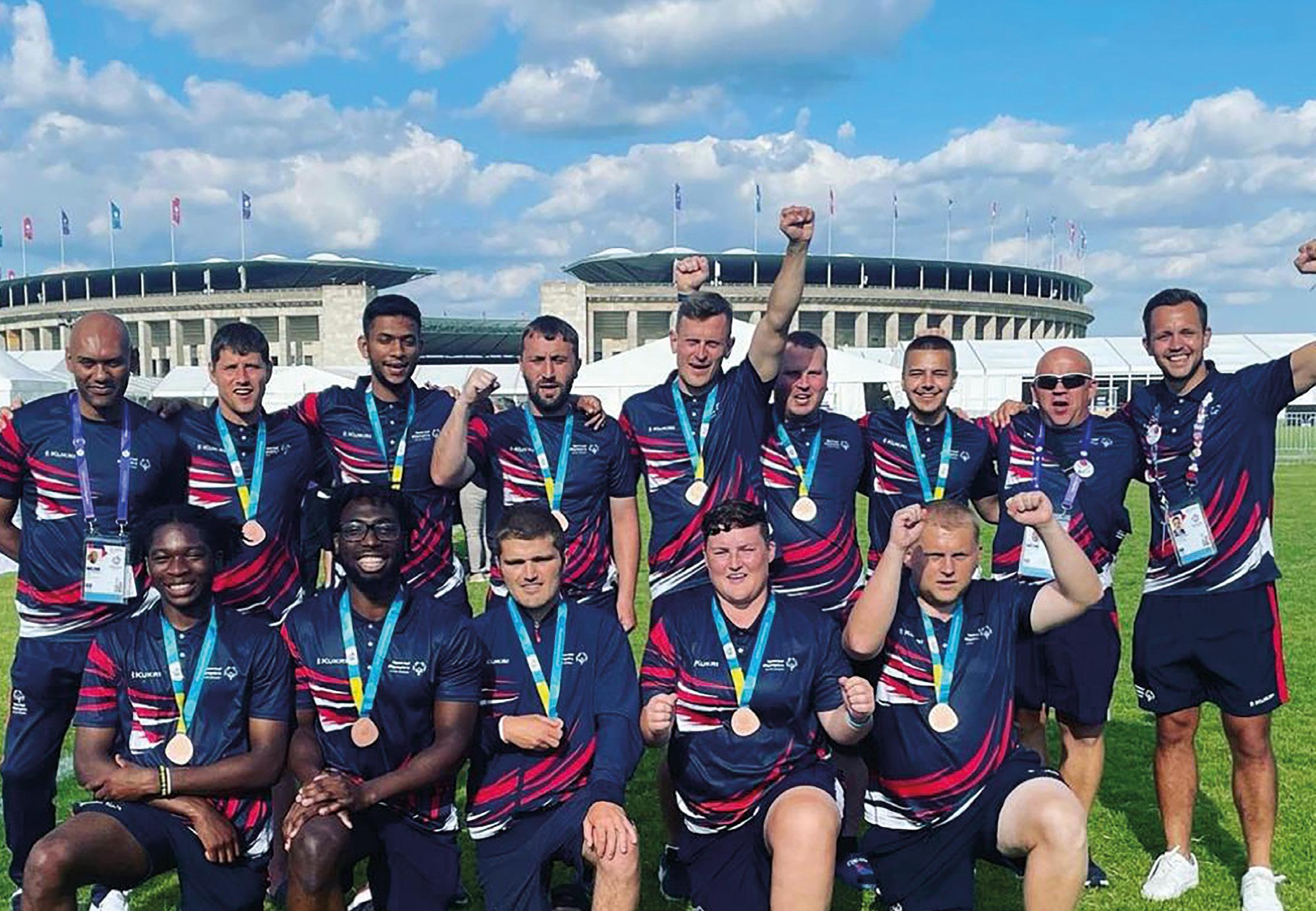
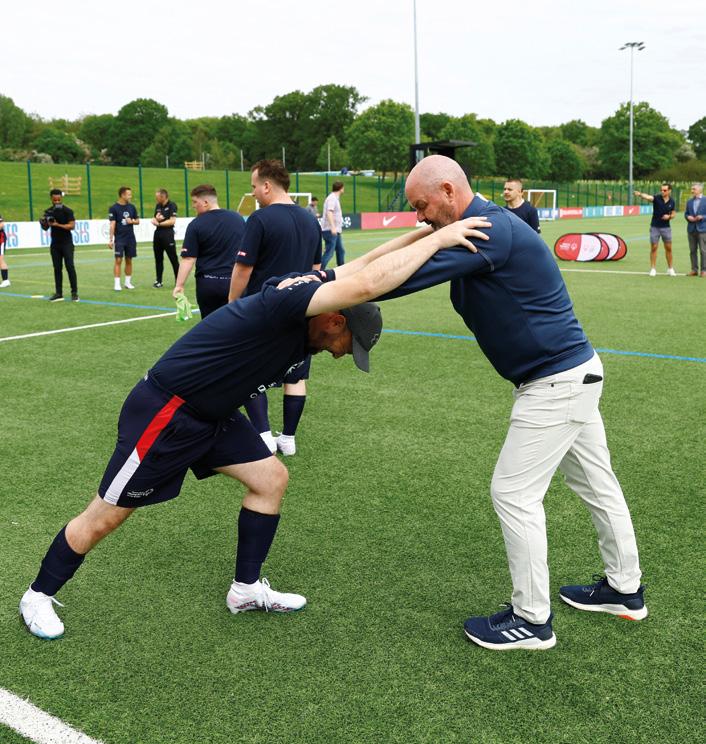
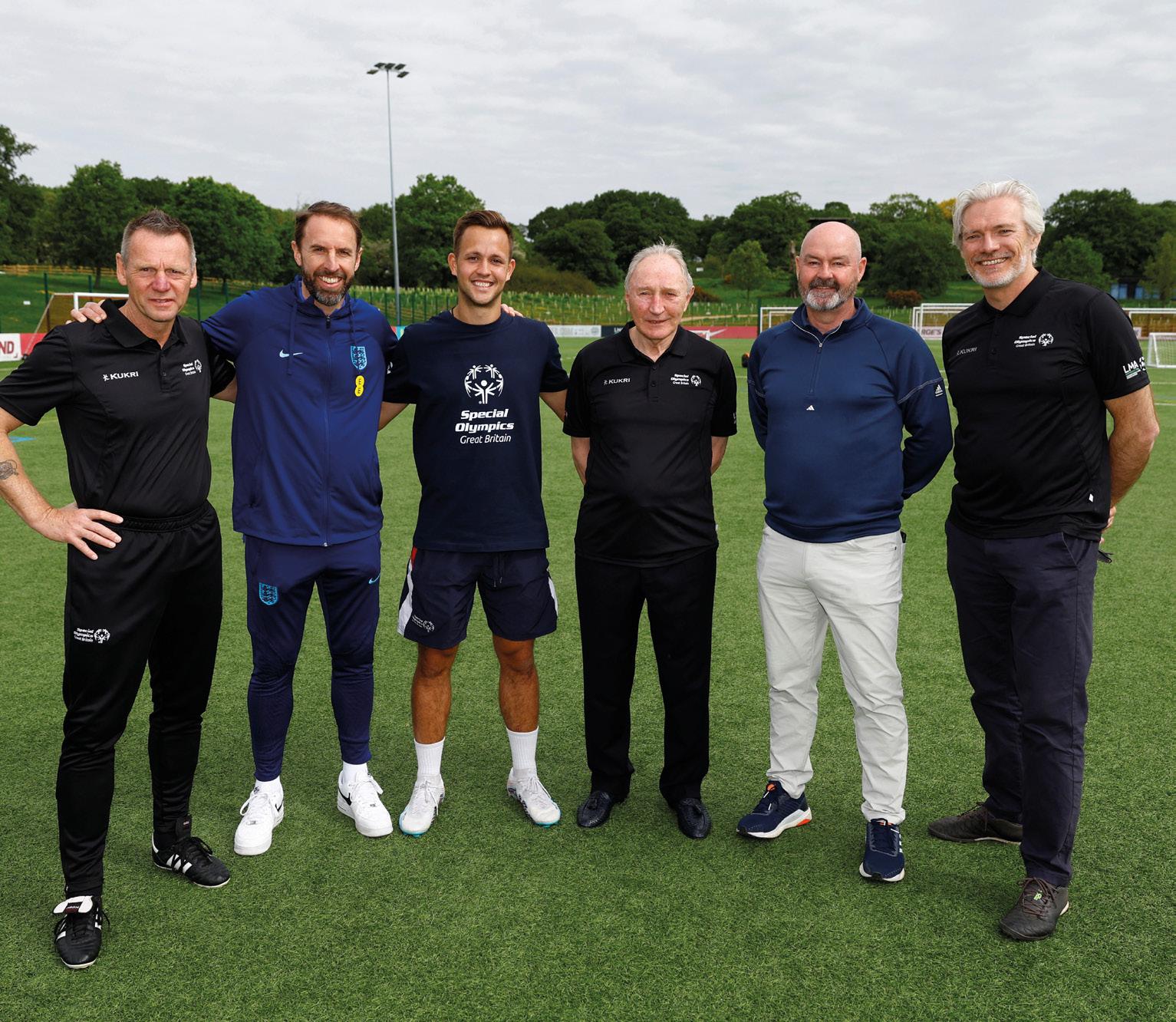

68 THE MANAGER
Photography: Katz Wizkas Photography / LOC / Annegret Hilse / Action Images
30.03.23
The LMA and its members pledged support to the Special Olympics Great Britain Unified Football team ahead of the Berlin 2023 Special Olympics World Games. The LMA’s support included provision of training and accommodation at St. George’s Park for the SOGB Men’s Unified Football Team and sponsorship of the team out in Berlin.
22.05.23
The SOGB Unified Football team, which comprises of athletes with and without intellectual disabilities, took part in their first training session at SGP. There was a surprise for the seven-a-side team, as LMA members Gareth Southgate OBE, Steve Clarke, Stuart Pearce MBE and Howard Wilkinson turned up during the team talks, and supported the training session alongside SOGB Head Coach Ben Matthews. The players also received a motivational speech by LMA Head of Performance and Olympic Gold Medallist Tim Foster MBE.
17-18.06.23
LMA Director Sue McKellar was privileged to watch SOGB athletes walk out in front of 50,000 people at the World Games Opening ceremony. She listened to an inspirational speech by Chairman Timothy Shriver and attended the unified football team’s matches against Monaco and Japan. Jürgen Klopp, Sir Alex Ferguson CBE, Eddie Howe and David Moyes provided a motivational bespoke LMA video for the team to watch.
23.06.23
SOGB Unified football team beat Germany 4-3 to win a bronze medal.
TIM SHRIVER
CHAIRMAN OF THE GLOBAL SPECIAL OLYMPICS MOVEMENT
“We reward people for doing their best. We don’t ask the question, ‘who is the best?’, we ask, ‘what is your best?’. That’s a question everybody can answer.”
SIR ALEX FERGUSON CBE
“It is a great privilege for the LMA to be partnering with the Special Olympics GB football team. The achievements of the Special Olympics movement since it was founded in 1968 by the late Eunice Kennedy Shriver, sister of President John F Kennedy, are truly outstanding.”
GARETH SOUTHGATE OBE
“I’m really excited by the concept of Unified Football. It’s a fascinating dynamic, where everybody is learning from each other, while learning how to integrate into a team.”
STEVE CLARKE
“Seeing the players on the pitch, working to improve, makes you feel so humble. The LMA is delighted to support those athletes who have been selected to represent the nation at the Special Olympics World Games.”
STUART PEARCE MBE
“I thoroughly enjoyed my first experience of watching and playing Unified Football. It’s been a pleasure to meet the players and coaches and to be supporting the team.”
HOWARD WILKINSON
“The LMA is proud to have supported Special Olympics GB for many years through the great work of Lawrie McMenemy. It was a great honour for me personally to join the athletes at their training camp at SGP.”
JÜRGEN KLOPP
“Special Olympics is an incredible organisation and I know you have all had to work extremely hard to be part of the World Games. You are a true inspiration to all of us and the World Games is now your stage.”
EDDIE HOWE
“Not many footballers get the opportunity to represent their country, so this is an incredible achievement by everybody. Congratulations to everybody representing the Special Olympics GB Unified Football team.”
RICHARD BEVAN OBE
“Each year, with the support of our business partners, the LMA charity ‘In the Game’ provides backing for a number of good causes and the Special Olympics GB charity is very close to our hearts.”
69 SPECIAL OLYMPICS
LMA EVENTS & ACTIVITY.
Indeed Wellbeing Workshop Series
> PAUL MERSON // JENNIFER LACE
The LMA hosted a Wellbeing Workshop Series at the London Stadium, in association with Indeed. LMA Ambassador Paul Merson took part in a discussion panel, sharing his personal experiences of mental health.
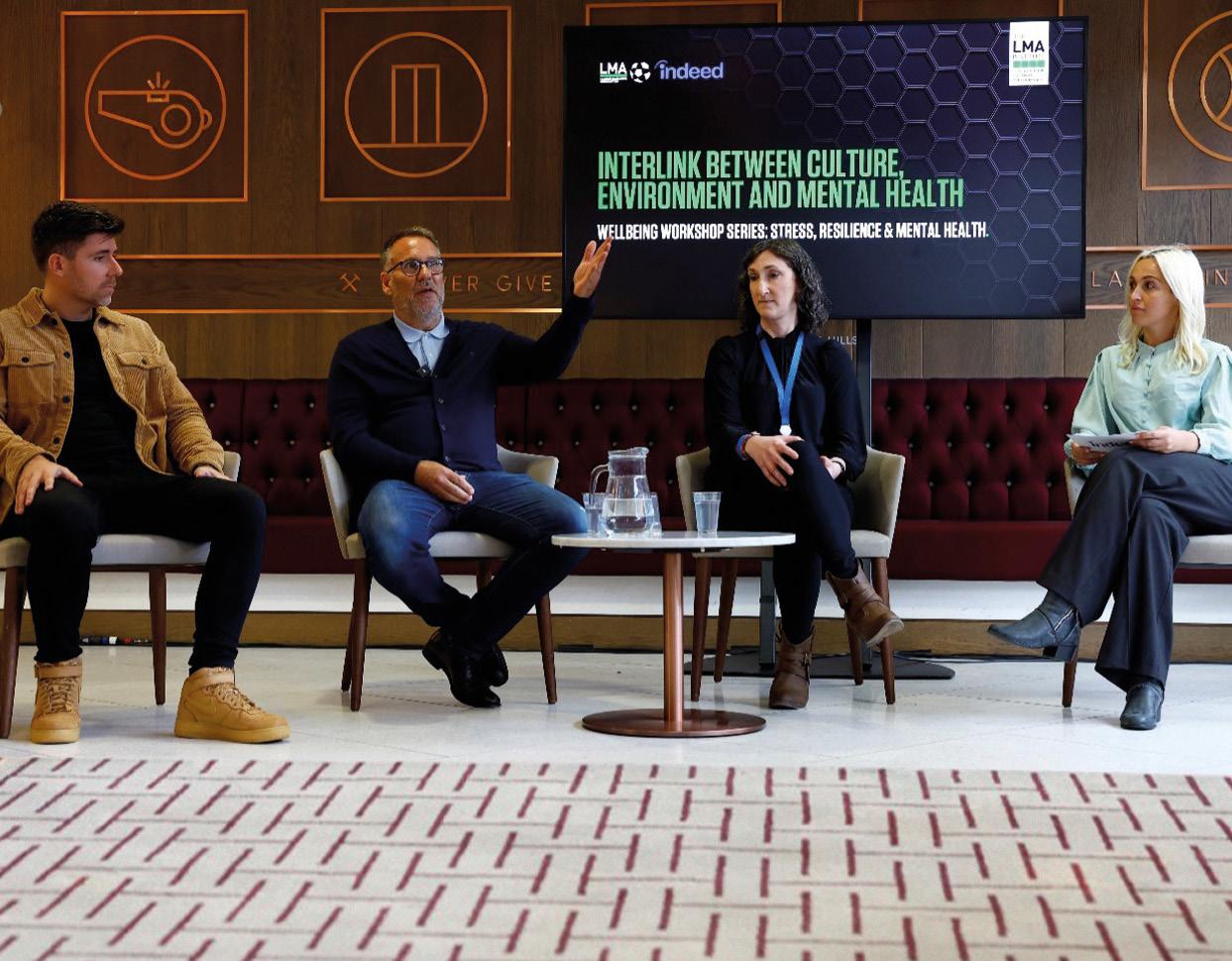
The Manager Journal 70
The League Managers Association congratulates its Chief Executive, Richard Bevan, on being awarded an OBE for services to Association Football in the Queen’s 2022 Birthday Honours List. Richard is pictured being awarded his OBE by HRH The Prince of Wales at Windsor Castle.
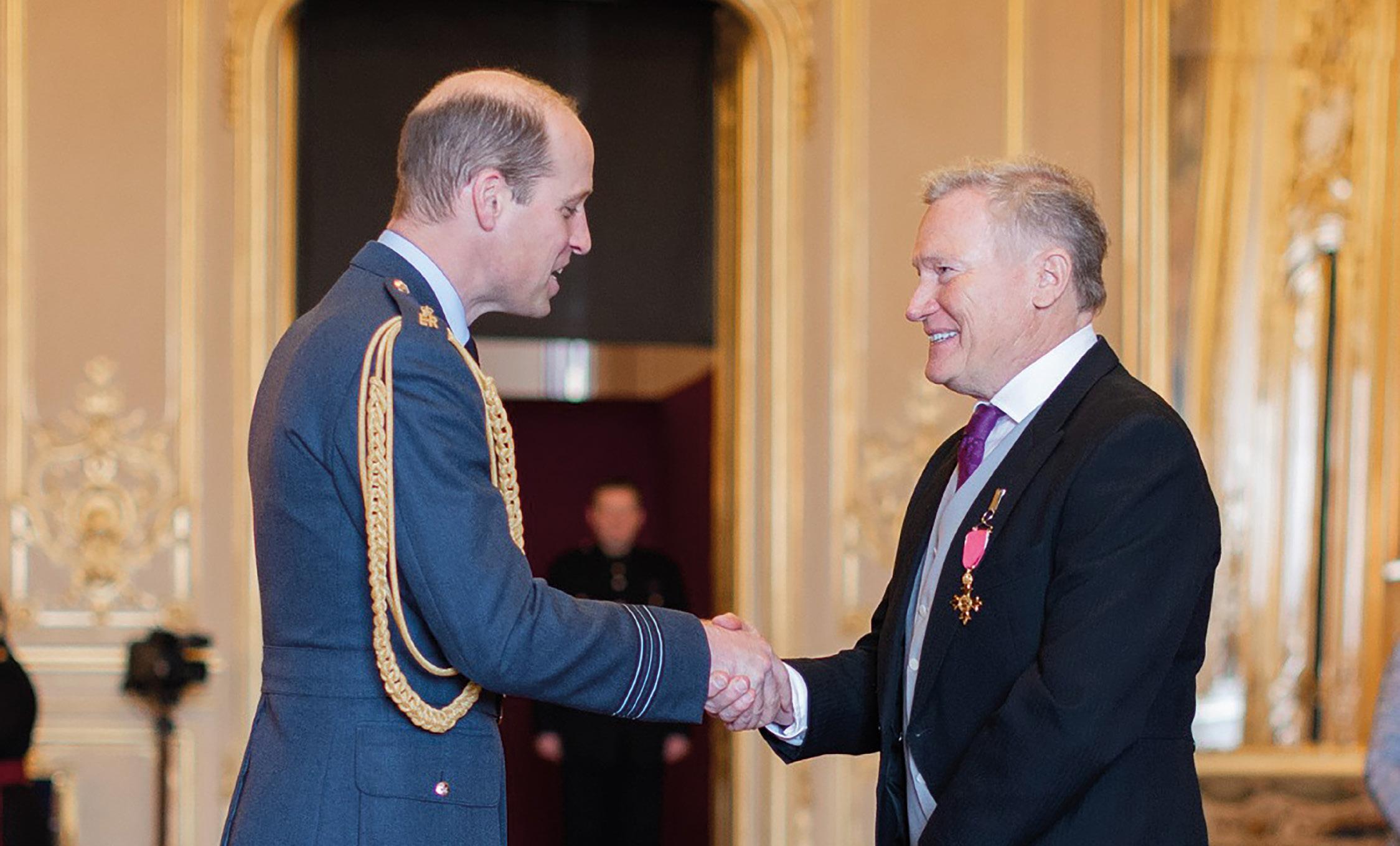
>
LMA Ambassador Martin Keown took part in a Q&A, hosted by Arbuthnot Latham in London.
 Arbuthnot Latham Q&A
MARTIN KEOWN
LMA Chief Executive Richard Bevan Awarded OBE
> RICHARD BEVAN OBE
Arbuthnot Latham Q&A
MARTIN KEOWN
LMA Chief Executive Richard Bevan Awarded OBE
> RICHARD BEVAN OBE
League Managers Association 71
Castrol B2B Premier League Hospitality Experience > EMILE HESKEY
LMA Ambassador Emile Heskey attended a dinner at the King Power stadium. He took part in a Q&A with Castrol’s international guests ahead of Leicester’s game against Liverpool.
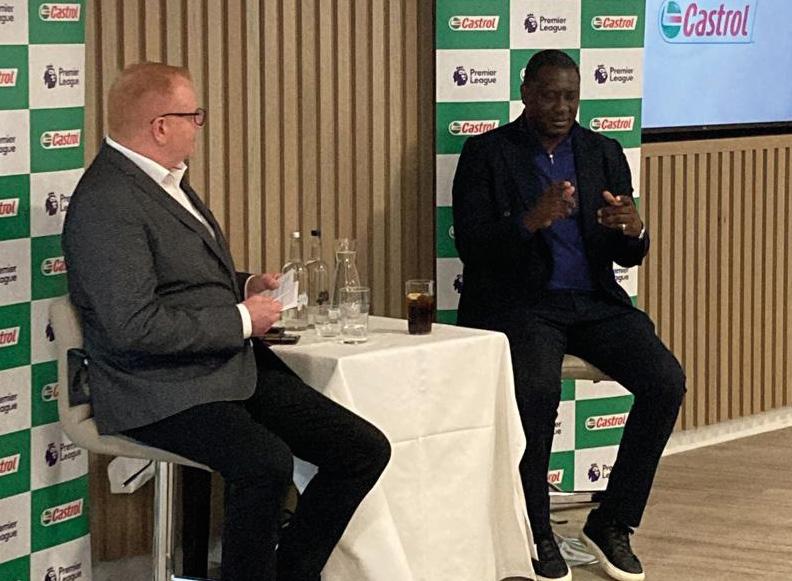
The Powerhouse Project Training Session > HOPE POWELL CBE
Nike hosted a training session at the Silver Jubilee Stadium, in association with The Powerhouse Project. The session was led by LMA Ambassador Hope Powell CBE and contributed towards the participants’ UEFA B qualification.

Nike Liverpool Kit Launch > ROBBIE FOWLER
LMA Ambassador Robbie Fowler attended Nike’s launch of the new 2023/24 Liverpool FC home shirt in Copenhagen. Fowler met with fans and took part in a Q&A.
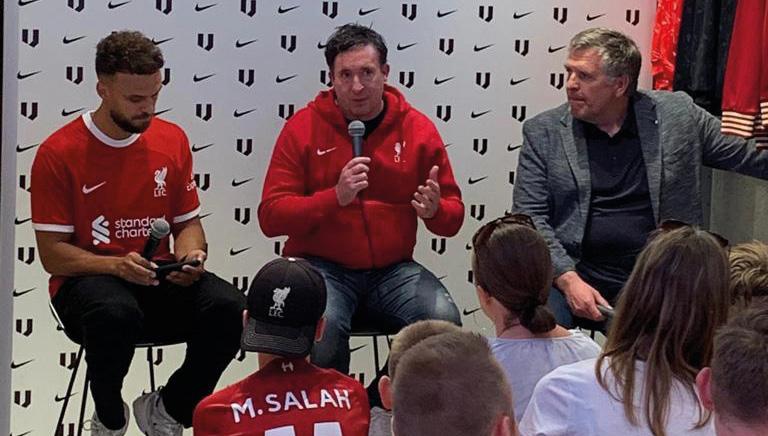
The Manager Journal 72
Castrol Asia Trophy Tour
> ROBBIE FOWLER // TEDDY SHERINGHAM MBE
LMA Ambassadors Robbie Fowler and Teddy Sheringham MBE visited Indonesia and Thailand as part of Castrol’s Premier League Trophy Tour. They attended Q&As and meet-and-greets with local fans as part of the BP/Castrol joint venture, the first of its kind.
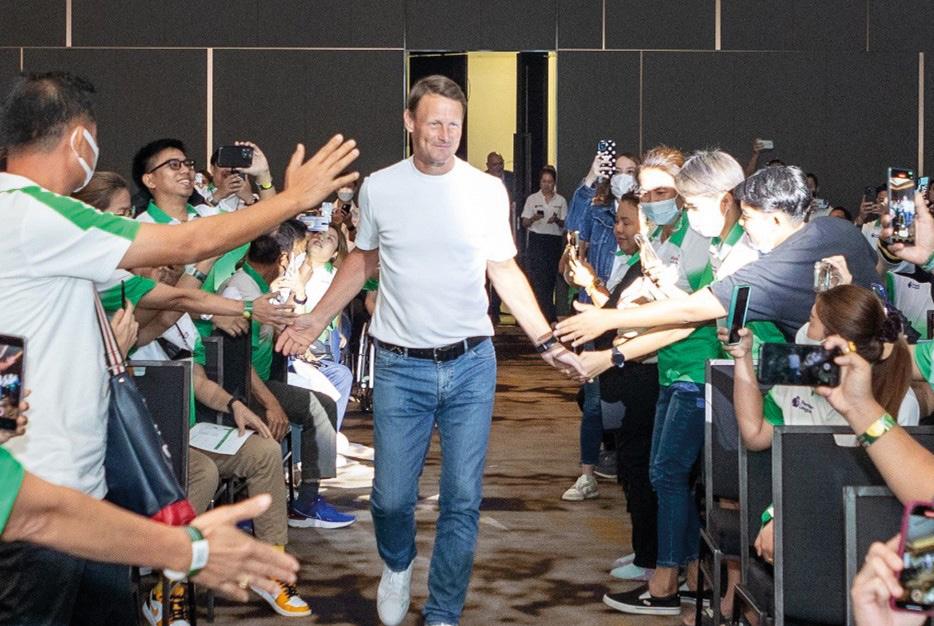
Nike and Women’s Finalissima
> RACHEL YANKEY OBE
LMA Ambassador Rachel Yankey OBE joined Nike competition winners at the Women’s Finalissima between the England Lionesses and Brazil. She took part in a Q&A and received an England shirt from the winners.
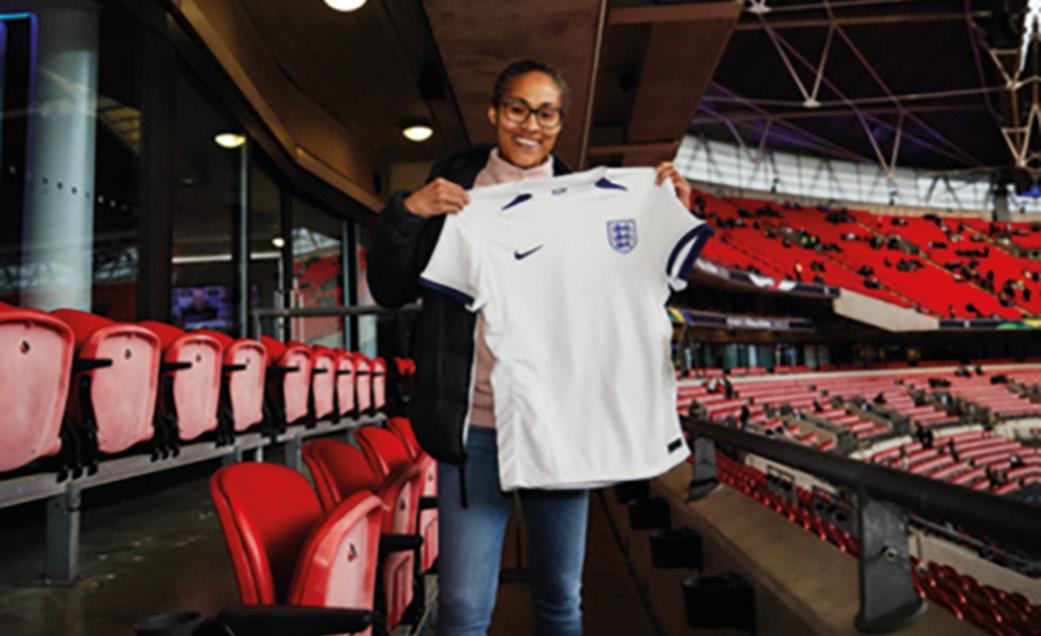
League Managers Association 73
Santander Universities Launch Event at Wembley Stadium > MICHAEL DAWSON // RACHEL YANKEY OBE

The LMA supported Santander Universities with their two year programme launch event for their new scholars. LMA Ambassadors Michael Dawson and Rachel Yankey OBE took part in a motivational Q&A on stage hosted by Clare Tomlinson.
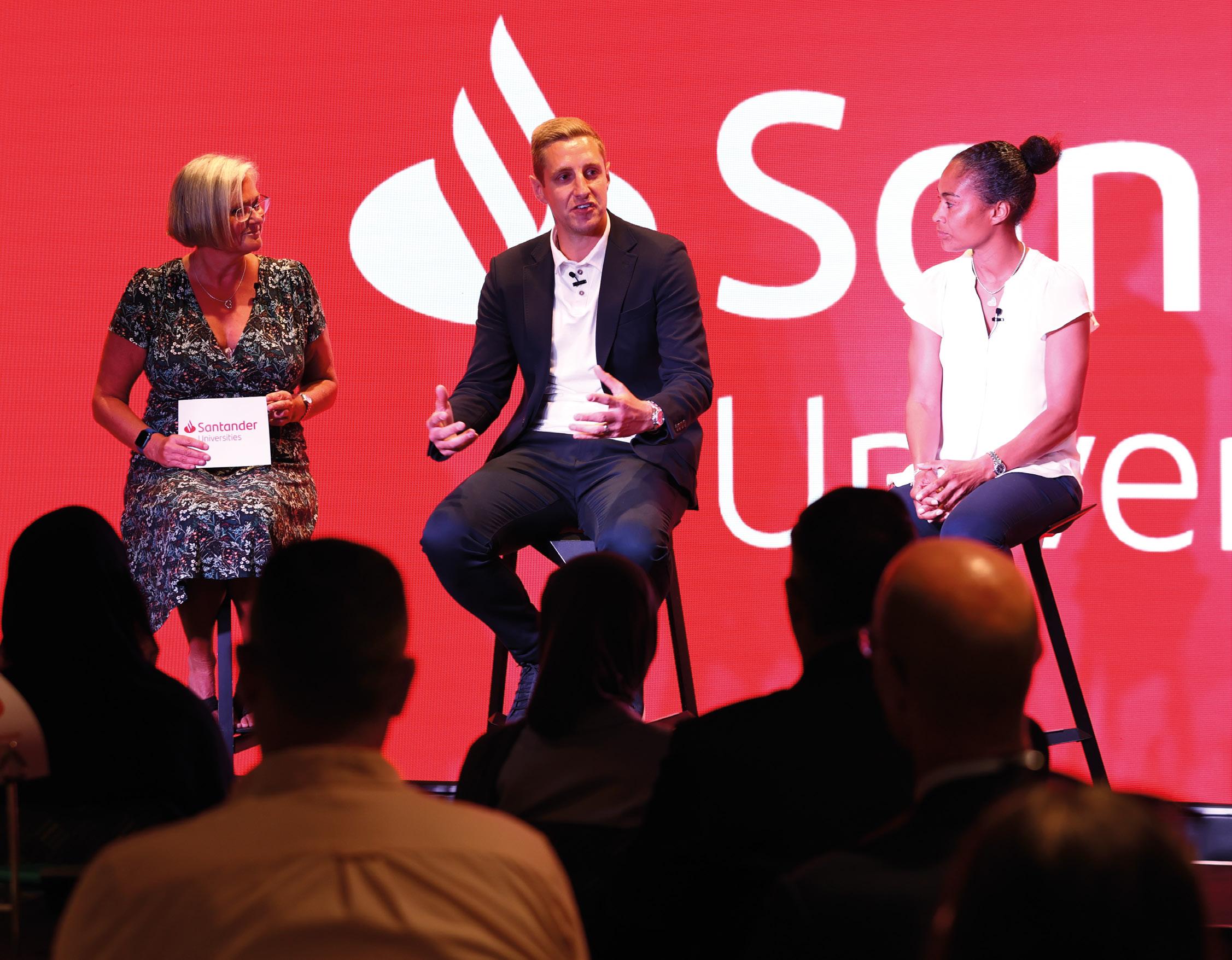
The Manager Journal 74
Baton of Hope
> SAM ALLARDYCE // KOLO TOURÉ
LMA members Sam Allardyce and Kolo Touré showed their support for the Baton of Hope campaign, meeting the baton when it arrived at Old Trafford and the Etihad Stadium, respectively. The baton’s tour of 12 cities in 12 days aims to act as a platform for suicide awareness and prevention.
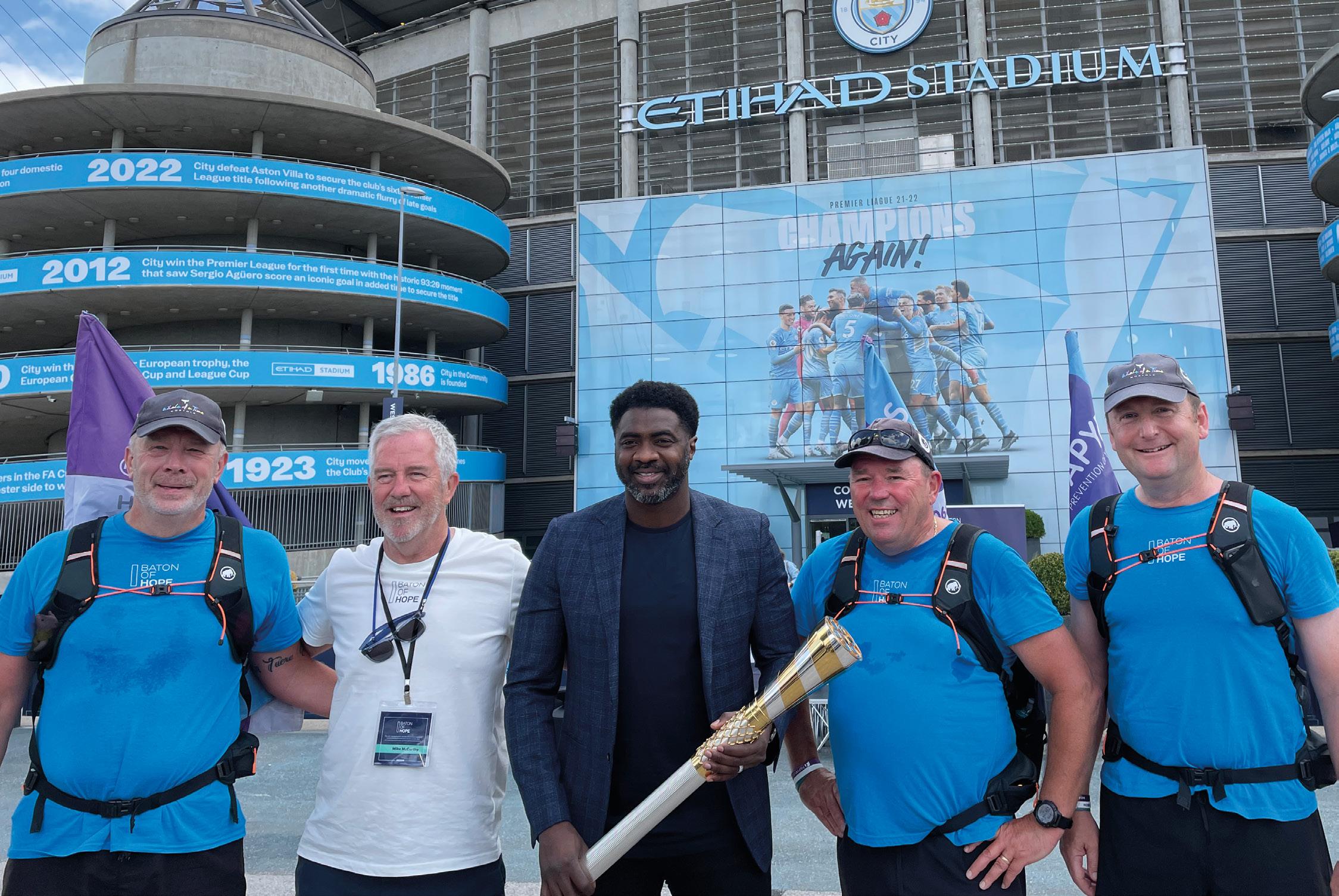
Chris Kamara Awarded MBE
> CHRIS KAMARA MBE
The League Managers Association congratulates Chris Kamara on receiving his MBE for services to football, charity and anti-racism.
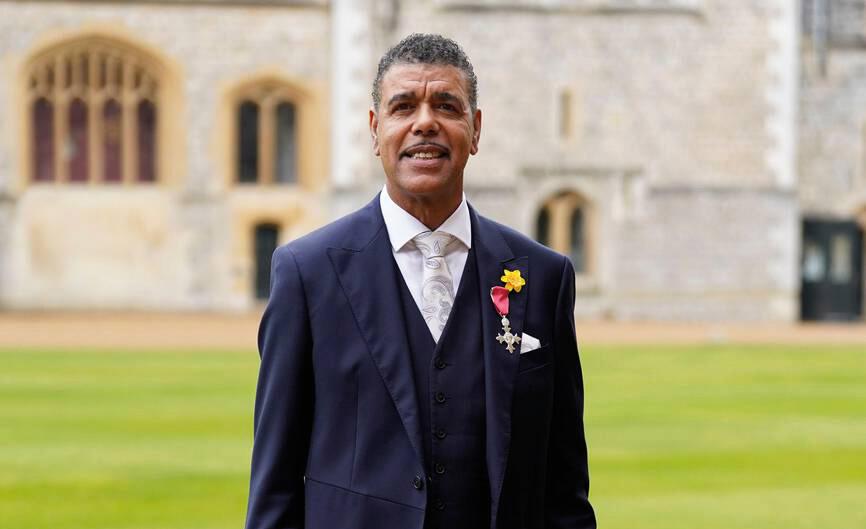
League Managers Association 75

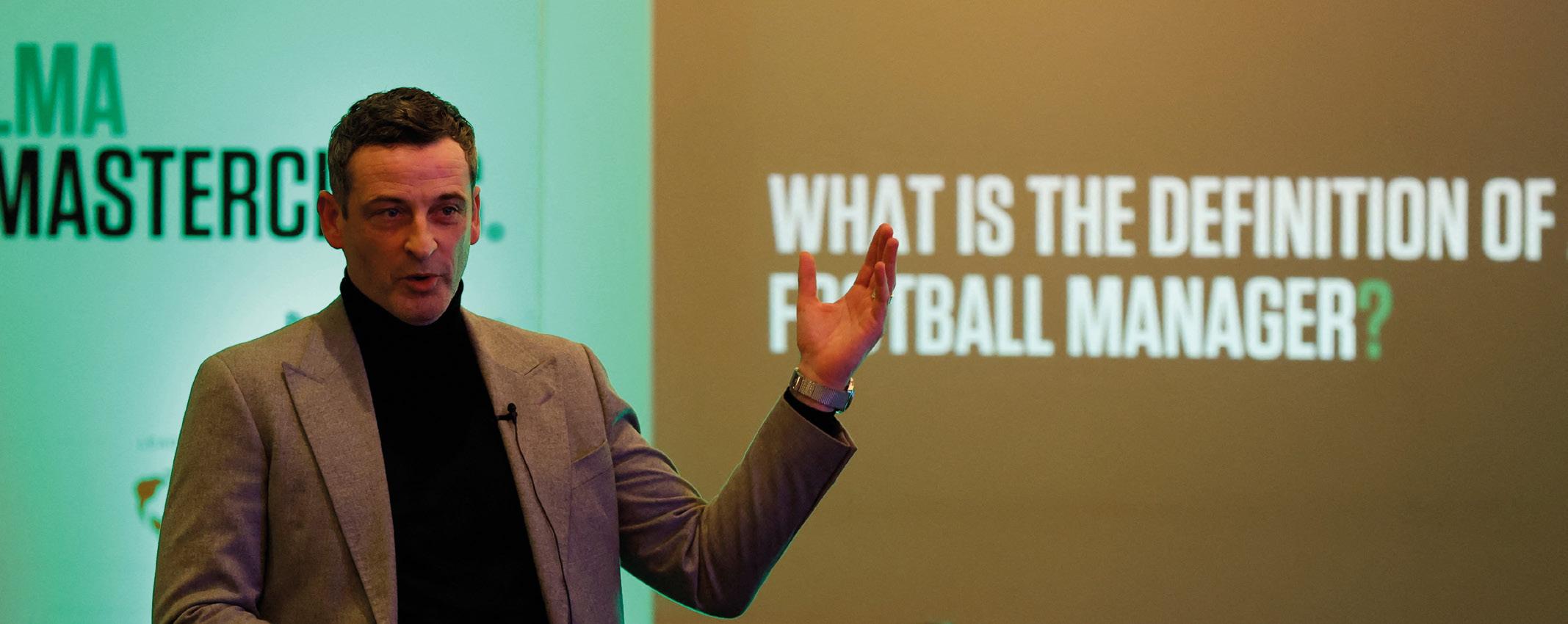
LMA INSTITUTE OF LEADERSHIP AND HIGH PERFORMANCE. 01 02 The Manager Journal 76
01 LMA Members’ Evening with Jürgen Klopp
In March, LMA members were invited to a Q&A evening at Anfield Stadium with Jürgen Klopp, hosted by Hayley McQueen. The two-time LMA Manager of the Year discussed, among other things, his time at Mainz and Dortmund before joining Liverpool, and took questions from the audience.
02 LMA Masterclass: February
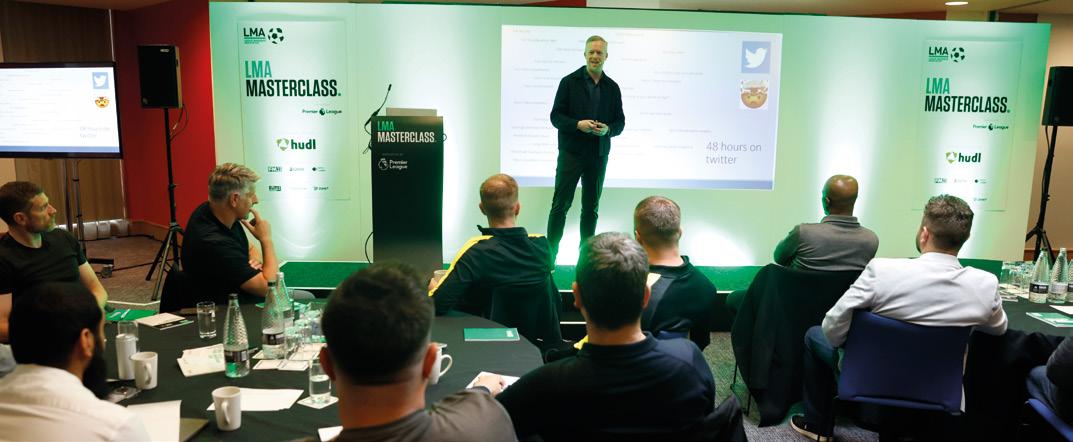
The fourth LMA Masterclass of 2022/23 was held at Twickenham Stadium. Former British Army Officer Langley Sharp MBE ran an activity-based session exploring leadership attributes and styles. In the second session, Rich Buchanan and Damian Roden from LMA Technical Partner Zone7 looked at how artificial intelligence can assist football managers in making better player load management decisions. Finally, LMA member Jack Ross gave a presentation on the role of a manager, using his lived experience to discuss whether success is defined by the process or the outcome.
03 LMA Masterclass: May
The final LMA Masterclass of the season took place at St. George’s Park. Oliver Patrick explored the topic of energy as the ultimate marker of an effective lifestyle strategy. This was followed by a practical session from Dr Chris Pocock and his team at the University of Chichester on the theory of visual exploratory activity (scanning) in practice environments. The day concluded with a panel discussion – with LMA members Nathan Jones and Rehanne Skinner, and LCA member Ryan Maye – on the future of coaching and elite football.
04 LMA Insights Webinars
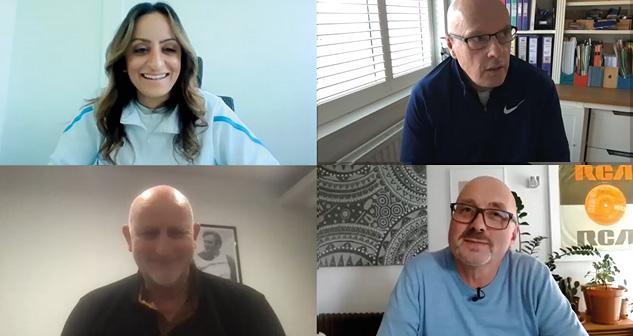
Three Q&A-style webinars were hosted by Jeremy Snape, Founder and Director of Sporting Edge, the first of them with former All-Blacks captain Kieran Read. I. Stephanie Boyce, the first President of colour of the Law Society of England and Wales, shared her story of resilience and perseverance. Former Detective Inspector Ash Farrington, meanwhile, described his experience of burnout as a result of his highly stressful job. Clinical psychologist
and neuroscientist Ian Robertson also delivered a presentation on confidence, explaining how we can physically change the brain to lift confidence, reduce stress and increase motivation.
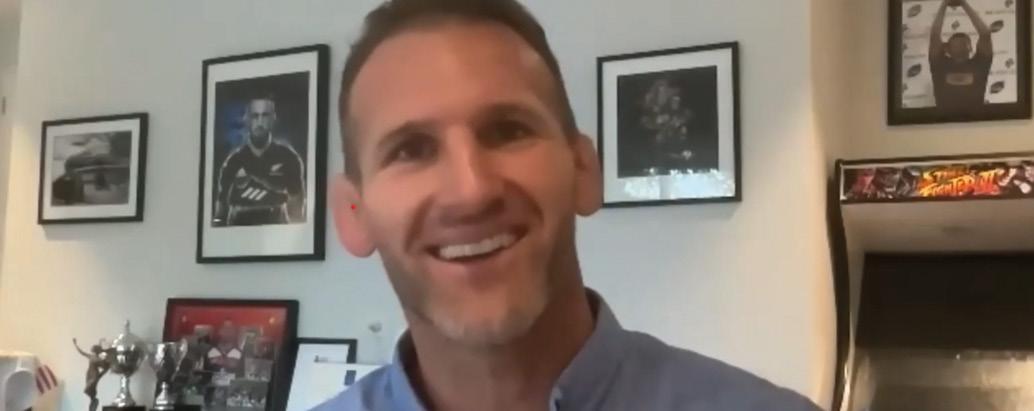
05 LMA Technical Sessions
Technical online sessions were held on: Transitioning Players from the Academy to the First Team; Talent ID: Process and Practice; The Role of the Fourth Official with the PGMOL; and How AI Can Assist Management Decisions, with LMA Technical Partner Zone7. All online content can be viewed on the LMA Platform. Email natalie.bowles@ leaguemanagers.com for help accessing this.
06 LMA Diploma in Football Management
The 2022/23 edition of the LMA Diploma in Football Management held its final two in-person sessions at St. George’s Park, looking at creating a high-performance culture and building a backroom team. Students delivered their final presentations at Liverpool University in June.
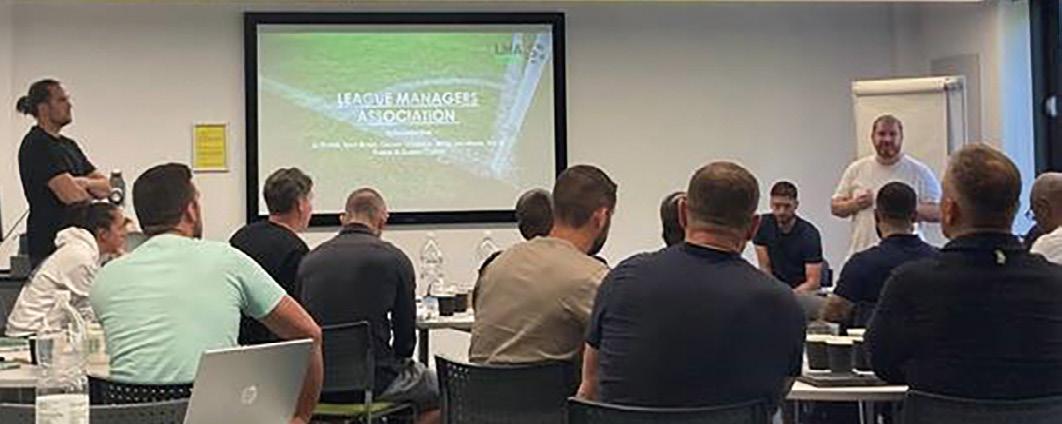
03 05 04 06 League Managers Association 77
RICH BUCHANAN

















READY TO COMPETE.


Zone7’s Rich Buchanan explains how artificial intelligence is helping to improving player availability.
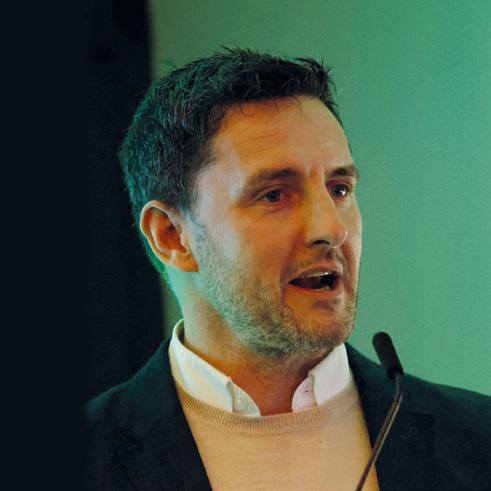




The Manager Journal 78 THE MANAGER
Player availability, or keeping players injury-free and ready to perform at their best, is of prime importance to every football club. Indeed, studies suggest individual player availability may be more important than each player being at their individual level of peak performance.
To give some recent examples, Napoli SC won their first Serie A title in 33 years on the back of increased player availability from the previous season (300-plus more days available, to be specific). Similarly, LAFC, who claimed both the MLS Cup and Supporters Shield in 2022, experienced 350 fewer ‘player days’ lost year-over-year.
To achieve this improved player availability, the relationship and communication between the manager or head coach and their performance and medical staff is of critical importance. In essence, the performance director must be able to interpret what the manager or head coach wants and then pass it on to the performance and medical team, and vice versa.
The introduction of quantitative metrics, KPIs and standardised reporting across these groups is one way to improve coordination, collaboration and, ultimately, player readiness and availability.
Zone7’s work with leading organisations, such as the Premier League, MLS, Serie A, LaLiga, NBA and NFL, has led to the launch of Zone7 Audit, Pro and
Elite data services. These packages support managers, coaches and their performance staff seeking a more data-informed approach to highperformance.
As part of the audit service, Zone7 gives clients daily data flow emails and a monthly report, covering critical performance metrics like injury rates, days lost to injury, and the frequency of high, medium and low injury risk alerts, as well as information on what training actions drive increased risk patterns.
The objective information that these provide can be used across the entire organisation to make better decisions around training, squad management and game play. Using this data also makes it easier for managers to engage with sports science and medical teams on a deeper level than simply who can or can’t play.
Another advantage is that it provides managers and coaches with data on performance beyond just match results. In a highly fluid labour market, any stand-out data related to player availability performance can be important in enhancing their profile.
Zone7 Pro services go a step further, ingesting performance data daily and using AI to identify patterns. It can forecast injury risk and provide workload management suggestions, enabling managers and their wider teams to be smarter with training design and manage their playing squads accordingly.
Working with Zone7 Elite services also gives managers and coaches data on performance beyond just match results. They are better able to understand the physical reasons behind specific injuries, compare training periodisation models, and analyse the impact of different game schedules at different times of the season, and the effect of international football breaks.
Zone7 has been adopted by teams operating in the Premier League, Championship, and Scottish Premier League, as well as internationally, all of whom have benefited from improved availability within their first season.
Former Rangers’ Head of Performance Jordan Milsom adopted the platform for live use from the start of the 2020/21 season, recognising that keeping Steven Gerrard’s squad as fit as possible would be essential to reclaiming the SPL title. This insight proved true, with Rangers’ 52 per cent reduction in injuries from the prior season contributing to their convincing 25-point margin of victory. Gerrard, Milsom and his staff were, alongside a host of other important factors, empowered by Zone7’s tools to oversee player workload management with greater depth of data insight than in previous years.
Player availability is ultimately crucial to the success of every football club and data can be a critical lever to achieve it.
To learn more, please contact Rich Buchanan: rich@zone7.ai
League Managers Association 79
COUNTING THE COST OF THEFT.
While home insurance can’t prevent a burglary, it offers peace of mind that stolen possessions and related damage are covered if the worst happens.

80 The Manager Journal THE MANAGER
Many sporting professionals have been forced to increase security at their homes due a rise in break-ins by highly organised burglars.
Organising specialist high-net-worth home insurance for high-value properties and valuable home contents is essential. This financial security is important given the additional expense of high-value home security, such as 24/7 manned security and alarms, panic rooms and surveillance technology.

Lee Partner, Head of Commercial and Private Clients, Kerry London, said, “Using a specialist broker to help calculate the current value of someone’s buildings, contents, jewellery, artwork and antiques, helps to ensure that possessions and valuables are fully covered in the event of a burglary.”
When you use a high-net-worth specialist, a personal insurance advisor manages the complex process of insuring properties and possessions, and provides the highest level of personal claims management. They will also have access to leading risk management companies, who can advise on how to manage ongoing security concerns.
Kerry London Private Clients can arrange individual or combined policies under one policy, including buildings, contents, fine art and travel. Making a claim is a stressful experience, so their in-house claims team manage the process from start to finish and provide a personal, prompt response.
Contact Kerry London for expert, personal advice on your insurance needs: on 0208 225 1000 or email lma@kerrylondon.co.uk
ADVERTORIAL FROM 81





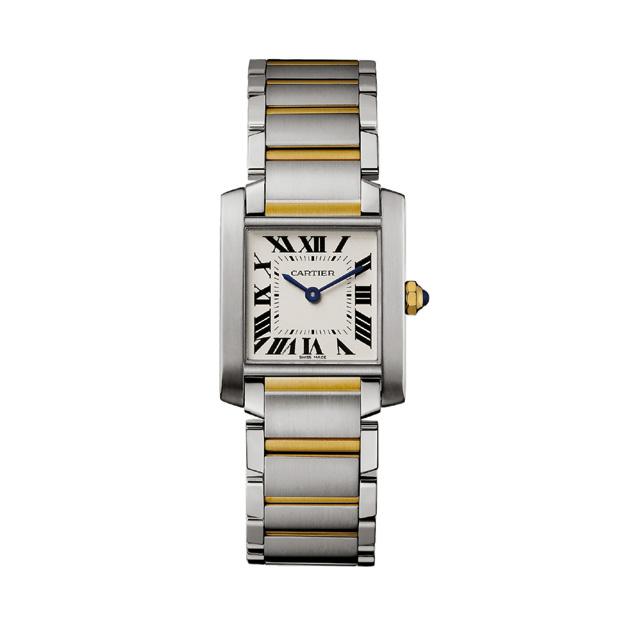

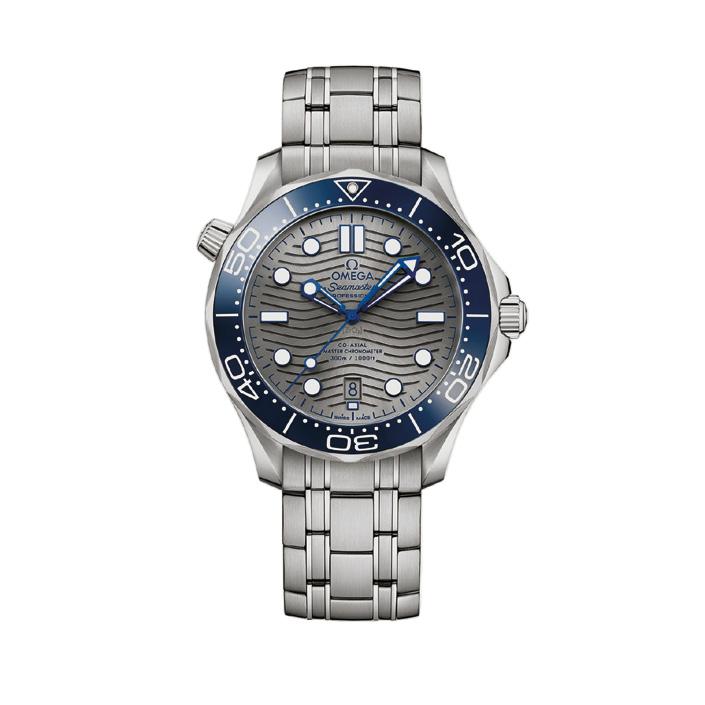





To take advantage of this offer please contact Karl Bailey 07795 398 735 karl.bailey@mappinandwebb.com mappinandwebb.com ALL LMA MEMBERS & LMA PARTNERS RECEIVE A 10% DISCOUNT ON OUR RANGE OF SWISS WATCHES, AND 15% DISCOUNT ON FINE JEWELLERY AND ELEGANT GIFTS (EXCLUSIONS APPLY).
PERSONAL WELLBEING & PERFORMANCE.
League Managers Association 83 THE MANAGER
PERSONAL WELLBEING & PERFORMANCE COLUMN
 Patrick
Patrick
AN ACTIVE ROLE IN ENERGY MANAGEMENT.
Energy management is not a passive process, it requires positive actions in everything from our physicality and emotional relationships, to our mindset and purpose.
Oli
The Manager Journal 84 THE MANAGER
When people think about energy, they tend to think in terms of feeling awake and alert, but it’s much more than that; it’s about whether your immune system is working well and you can shake off a bug quickly; it’s about concentration and problem solving; and it’s about whether you can manage complex relationships, even when they demand a lot but don’t offer much reward. Essentially, how energised you are affects whether you can lead the kind of life you want to lead or whether you are limited constantly by a feeling that you haven’t enough gas in the tank.
Exercise lies at the heart of physical energy, not least because by doing more cardiovascular or aerobic exercise we can make more mitochondria, the body’s batteries. But exercise is also incredibly important in suppressing the stress response and in enabling quality sleep by creating fatigue that enables us to get into better sleep cycles.
Most of us get insufficient sleep, but also often inadequate sleep. Certain things are important here. It requires discipline around the timing of sleep, exposure to light and darkness, and caffeine and alcohol. We also need to banish blue light and find some kind of transition between work and play. If you’re not waking up feeling restored of energy, it may be time to look at each of those areas and find ways for improvement.
However, it’s not only sleep that we need to focus on in order to manage our energy better. Recovery is key, and it can’t be viewed as a passive process, where it’s enough to simply take yourself out of a stressful situation. Recovery requires active, consolidated thought. It requires the body to believe that there is no threat to it. Breathing exercises, meditation, play and humour can all help to trick the brain into this belief. As well as a focus on quality sleep, we need to build recovery into the course of the day.
It’s not only sleep that we need to focus on in order to manage our energy better. Recovery is key.
League Managers Association 85 PERSONAL WELLBEING & PERFORMANCE
At Arbuthnot Latham we have a dedicated team who focus on sports professionals at every stage of their careers. The breadth of our service offering across banking, lending, financial planning and investment management means we can help you, your family, and your business interests.

Speak to one of our experts:
Alex Wolahan-Black
Head of Business Development
Direct: +44 (0) 207 012 2338
Mobile: +44 (0) 7557 441317
Email: AlexWolahan-Black@arbuthnot.co.uk
Bhavick Patel
Senior Private Banker
Direct: +44 (0) 207 012 2732
Mobile: +44 (0) 7741 198307
Email: BhavickPatel@arbuthnot.co.uk
On life’s journey we’re here to help you go further
Through various controllable actions and behaviours, we have the opportunity to create more energy. Exercise and recovery, including sleep, are vital, but you’re also the product of your diet – have you eaten foods rich in nutrients and energy or those that offer false rewards, such as sugary processed foods? What about the way you think – do you think positively about things or do you have a tendency to criticise yourself whenever you

do anything? Finally, and to a lesser degree, your immediate environment will play a part in your energy – the lighting, noise and pollution, and the culture and people around you.
Because these five domains affect everything to do with your wellbeing, energy is a great indicator of that wellbeing. It tells you whether you’re getting the balance right between the positive and negative actions
that you’ve taken. If you don’t feel optimised in terms of energy, look at how you might remove habits and behaviours that rob you of energy in those five domains and look to build on those that give you more.
Wellbeing Consultant Oliver Patrick has 20 years’ experience in delivering, creating and governing executive health screens, advanced health assessments and corporate wellbeing facilities.
League Managers Association 87
Words: Alice Hoey
HOW TO: DO AEROBIC EXERCISE.
SAFETY FIRST.
It’s worth seeking the advice of a doctor or medical professional before embarking on a new exercise regime or taking up a new sport. This is essential if you suffer from diabetes, hypertension, arthritis or a condition of the heart or lungs. Be aware, too, of unusual symptoms during or after exercise, such as shortness of breath, dizziness, or pain in the chest or shoulder. Stop immediately and seek medical advice.
SOMETHING FOR EVERYONE.
Many low-impact aerobic exercises remain accessible and beneficial for individuals who are physically limited by a health condition or who have a disability. These include swimming, cycling, walking, rowing and use of an elliptical trainer or upper body ergometer. Other aerobic pursuits, meanwhile, can be adapted to suit the ability of the individual.
88 The Manager Journal THE MANAGER
WARM UP, WARM DOWN.
At least five minutes of low-intensity exercise, such as active stretching, raises the temperature and heart rate, expands the blood vessels and increases oxygen to the muscles, minimising chance of injury and soreness. A similar cool-down period, meanwhile, returns your heart rate gradually to resting state, helping to avoid light-headedness or dizziness after exercise.
MODERATION IS KEY.
If you want to ramp up your aerobic exercise routine, aim for incremental increases in the distance or the targets that you set yourself. It’s equally vital to know how far is too far. Too much exercise with insufficient recovery time or pushing your body to the limits can backfire, resulting in injury, fatigue and an inability to resume the activity for some time.
MIND AND BODY.
While the physical health benefits of aerobic exercise are well known, it’s increasingly being recognised that it is valuable also for mental health. As well as providing a welcome mental diversion from anxious thoughts, exercise releases feel-good endorphins and other brain chemicals that improve mood and so help with mental health issues, such as stress and depression.
FEEL-GOOD FACTOR.
There are social and emotional benefits to exercise, too, as setting and achieving personal goals, exercising with others and becoming physically fitter can all help to raise self-confidence and self-esteem. Schedule time for exercise into your daily routine, aiming for 150mins of moderate activity per week or 75mins of vigorous exercise. Morning exercise is thought to have the edge in terms of weight loss, and sets you up mentally for the day ahead.
League Managers Association 89
Words: Alice Hoey
Photography: iStock

JENNIFER LACE
GO WITH THE FLOW.
Why is it that, sometimes, we feel totally immersed and confident in what we’re doing, and things just seem to fall effortlessly into place? LMA Head of Psychology and Mental Health Jennifer Lace explains what’s really going on when we’re ‘in the flow’.
90 The Manager Journal THE MANAGER
Jennifer has worked within domestic and international football for over 10 years, at football clubs and a variety of football national governing bodies, and has helped both athletes and coaches. She has British Psychological Society training through a Doctorate in Psychology and is a member of the British Association of Sport and Exercise Science as a Charted Scientist.
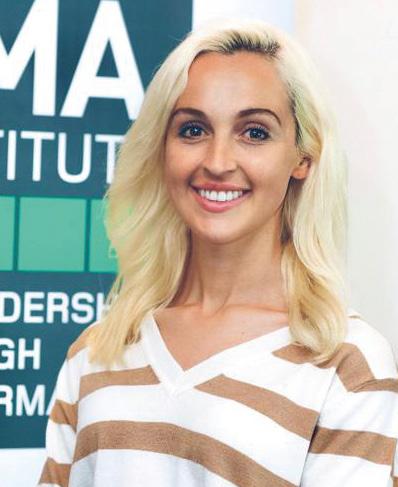
Management in the rule-bound, goal-directed game of football requires a huge amount of focus and commitment. To manage a team of athletes and staff through the complex matchday process demands vigorous psychological and physical processes. Just like the players, managers must give their very best performance on the day, interacting with a wide range of people and responding to unpredictable events, all under the gaze of the fans and media.
‘Flow’ is the name given to a psychological state that individuals report being in when they are fully in the moment of the task they are carrying out. It is often reported as being an enjoyable state, where you experience clarity of goals and knowledge of performance, complete concentration, and a feeling of being totally in tune with what you’re doing and your environment.
CHEMICAL REACTION
There are psychological and physiological elements to flow. Individuals who report experiencing this state say they feel a sense of deep relaxation, security and calm. In some cases, where physical activity is involved, people are able to focus away from any immediate pain or anxiety they may be experiencing.
In order to understand the physiological responses involved in flow, we first need to understand the Autonomic Nervous System (ANS). The ANS is made up of two branches; the parasympathetic system (rest and recover) and the sympathetic system (Fight, Flight or Freeze responses). Both ANS branches are fundamental to our existence. The sympathetic system helps to keep us alert to threats and engages the body to respond to those threats (for example, the heart rate increases and we sweat more). The parasympathetic system, meanwhile, is there to allow your body and mind to rest, relax and recover.
When someone reports being in a flow state it means they are generating just enough arousal from the sympathetic system to focus, while simultaneously engaging their parasympathetic system enough that they feel relaxed and restored. In other words, the flow state is where there is an optimal balance between a person’s sympathetic (fight or flight) and parasympathetic (rest and recovery) systems.
The Yerkes Dodson curve (see next page) is a useful model here, because it helps
Jennifer Lace
League Managers Association 91 GO WITH THE FLOW
us to visualise these changes in our physiological responses and the concept of balancing those effects to achieve flow. For example, in the first phase where attention and interest increase, chemicals such as adrenaline and dopamine are beginning to be released by the sympathetic nervous system in the adrenal gland. When too much adrenaline and another chemical called cortisol are released, we go from optimal arousal to high arousal.
People’s experience of this tends to vary, but may include an increased heart rate, sweating, headaches and shortness of breath. While these are very physiological symptoms, other effects of too much adrenaline and cortisol are less tangible, including impaired decisionmaking and aggressive behaviours.
To avoid this performanceinhibiting state of over-arousal, we therefore need to strike a balance between arousal and relaxation. There’s no one-size-fits-all solution to achieving this, but research has identified certain factors that are important in facilitating, preventing and disrupting the flow state. These include adequate planning and preparation, getting into
a good arousal state before the competition or situation in question, being focused, confident and motivated, and having positive team interactions beforehand. These factors will also have the opposite negative effect on flow state if reversed.
ON THE BALL
Of course, it isn’t only overarousal that can have negative effects; low arousal can be equally unhelpful. When someone feels too relaxed they can find it more difficult to stay focused on a task, and may miss information or cues that might be important for their own or their team’s performance. Other effects of low arousal include a reduction in awareness of movements, sights or sounds and a feeling of zoning out or disengagement, all fundamental to achieving optimal performance.
Just how detrimental over or under-arousal will be to your performance will depend, however, on what skills you need to put into action. Not all tasks demand the same level of arousal for optimum performance.
Fine motor skills, which involve precise movements, such as striking the ball at just the right angle, require low levels of optimal arousal. Gross motor skills, meanwhile, which involve
large muscle movements like running or jumping, require high levels of arousal.
Cognitive skills are thought to require something more of a balance. Too much arousal can impair decision making and memory, while low arousal can cause you to miss crucial details.
Intriguingly, experienced performers appear to need higher levels of arousal to perform optimally than their more novice or less-experienced peers. This may be because the experienced brain finds task execution simpler and therefore needs more arousal to perform those executive skills and processes. A less experienced brain is facing lots of new information and processes and so requires less arousal to maintain focus and motivation. Personality type has also been found to be important, with some research suggesting that introverts need less arousal than extroverts.
Ultimately, however, while various factors will play their part, it’s important to remember that we are all complex and unique individuals, and will therefore have our own particular zones of optimal performance. Exploring how you might reach your own personal flow state could prove valuable in achieving better, more consistent performances.
The Manager Journal 92 THE MANAGER
Exploring how you might reach your own personal flow state could prove valuable in achieving better, more consistent performances.
STRONG LOW Arousal Performance Optimal arousal and optimal performance
performance because of strong anxiety Increasing attention and interest HIGH WEAK 93 League Managers Association GO WITH THE FLOW
YERKES-DODSON LAW BELL CURVE
Impaired
10 IDEAS: CONFIDENCE.
Highlights from the LMA webinar with clinical psychologist and neuroscientist Prof Ian Robertson.

THERE’S AN OPTIMUM LEVEL OF AROUSAL.
This is controlled by chemical messengers in the brain, such as noradrenaline. When you’re bored or haven’t slept enough you are under-aroused and underperform, because levels of noradrenaline are too low. Too high, however, and the brain is over-aroused and starts to stutter. Somewhere in the middle is the sweet spot that all performers are looking for.
1
The Manager Journal 94 THE MANAGER
CONTROL YOUR EMOTIONS.
Breathing in deeply, then out more slowly, can help when you are over-aroused. It acts like a reset button when you’re stressed or anxious, changing the levels of noradrenaline in the brain and relaxing you. By practising and mastering techniques such as this you can gain more control over your emotions and therefore build confidence.
A BRIDGE TO THE FUTURE.
There are two parts to confidence – you believe you can do something, and believe that the outcome of that action will be positive. This activates the dopamine system, part of the feel-good reward system, and empowers action. Anxiety is the opposite. People who are anxious or who are made to feel helpless have far lower dopamine levels, and feel they can neither achieve something nor get a positive outcome from it.
THE OLD CLICHÉ IS TRUE.
You do have to believe you can do something to make it happen. Neurologically, when you feel confident it improves your mood, because the dopamine system reduces your anxiety and so pushes you closer to the sweet spot of performance. Confidence also motivates you to take action and therefore to succeed, which increases your confidence further. Lastly, the increased dopamine spreads into the frontal lobe and makes you sharper and better able to perform. It’s a virtuous circle.
League Managers Association 95 10 IDEAS: CONFIDENCE
2 4 3
KEEP FOCUSED.
When we crack under pressure, it’s often because our attention has wandered from positive events and experiences onto negative ones. We can manage our emotions better in potentially stressful situations, and so also our confidence, by learning to control where we direct our attention. If you have an important presentation to the board, for example, try focusing on the person who seems interested in what you have to say rather than the one on their phone.
POSITIVE SELF-TALK.
Another good way to control your attention is through the words you say to yourself, repeating positive things in an almost hypnotic way. If you can retake your attention, it’s a huge step towards regaining your confidence. Similarly, you can boost how confident you feel by how you act physically. Standing, sitting and speaking in a confident manner may feel forced at first, but it will become a habit that boosts how confident you appear and feel.
YOU
HAVE TO TOLERATE SOME UNCERTAINTY.
Confidence is about taking action, even if you might not be 100 per cent ready or sure of the outcome. It allows you to take the first step into the unknown and, once there, opens your eyes to things you wouldn’t have encountered otherwise. Anxiety, meanwhile, holds you back from action, which is why confidence is the great antidote to anxiety.
The Manager Journal 96 THE MANAGER
5 7 6
TWO SIDES TO THE STORY.
The left side of the brain, linked to the dopamine system, pulls us forward in anticipation of reward, while the right side, linked to noradrenaline, pulls us back in fear of punishment. The two sides are in constant competition, and once one half becomes more dominant it inhibits the other even more, ending in a vicious cycle. What we need for confidence is a slight imbalance towards the reward-seeking side of the brain.
IT’S OK TO BE ANXIOUS.
Self-deprication feels good in the short term, because it heads off other people’s potential criticism of you by doing it first. However, it saps confidence, and other people’s confidence in you. Rather than allowing anxiety to envelop you, take an observer view of yourself, your emotions and their physical effects. You can then harness that to build your confidence, because one of the great sources of confidence is mastering something in spite of anxiety.
EMBRACE FAILURE.
Failure is a much better teacher than success, but the mind finds it hard to learn from it, because it’s emotionally negative. If you can control your emotions and have a change mindset, rather than a fixed mindset, it makes it more likely that you’ll learn from failure and do things in spite of it. That builds confidence.
10
8
9
League Managers Association 97 10 IDEAS: CONFIDENCE
Words: Alice Hoey
Photography: Alamy
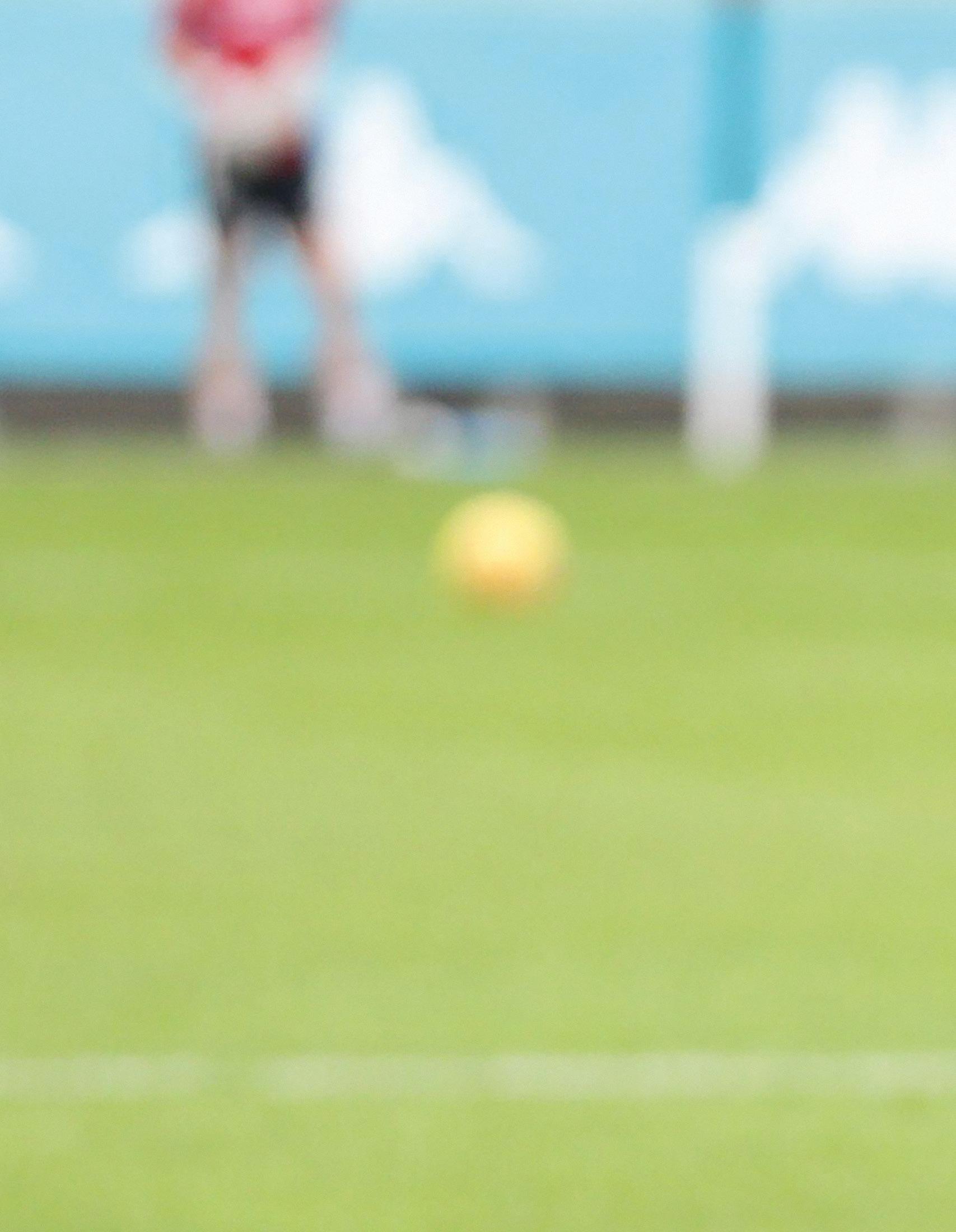
THINK BACK TO MOVE FORWARD.
If we don’t pause to assess our direction, and keep tabs on what we’re achieving and how we’re doing it, we miss vital opportunities to grow.
98 The Manager Journal THE MANAGER
LISA FALLON
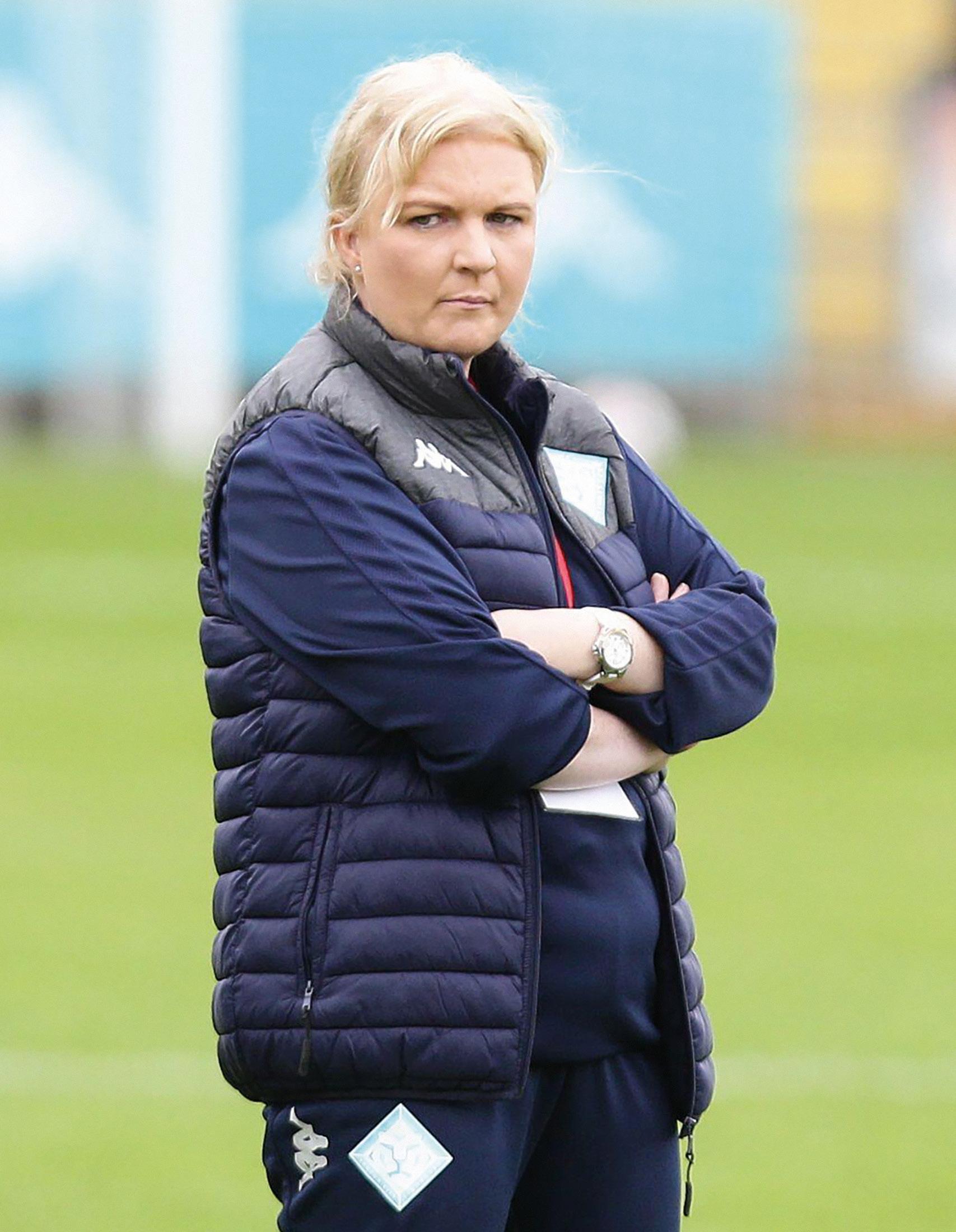
99 SELF-REFLECTION
As coaches and leaders, we understand how crucial the ‘review’ element of the ‘plan, do, review’ process is in helping our teams to improve and in implementing change. However, reflection is also an essential part of the personal performance development process.
There has been an interest for many years in the role of self-reflection in education and learning, in fostering critical thinking, embedding knowledge and developing skills. Author John Dewey defined it as “active, persistent and careful consideration of any belief or supposed form of knowledge.” J.A Moon, meanwhile, treats it very much as part of the learning process, describing it as, “a form of mental processing with a purpose and/ or anticipated outcome that is applied to relatively complex or unstructured ideas for which there is not an obvious solution.”
Most simply put, though, self-reflection is the process of purposefully and critically analysing your knowledge and experience, or thinking with a purpose, in order to achieve some deeper meaning and understanding. It is about being critical, but not negative, so that thoughts around your recent development, learning and
challenges become clearer.
UNPACK THE DAY

Self-reflection in a performance setting is often talked about in terms of embedding skills and learning in order to learn from our mistakes and experiences. Gibbs’ reflective model, for example, describes the basic process we might go through to look back over a day, to digest what happened and take something positive and constructive from it. First you describe what happened and your feelings and thoughts about it, before evaluating it (how good or bad it was) and analysing it to make sense of it. Finally, you draw a conclusion (e.g. what else you might have done) and make an action plan (next time, how might you aim to act?).
Lisa Fallon has spent most of her career in men’s football, as Team Analyst, Coach and Head Coach, including for Galway United. Currently working in FIFA’s High Performance Department and analysing performance at every World Cup, she says she finds reflection an invaluable strategic tool.
“If I have to make an important decision I’ll use SWOT analysis, or make an ideas map when I’m trying to come up with a new solution. Methods such as these
The Manager Journal 100
When you record experiences, it makes it easier to spot commonalities, where something comes up again in a different scenario.
THE MANAGER
Lisa Fallon during her time as Head Coach of London City Lionesses. Alamy
help to clarify your thoughts and I find that journaling works in much the same way. When you record experiences, it makes it easier to spot commonalities, where something comes up again in a different scenario, helps you to draw on past experiences, and enables you to better adapt to new situations.”
For Fallon, reflection is an effective way to unpack everything that has happened in the day, and to consolidate her notes and thoughts. “I’m working with an incredibly diverse range of people daily, from coaches, players and
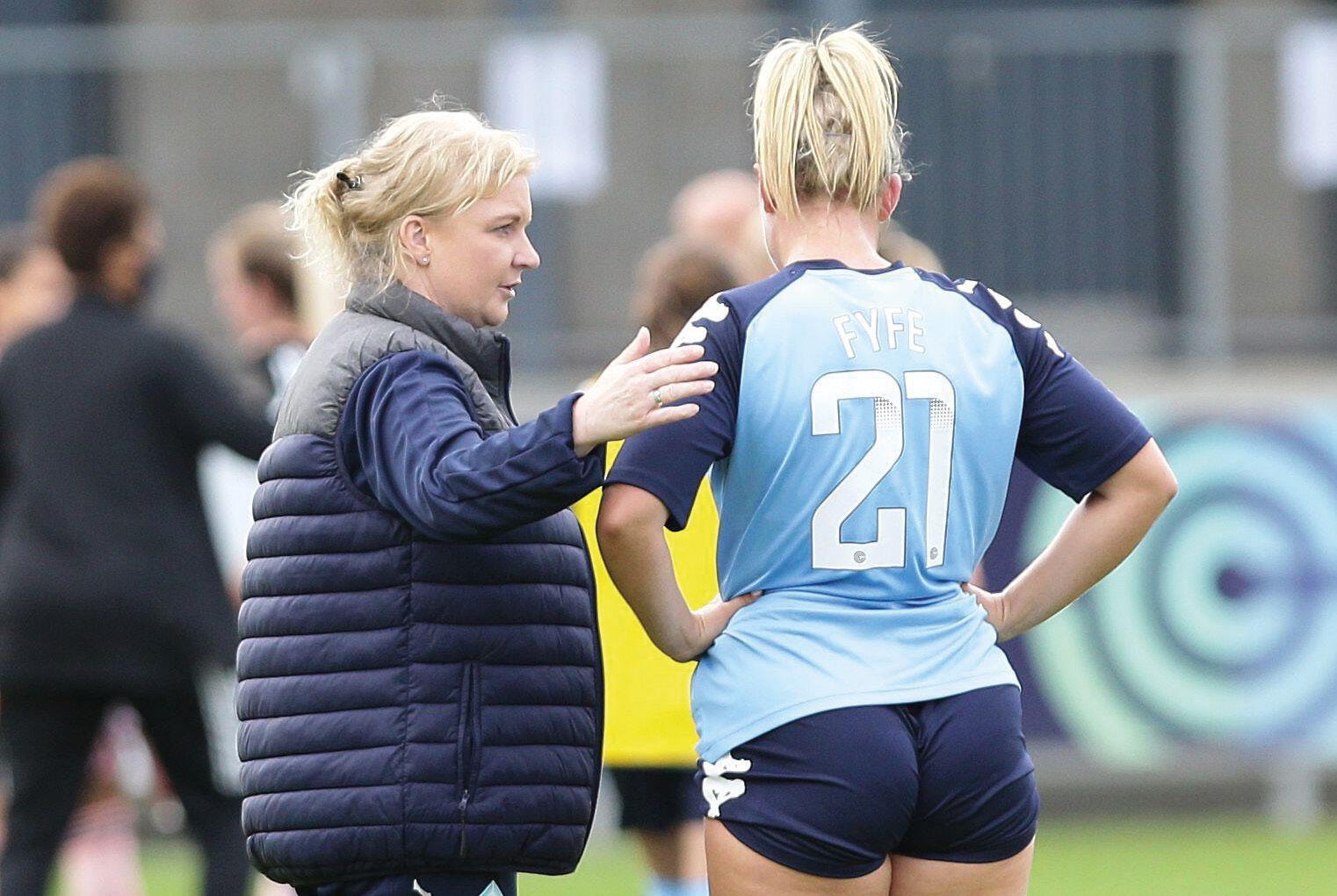
analysts to hugely successful managers, such as Arsène Wenger, and learning from the challenges they have faced and the approaches they’ve taken. Active self-reflection means I don’t lose any of that; it ensures everything is captured and, where possible, applied.”
REFINING THE PROCESS
In a learning context, the value of reflection isn’t only in its ability to strengthen your memory of the knowledge you’ve acquired, but also in enabling you to recognise how you gained it. Which processes did you go through or methods did
you use in order to acquire that knowledge or skill, and indeed which proved less effective? Reflection of this kind equips you to build your knowledge and skills base more easily and with greater purpose.
In practical terms, that might mean analysing your experience of a masterclass or workshop, noting down what you gained –the key messages you took away, the connections you made or simply the boost in confidence it gave you, for instance – as well as how those positives came about. Perhaps you were especially sociable during the networking
League Managers Association 101
break or more assiduous than usual in your preparation or note-taking.
Journaling, as we saw in Issue 53 of The Manager, is a particularly effective method of self-reflection, and that journal can be in the form of a traditional diary in continuous prose, as notes, a bullet-point list, or as a mind map. More
important than the form that reflection takes, though, is that it becomes a part of your routine and is given sufficient time and focus.
It may be helpful to create a sequence or pattern that you follow each time you journal, perhaps thinking first about the key events of the day, then interactions, decision making
or emotions. It’s important to consider within this any achievements or progress you’ve made towards your goals, as well as personal successes, such as remaining focused or calm under duress. The more self-aware you become, the more comfortable you will become at posing questions that get to the root not just of the ‘what’, but the ‘why’.
The Manager Journal 102 THE MANAGER
Self-reflection has helped me to understand myself and others better, and I try to use that knowledge to be a better coach.
Self-reflection prompts can be provided by dedicated apps, many of which guide you through your daily journaling, while mind-mapping apps can help to organise thoughts and ideas visually, giving them more structure. Psychometric testing can also be an effective method of prompting self-reflection. Although it wouldn’t be useful to take such a test more than once every year, they can be useful in prompting selfreflection, highlighting strengths and weaknesses, preferences, motivations and potential, and ultimately acting as a catalyst for self-development.
Fallon keeps not one diary, but three, one as a daily journal, another to note down ideas that she feels are particularly important or recurring, and a third for the really good stuff. “That’s a beautiful diary that was given to me many years ago, and it’s where I keep my golden nuggets, my rules and philosophies, my absolutes and red lines,” she says. “Every night I’ll make notes in my journal on events of the day, then I’ll star or highlight the most important learnings, which I’ll copy into my second-tier diary. I might decide, based on these, to try something new or adapt my approach, and if that works it
will go into my third book, my bible.”
PERSPECTIVE ON PERCEPTIONS
While self-awareness is, by definition, something engaged in by an individual, it doesn’t benefit that individual alone. A mindful, self-aware person is more likely to have the skills and inclination to reflect on how others are feeling, leading to more trusting, respectful and productive relationships.
It can also have wider and longer-term benefits in the context of diversity, because rooting out unconscious bias and inequalities starts with private reflection and selfawareness. Daily journaling should, therefore, include an analysis of the values, assumptions and biases you are aware of having demonstrated during the day, even if you believe you didn’t act on them.
This works equally well for the recipient of unconscious prejudice as a means of understanding and challenging other people’s perspectives and using that knowledge to develop emotional intelligence and change. Fallon has experienced unconscious, and sometimes not so unconscious,
bias on countless occasions.
“At times, it got to me that people wouldn’t see me as a coach and couldn’t see what I was capable of, and I felt I had to be five times better than everyone else in the room just to justify my existence. Sometimes people would pass comments unconsciously, while at other times they were intended to derail me or knock me off my stride. I had to learn to compartmentalise this, without internalising it or allowing it to affect my own performance or my ability to focus on the team.
“So, I’ll reflect at the end of the day not just on technical things, but also on how I’ve performed emotionally,” she says. “Where did any criticisms or perceptions about me come from? What lens are they seeing me through, and how did I respond to their comments?
“You’re constantly watching games and picking up the tactical stuff, but for me the greatest learning in my career so far has been around my responses to, and managing, different emotions and situations. Selfreflection has helped me to understand myself and others better, and I try to use that knowledge to be a better coach.”
League Managers Association 103 SELF-REFLECTION
The Inclusive Leadership in Football Award

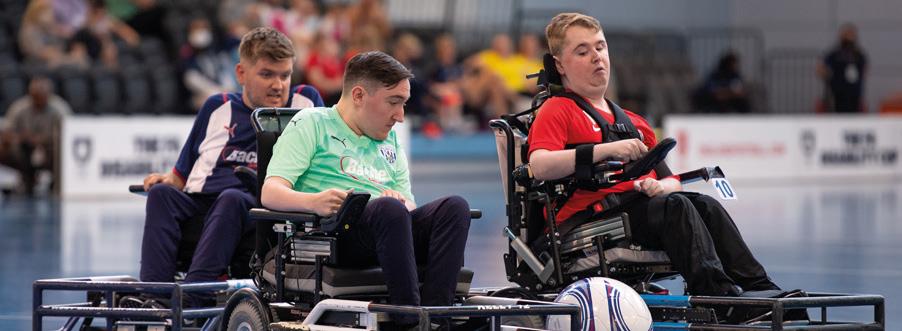

The Inclusive Leadership in Football Award (TILIFA) is delivered in par tnership with football’s equalit y and inclusion organisation, Kick It Out. Designed for existing and aspiring leaders across a range of football contex t s, the course introduces learners to a range of issues related to equalit y, diversit y, and inclusion in football. TILIFA is a self-paced, online learning course and includes an alumni base with learners from the Premier league, the Football Association, Professional Footballers’ Association and more.
 Tony Fretwell
Tony Fretwell

Women’s Super League Academy Manager, The FA


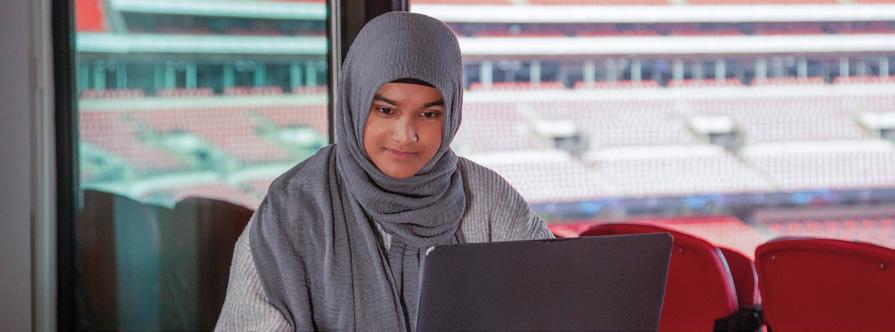


“ Being a par t of t he cour se was a real eye opener for me It has been a par t of my journey to where I am today ”
“The TILIFA Course is a fantastic way of developing your practice by helping you understand the protected characteristics and then bringing them to life using high profile case studies and personal experiences Not of ten does a CPD oppor tunit y have that much potential!”
M A STE R TH E G LO BA L S P O RTS I N DUSTRY
Arran Williams
ED&I Manager, PGMOL, UCFB Graduate
GIS.sport GIS.sport SCAN HE RE FOR MORE INFORMATION ABOUT THE COURSE
THE GAME.


League Managers Association 105 THE MANAGER
A PLATFORM FOR SUCCESS.
A new app that helps young players formulate and share their football CVs has wider benefits for personal and professional wellbeing.

The Manager Journal 106 THE MANAGER

League Managers Association 107
It was the persistence and entrepreneurship of a young footballer, searching for a professional contract, that inspired Routes, an app that acts as an infographic, interactive digital CV for young players.
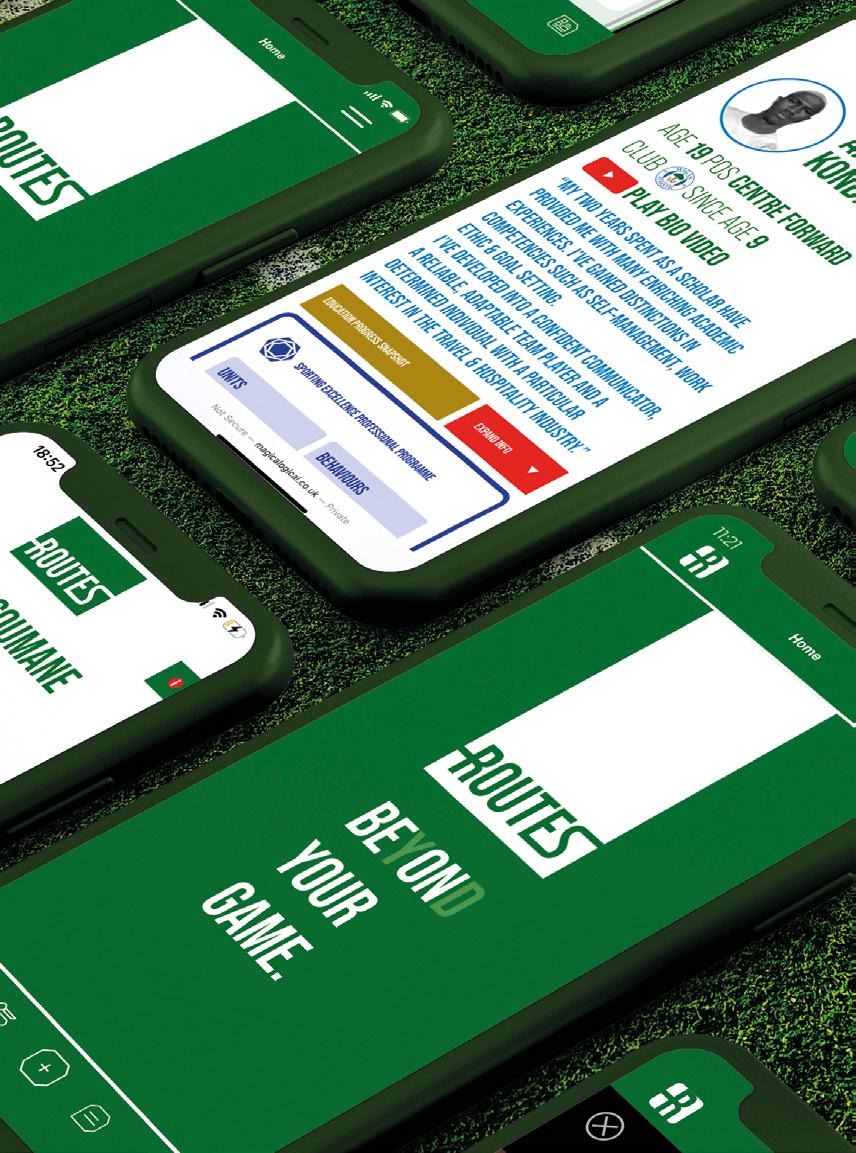
“Back in Guinea, in my childhood, I used to do a lot of buying and selling of different things, so I’ve always been business minded,” says the app’s co-founder, Ansoumane Konde.
Konde moved to Ireland at an early age, where his talent for football saw him take part in an unsuccessful six-month trial at Manchester City, before spells as a semi-professional at Stalybridge Celtic and other non-league teams. During these early years in the game, Konde found it very difficult to present his experience and talent to club decision makers.
“I was getting turned down for trials by clubs, and agents wouldn’t support me, because I didn’t have a proper football CV,” he says. “As I had lived through these struggles, I wanted to create a platform that made it easier for footballers to showcase their talent, something that would harness channels like LinkedIn and Instagram. That was the core idea for Routes.”
Thanks to contacts made during his playing days, Konde was able to pitch his concept to LMA Executive Committee member Sam Allardyce, who saw instantly the potential of both the idea and young Konde. He then introduced him to a trusted associate, Andy Clarke, who he felt could bring the idea to life.
“The academy journey for most players is such a great opportunity in terms of their professional development and personal growth, and it gives them a range of experiences and qualifications,” says Clarke. “This app brings all that together on one platform and allows them to send it to football clubs, universities or other potential employers.”
Allardyce witnessed how convoluted it can be to prepare a football CV through the experiences of a young family member, whose application to an American University took nearly five months and involved contacting previous clubs for supporting information and resources. Such information could be provided via Routes in one click of a button.
“The platform brings together all of the PMA data, including how many coached minutes a
This is about helping young people who have never had a CV before produce a summary of their experiences in a way that is mighty impressive.
The Manager Journal 108 THE MANAGER
player has received or how many small-sided games they have played; all of the information that is important to academies, such as assists and goals; and educational data,” says Clarke. “CVs can be tailored according to the purpose or application, and because they are in digital format with video functionality, they are more engaging.”
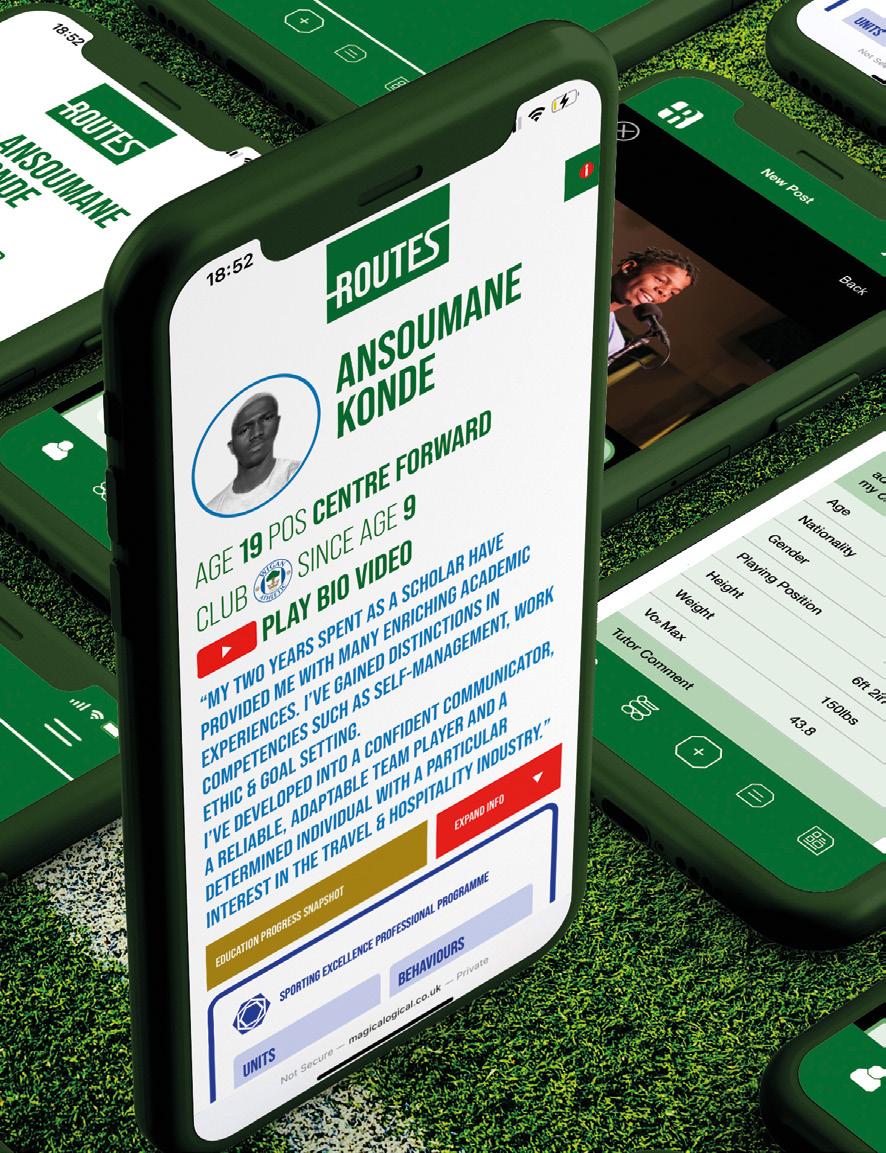
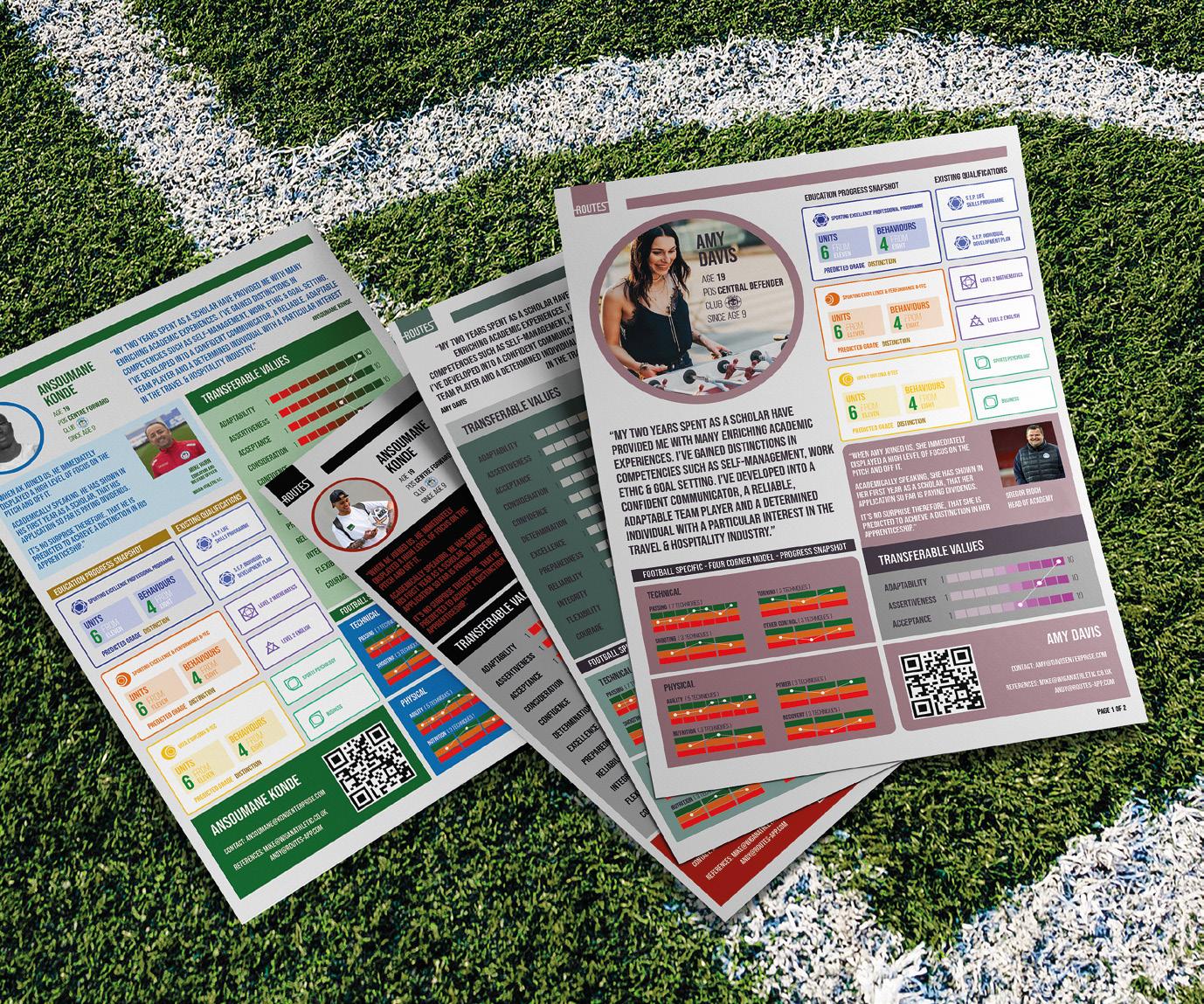
Routes works directly with football clubs in the professional game to provide the access to the services and guidance that young players need. It also provides an aftercare opportunity for clubs who want to keep in touch with players once they have moved on.
However, it is perhaps the mental health side of the app
that Allardyce finds most important. “I hope that Routes will help young people to overcome the disappointment of being released,” he says. “It is vitally important that they have something positive to take with them into their lives, whether that means helping them to get back into football at a different level or forging a career in a completely different industry. If we can prevent just one more tragedy, then the app is worth its weight in gold.”
Clarke adds that, due to the app’s alumni tracking system, the concept of failure should disappear. “Players can see who has come through the system and moved into a variety of other lines of work.
It shows them that their journey can lead to success beyond being a footballer.”
Allardyce is passionate about the positive impact that Routes could have, especially with greater involvement from clubs and game stakeholders. “This is about helping young people who have never had a CV before produce a summary of their experiences in a way that is mighty impressive,” he says.
For Konde, the realisation of his original vision is beyond what he could ever have hoped for, and he’s grateful for the support provided by Allardyce, Clarke and the rest of the team at Routes. “I’m so excited for the future, because this app is very much needed,” he says.
A PLATFORM FOR SUCCESS
INSIDE MATTERS.
The Premier League and its clubs have reinforced their commitment to supporting the mental wellbeing of players and fans.

110 The Manager Journal THE MANAGER
In 2020, the Premier League and other football bodies, including the LMA, signed up to the Mentally Healthy Football Declaration, aimed at creating a mentally healthy culture across the game. By raising awareness and providing training and education, they aim to embed mental health within existing policies and practices, and drive progress in this area.
The Premier League launched the Inside Matters campaign during the COVID-19 pandemic, with a range of content and tips on mental wellbeing from players and experts made available at the online Stay Well Hub. New content is being produced in conjunction with clubs during the campaign period, demonstrating the ongoing commitment to supporting mental wellbeing.
As part of the campaign, the Premier League has collaborated with Shout, a free, confidential 24/7 text support service for anyone in the UK who is struggling to cope. The service was launched in 2019 and has since helped hundreds of thousands of people. Anyone experiencing anxiety can text the word ‘TeamTalk’ to 85258 to be connected with around-the-clock support from trained volunteers, supervised and supported in realtime by an expert clinical team.
Premier League Chief Executive Richard Masters said, “It is so important for people to look
out for others and find time to check in regularly on the mental wellbeing of friends, loved ones and colleagues. Through the Inside Matters campaign, we want people of all ages to feel they can discuss their mental health and understand that support is available.”
The Premier League has also teamed up with Shout to produce the Inside Matters Handbook, which will be made available online ahead of Mental Health Awareness Week to provide people with tips and advice for managing symptoms of anxiety. This includes input from well-known players and managers, as well as advice from Shout clinicians.
Among the players featured is Tottenham Hotspur striker and England captain Harry Kane, who established his own Foundation in October 2022 with a long-term goal to help transform a generation’s thinking about mental health. “Although awareness has improved, we need to change the way our generation thinks about it,” he says. “I believe in normalising conversations to help tackle stigma and promote positive habits.”
Recent advancements in mental wellbeing include updating the Premier League’s Equality, Diversity and Inclusion Standard (PLEDIS), which already covers clubs’ cultures, policies and people, to include mental health and wellbeing requirements.
All 20 Premier League clubs have first-team and academy player care leads. More than 100 mental and emotional wellbeing sessions have been delivered this season as part of players’ life skills and personal development programmes.
The Premier League Charitable Fund, which supports 106 professional Club Community Organisations across the Premier League, EFL and National League, issued new guidance this season on how to focus on positive wellbeing outcomes and support people with mental health concerns as part of its Capability Code of Practice.
There are also 37 Premier League and PFA-funded community projects, delivered around the country by clubs, focusing on mental and physical health and wellbeing that supports local needs.
Meanwhile, through the Premier League Primary Stars schools programme, which is delivered in more than 18,700 primary schools across England and Wales, there are eight free resource packs for teachers to download on wellbeing topics, including self-esteem and emotions.
To find out more about the mental wellbeing work carried out by the Premier League and clubs, visit: www.premierleague.com/ stay-well/mental-health
League Managers Association 111 THE GAME
MOVE, EAT, SLEEP, THINK.
The FA has announced a new programme aimed at inspiring young people and their families to improve their health and wellbeing.
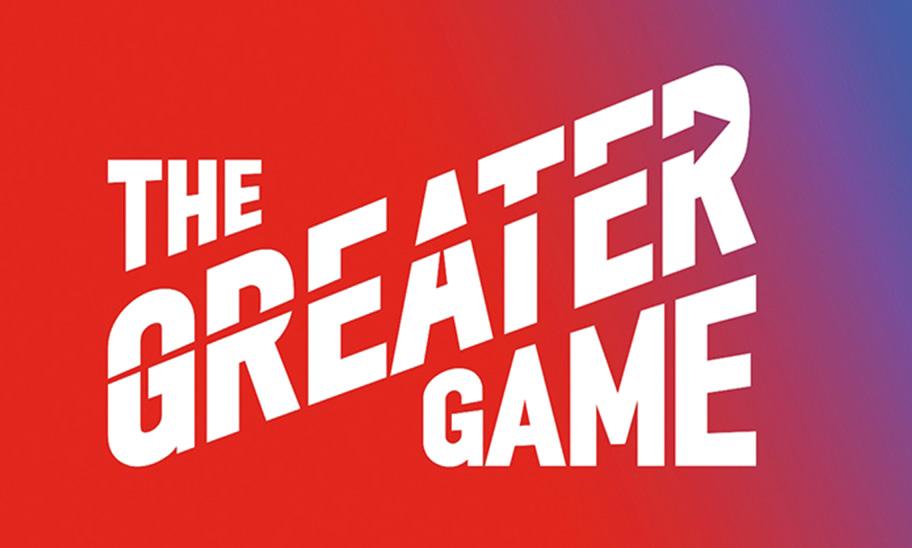
THE MANAGER
The Greater Game programme encourages people to take one action each day, with actions centring around the four pillars of: moving well, eating well, sleeping well, and thinking well.
The programme launches at a time when fewer than half of young people in the UK between 10 and 16 years old regularly exercise for an hour a day.
A fundamental part of the Greater Game is a grassroots initiative, co-created with Nuffield Health and currently in a pilot stage. Delivered in the form of educational workshops, the initiative gives parents and guardians, coaches and young people practical tips and techniques to make healthier choices under the pillars of Move, Eat, Sleep and Think. These can be put into practice both on the pitch and at home.
The pilot is being delivered to selected clubs across five County FAs: Berks and Bucks CFA, Cheshire and Manchester CFA, Leicestershire and Rutland
CFA, Middlesex CFA and Somerset CFA, reaching 130 coaches, parents and guardians, and 2,000 young people. Quantitative and qualitative analysis of the pilot, which includes control groups, will inform the national rollout, planned for 2024.
The grassroots initiative has been underpinned by robust external research by academics from the Institute for Sport and Physical Activity Research at the University of Bedfordshire, and researchers from the Centre for Behaviour Change at University College London. By engaging directly with the target audience, they were able to identify behavioural concerns and recommend intervention strategies, with the aim of driving long-term change.
Mark Bullingham, FA CEO, said: “The Greater Game aims to harness the power of football to improve the health of young people throughout the country. The campaign will evolve over time, with the long-term
ambition of inspiring healthier, happier lives, while tackling the underlying problems that lead to poor physical and mental health. We are working with some great brand partners who understand and care about health and young people, and we are all committed to doing our best to drive positive change.
Steve Gray, CEO, Nuffield Health, added: “We know that children of this generation are disadvantaged when it comes to their health, and we need to take action. The Greater Game is an innovative programme that applies our own expertise, as well as harnessing the power of football, to help families and young people make small changes to improve both physical and mental health. Alongside The FA, we’re committed to driving this initiative over the long-term to help as many young people as we can live healthier lives.”
The FA will look to add new partners and further initiatives to The Greater Game programme as it expands over the coming years.
League Managers Association 113 THE GAME
The Greater Game aims to harness the power of football to improve the health of young people throughout the country.
 Pep Guardiola and his backroom staff erupt in celebration as Manchester City secure a historic treble with UEFA Champions League victory in Istanbul.
Pep Guardiola and his backroom staff erupt in celebration as Manchester City secure a historic treble with UEFA Champions League victory in Istanbul.
JUST A MOMENT
Alamy
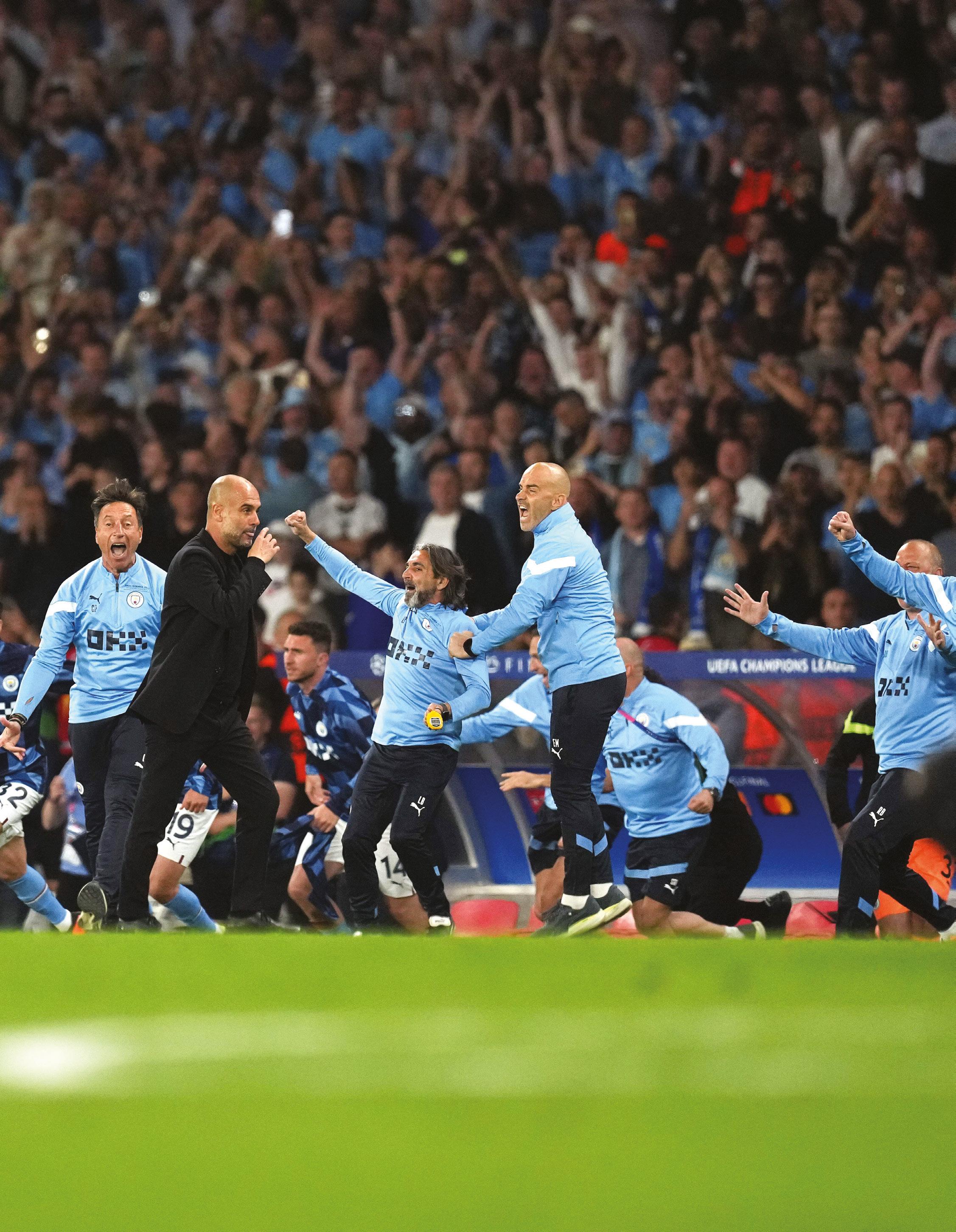
A BIG THANK YOU TO ALL THE LMA PARTNERS.





 LMA Chief Executive
LMA Chief Executive










 Photography: Reuters // Action Images
Photography: Reuters // Action Images

 2022/23 LMA Manager of the Year
Pep Guardiola proudly receives the Sir Alex Ferguson Trophy. Reuters // Action Images
2022/23 LMA Manager of the Year
Pep Guardiola proudly receives the Sir Alex Ferguson Trophy. Reuters // Action Images

























 LMA JOHN DUNCAN AWARD LOU
LMA JOHN DUNCAN AWARD LOU

 Ash Farrington
Ash Farrington




































 Words: Alice Hoey
Words: Alice Hoey


















 Arbuthnot Latham Q&A
MARTIN KEOWN
LMA Chief Executive Richard Bevan Awarded OBE
> RICHARD BEVAN OBE
Arbuthnot Latham Q&A
MARTIN KEOWN
LMA Chief Executive Richard Bevan Awarded OBE
> RICHARD BEVAN OBE












































 Patrick
Patrick












 Tony Fretwell
Tony Fretwell













 Pep Guardiola and his backroom staff erupt in celebration as Manchester City secure a historic treble with UEFA Champions League victory in Istanbul.
Pep Guardiola and his backroom staff erupt in celebration as Manchester City secure a historic treble with UEFA Champions League victory in Istanbul.
